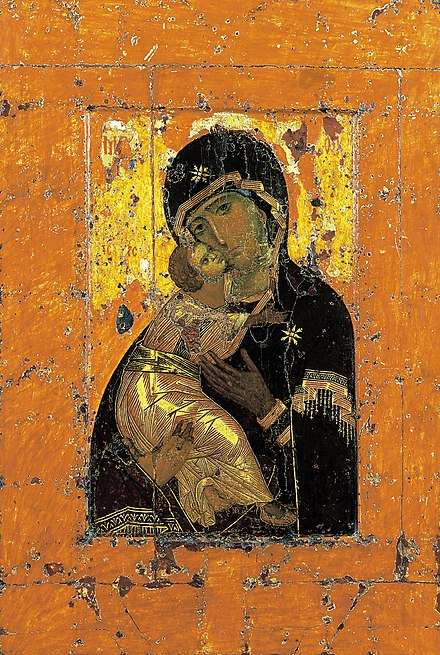

Download Podcast: "Heart of the Theotokos"
During the late fourteenth century, the conqueror called Tamerlane the Great was amassing the largest Muslim empire of its time — one massacre after another aiming always for genocide. At his height, he was the bloody master of a territory including or touching upon the modern-day states of India, Pakistan, Kuwait, Iraq, Iran, Syria, Turkey, Azerbaijan, Armenia, and Georgia. His armies approached Moscow in 1395. Vasily I, Grand Prince of Moscow, led an army to Kolomna, sixty-five miles away, pausing at the Oka River. The clergy brought the renown wonderworking icon, the Theotokos of Vladimir at the head of the assembled host. During the icon's solemn procession from Vladimir, the faithful knelt and prayed, "O Mother of God, save the land of Russia!" And upon the arrival of the icon, Tamerlane's armies retreated.
About a thousand years ago, the discovery of the Organon of Aristotle would fundamentally change everything forever in the West. A powerful technology (Aristotle's students called it an instrument) had appeared, and it was employed everywhere. Scholars in the West avidly applied it to theology, birthing a new philosophical system: Scholasticism. And all theology in the West would be dominated by hyper-rationalism for the next thousand years.
Thus, during the eleventh-century two opposing cultures would be established: the ancient order in the East — the One Holy Catholic and Apostolic Church — and the new order in the West — the Roman Catholic Church. Their mutual antagonisms would be formalized in the Great Schism of 1053. The new Church would have almost nothing in common with its ancient parent thanks to the Organon, which continued its iron grip on the Roman Church for a thousand years.
Meantime, the Kingdom of Heaven still abides on the earth where explicable mysteries abound. The Catholic and Apostolic Church continues serene and undisrupted. Where Holy Orthodoxy is duly established and venerated with sincere hearts — where the Holy Days are kept, where the prayers are ardently prayed, where the seasonal fasts are observed, there the air is thick with the presence of angels and saints and the manifest grace of God. Without question, here is a place of mystery, here is a place that defies rationalism but graciously opens the way to paths that go beyond and above our intellectual grasp. In an era when the Roman Church had become thoroughly inured to rationalism, Blaise Pascal wrote, "The heart has its reasons, which reason knows nothing of" (Pensées, 1670).
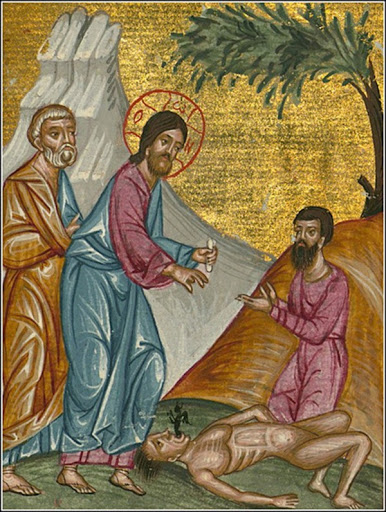
Download Podcast: "Perverse Generation"
The Olympics. We think of them as our grand showcase of shared Western values and unity of purpose. With the recent display at the Paris Olympics mocking the Most Holy Eucharist, we find ourselves back in the Colisseum of ancient Rome, with the dazzling spectacle of public games on one side and the reviling of Christians on the other. As a culture, the West is exultant in its dismissal of God. Who needs God? they ask. Hasn't modern medicine, modern technology, and scientific discoveries rendered God and that whole thoughtworld obsolete?
The comments of Jesus from our Gospel lesson apply aptly to our own time: "Jesus said to them, 'The Son of man is to be delivered into the hands of men, and they will kill Him, ....'"
The horrific scene of God humbling Himself to visit His people who respond by mocking Him, defiling Him, and murdering Him will forever be the most deplorable and heinous disgrace of human history. Yet, the mocking and the defiling continue in our own time unabated. Well, might our God and King reply:
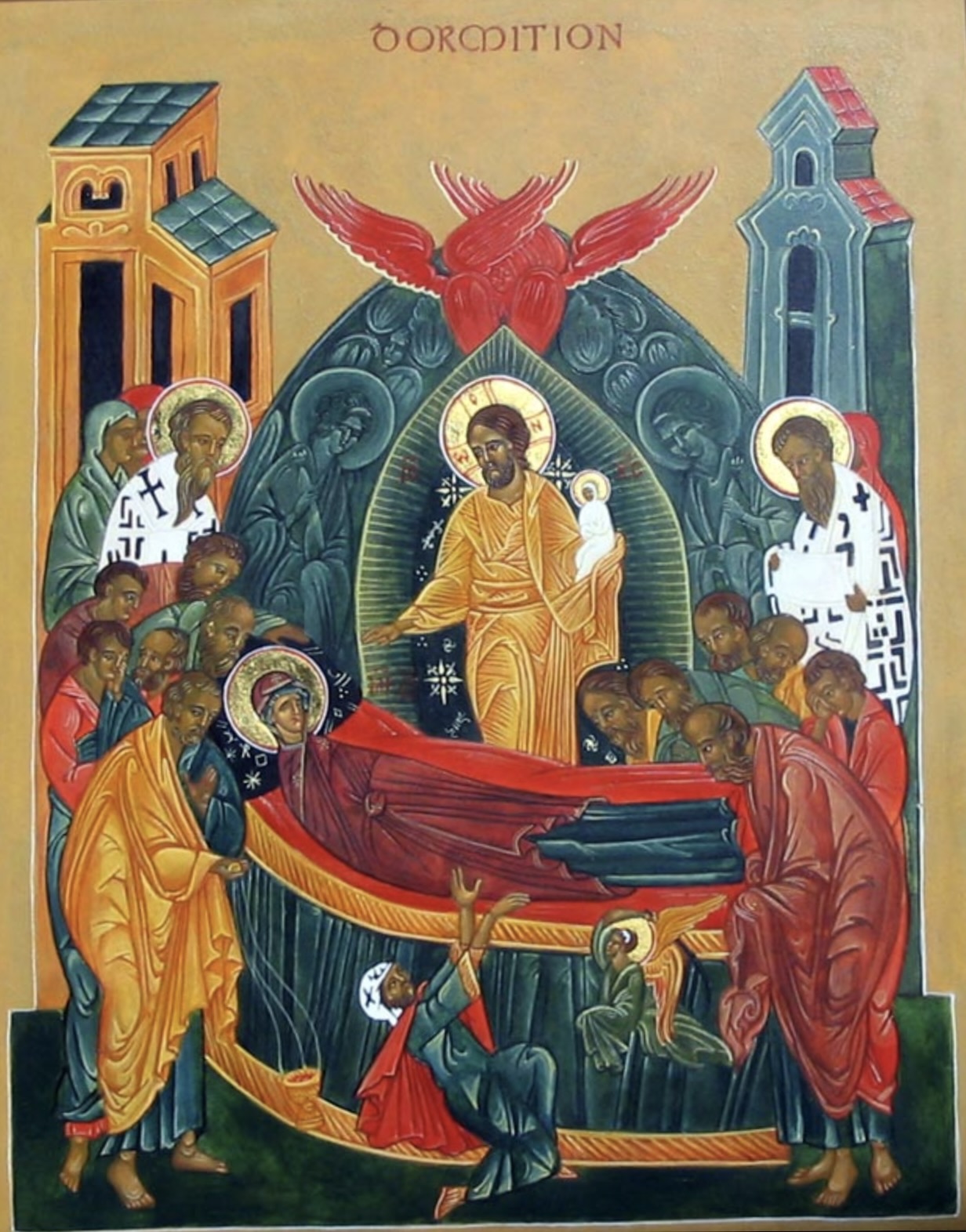
Download Podcast: "Kingdom of Family"
Today we participate in a great feast: the Dormition of the Mother of God. From all over the world disciples rushed to Her bedside (including one whose relics repose in our Altar). We also take our humble places near to her, not distanced in any way. For She is our Mother, and we are her dear children, each one the apple of her eye. This was Her Son's Divine command issued from the Holy Cross: "Behold, your Mother" (Jn 19:27). Such is God's manifest will.
Does this seem odd? Then consider another among Her Divine titles: Mother of God. We reel in our vain attempt to comprehend this — a Woman Who gave birth to the One Who gave birth to the Universe. With this reshaped mind, perhaps we can now accommodate the well-founded precept that we are daugthers and sons, siblings to Jesus, and children of God, to Whom we might cry, "Abba, Father" (Rom 8:15). This is the great revelation disclosed by the perfect prayer: "My Father, Which art in Heaven." Yes, the Greek reads, "My," not "Our," for personal, individual intimacy between child and Father is the great lesson Jesus teaches. The Kingdom of Heaven is a Kingdom of Family. And we are all to be brothers and sisters.
This is no metaphor, nor is it a flight of spiritual fancy. It is a literal truth upon which the Scriptures insist over and over and over again. A clear example appears in St. John's Prologue:
|
.... as many as received Him, to them He gave the right to become children of God,
to those who believe in His name: who were born, not of blood, nor of the will of the flesh, nor of the will of man, but of God. (Jn 1:12-13) |
St. John insists: "not born of blood"; "not born by carnal will"; "not born by will of the human soul" .... but born of God. This is also Jesus' emphatic declaration:
|
But He answered them, saying, "Who is My mother, or My brothers?" And He looked around in a
circle at those who sat about Him, and said, "Here are My mother and My brothers! For whoever does the will of God is My brother and My sister and mother." (Mk 3:32-35) |
Today, we gather to celebrate the Holy Mother, the Theotokos, the One Whose protection cannot fail. She is our Mother, and no can part us from Her invincible power and Her indomitable sanctuary. Glory to God!
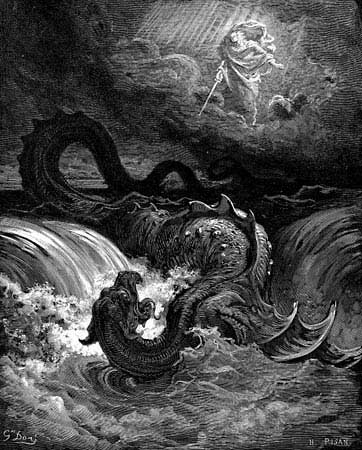
Download Podcast: "Primordial Chaos"
We celebrated the Feast of the Transfiguration on Monday and beheld Jesus unveiling His Divine Identity to an inner circle. Last Sunday, He plainly revealed His Identity to a multitude feeding them with a kind of manna, reprising the same scene from ancient memory in the Sinai wilderness. The message is clear: He is our God emanating from Whom is a blinding radiance. He is our Providence, supplying our every need. He is our Creator Who has revealed His Power by wresting order out of chaos, and a harmonious, fertile Creation out of the increate void.
Choosing bread and fish as His manna, Jesus reminds us that we have already been provided for. For the fields of the world abound with countless grains, and the seas of the world abound with fish. What remains is to wrest order out of a mild form of chaos. Jesus emphasizes the Providential aspect of grain as He and His Disciple simply walk through the grain fields, pluck, and eat (Mt 12:1-2). On another occasion Jesus has the fish practically jump into the boat (Lu 5:6). But, in general, we must harvest the grain, mill it, work it into dough, and bake it. We must catch and sort and prepare the fish. As I say, we must wrest order out of mild chaos.
Wresting order out of profound chaos is the signature act of God "in the beginning" and then going forward throughout all of human history. When Jesus walks on the sea or when He commands the winds and the waves, He echoes the primordial acts of YHWH Who sets before us an earth which continues to be, uniquely, the wonder of the universe.
Let us explore Holy Scripture today this morning as we reverence the "deep Providence" of our God. He is our Creator, and we continue to stand in awe, with joy, or His awesome powers.

Download Podcast: "Transfiguration"
Peter falling down nearly blind said, "Lord, it is well that we are here; if You wish, I will make three booths here, one for You and one for Moses and one for Eli'jah" (Mt 17:5). .... remembering the booths he saw carved into the hillside at the Grotto of Pan, where the statues of the pagan deities stood. But his foolishness is quickly interrupted by the thunderous tones of God the Father:
| "This is My beloved Son, in Whom I am well pleased. Hear Him!" (Mt 17:5) |
Do you see? While Peter is in mid-sentence, a cloud overshadows them and a commanding Voice is heard: "This is My Son. Hear Him!" Peter is silenced. This is no pagan god, no vain cultural belief, nor the invention of a benighted imagination. "Hear Him!" the Father thunders, for He has been sent to be our only Guide and Exemplar.
Yes, the Disciples were taken to the brink of human capacity and beyond. They were shown the shallows of their own minds and the limits of human knowledge. In its place is set One Whose "face shone like the sun, and His clothes became as white as the light" (Mt 17:2).
Here finally is our Identity. Here is who we are, our destination, and our birthright. The human portrait is superabundantly renewed (Athanasius). The Great Emperor's face has been minted with the purest white silver (Origen).
The Lord's face is revealed, and with it our own. Finally, our restless seeking after identity — in surgeons' operating rooms, on psychiatrists' couches, our laying claims to silly identities on Facebook and Instagram — it all comes to an end. And we have peace unto our very souls. Finally, peace. Amen.
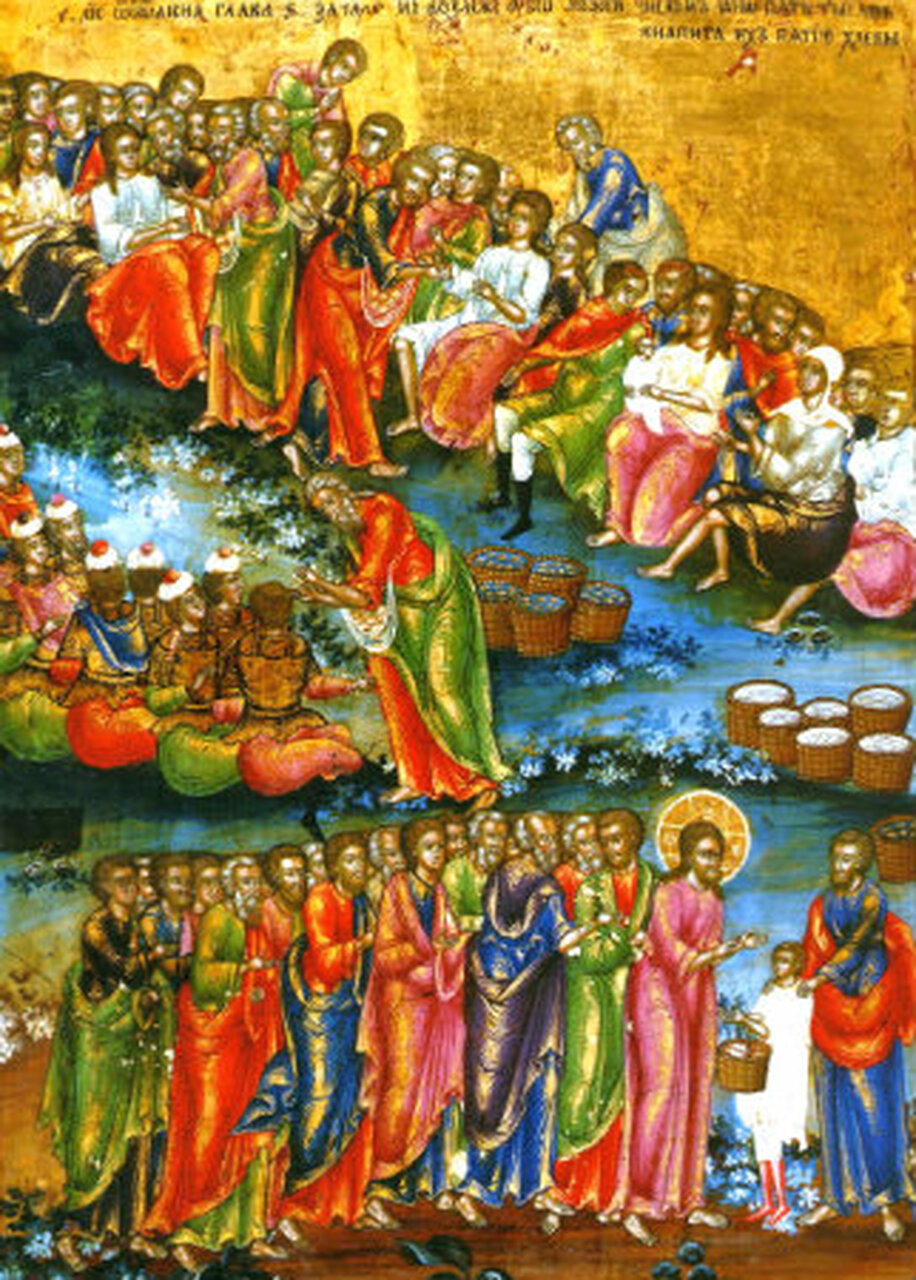
Download Podcast: "Superabundant Blessing"
I ask, am I the center of the universe? The answer is, Yes ..... and so is everyone else. Like the feeding of the multitude, each person ate to his fill and in a way that did not subtract from the favor bestowed on anyone else.
We all are provided with a life lesson teaching this principle of God's solicitous love. It is called family. Consider the large family. Sr. Mary Anne had six siblings. Sr. Mary Martha had twelve. Now, each one of these boys and girls knew that they were the apple of mother and father's eye. They knew that theirs was the special place under their wing. It did not matter that mother and father loved all of their children. In fact, this made their love even better, more decent, somehow more right.
And this is our God: decent, right, good, and Whose power far exceeds all the armies of the earth .... but is gentle and caring with His eye even on the sparrow.
Yes, the world is filled with little dramas, as many dramas as there are people. And each person is the protagonist of his or her own drama. Yet, they do not bruise each other. They do not subtract from each other. Each is spell-binding to the God Who watches. And all are held safely in the palm of His hand.
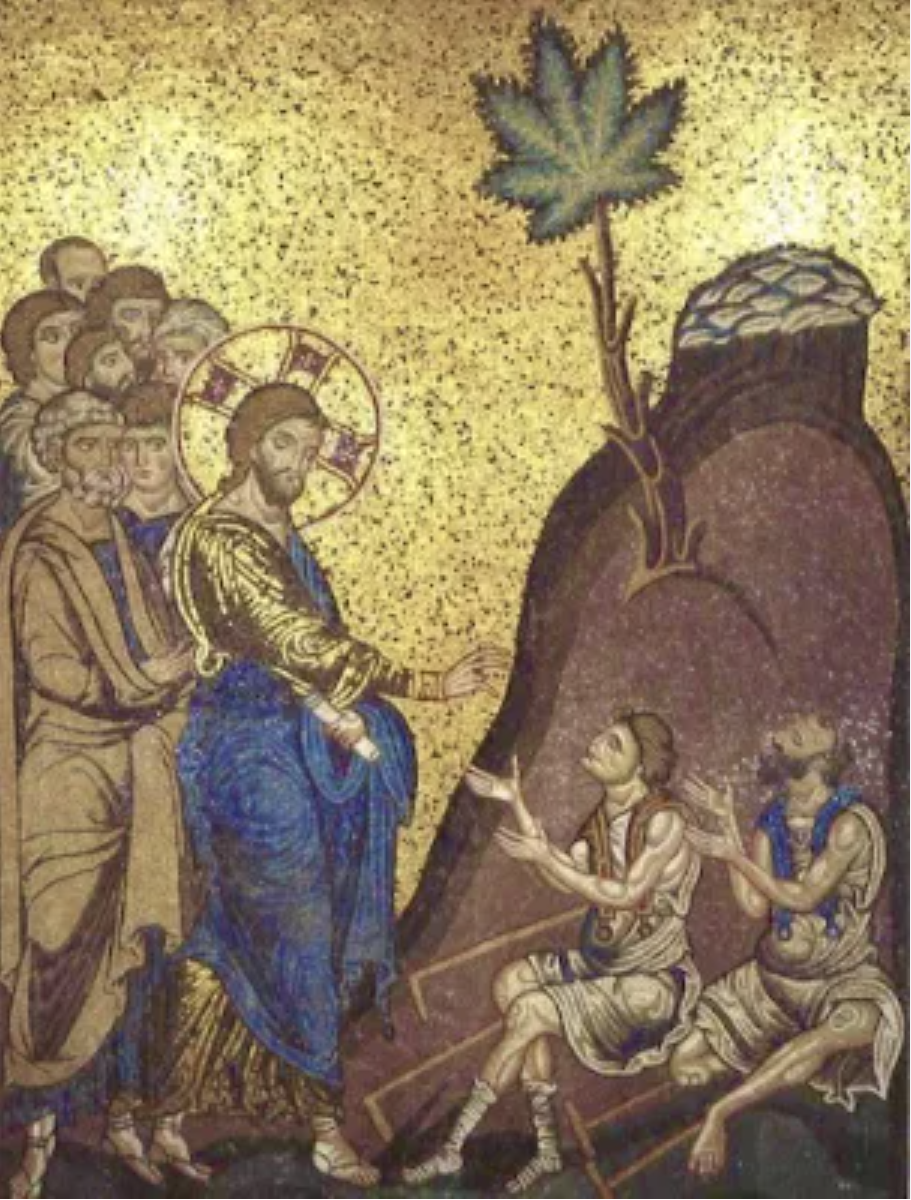
Download Podcast: "Without God"
The Lord of Life roams among the lost — gathering them, teaching them, healing them. For the world into which Jesus is born is a dark place, a place where people have lost their connection to God.
Exactly what does life look like? The locus for this is Gad, which is Gad's function in the Gospels. It is a place of shadows, life among the tombs, where is heard the furious madness of howling demon life. It is life in chains, for the freedom of choice, of self-control, has been lost. The passions run wild as stampeding horses (Plato would say) or as the thundering hoofs of pigs leaping into the unruly sea, the ancient symbol of chaos. It is obvious that such pandemonium cannot also be a place of light and Divine peace. St. John leaves no doubt on this point:
|
Do not love the world or the things in the world. If anyone loves the world,
the love of the Father is not in him. (1 Jn 2:15) |
In fact, the case is more extreme than that. For the Father will not accept union with worldlings. We cannot become part of that Kingdom until we become Heavenly. As St. Paul would say our nous must be transformed. For the nous is the organ of relationship. It is the place where we meet with the God Who loves us. And it is that place where we love one another in His wonderful Kingdom, lifting us far above the world .... but not till we are transformed. As Jesus would say: "Metanoeite!"
Look around you, my brothers and sisters. Darkness is again falling. The "God" that is taught in most American churches is not God. The values and (dare I use the word?) morals we teach are not moral. Public attacks on Christianity have mainstreamed. And soon Christians will again be thrown to the lions (that is, arrested) as the Bible will be condemned as a form of "hate speech."
And seeing our collective blindness, Jesus-Who-saves will reach out in His compassion. He sees that our shepherds are few. We must call out to Him: "Son of David, have mercy upon us!" And He will ask us, "Do you believe?" And our reply must be, "Yes, Lord."
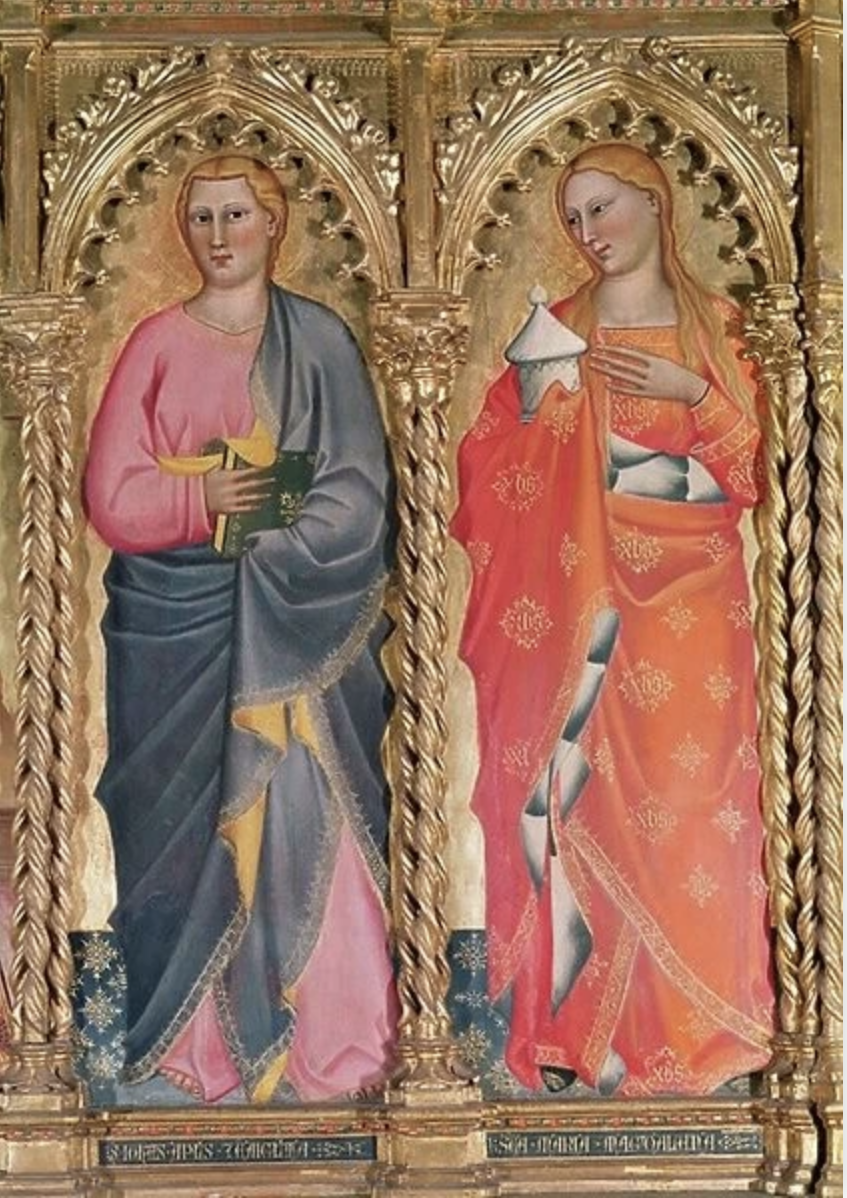
Download Podcast: "Towering Faith"
The Gospels together with Sacred Tradition combine to present us with two perfections of discipleship, one male, the other female: St. John the Apostle and St. Mary Magdalene, Equal-to-the-Apostles. They each struggled with imperfection: he beset by overweening ambition (Mk 10:35-45) and she thoroughly possessed by an undisclosed weakness. They each encounter the Lord of Life, Who heals them. They respond with an overwhelming gratitude, devoting themselves to Him and loving Him with a love that is unprecedented in Holy Scripture. At His Crucifixion, they stand together at the foot of the Cross, alone among the disciples, not counting the cost, accompanying the Mother of God and Her kinswoman. Thereafter, Mary Magdalene follows the Beloved Disciple and the Most Holy Theotokos to Ephesus, where Mary, Mother of God, will fall asleep (we know not when) and where Mary, Equal-to-the-Apostles, will repose.
Two perfections, one man and one woman, presented to us as models. For emulation goes to the heart of Christian life. We are to follow (Mt 4:9, Mk 1:7, Lu 9:23, Jn 1:43, Jn 12:26). We are to deny ourselves (Mt 16:24, Mk 8:34, Lu 9:23). We are to be servants (Mt 20:26, Mk 9:35, Lu 16:38). We are to mold our lives through unending spiritual formation. And in so doing, we eventually fulfill the Image set upon us at birth, by the grace of God. We are to follow Him, and we are to follow those whom He has set before us. They are known to us as a pattern of faith by their right belief, by their love, and by their holiness.
The Holy Gospel According to St. John is the theological norm for the Orthodox confession of faith, according to St. Theophan the Recluse. St. John is the Theologian, who has definitively set down Christian belief in his Gospel and sketched out Christian life in his Letters. Both he and his writings are to be followed.
I submit that St. Mary Magdalene is his counterpart, the example-without-equal for women and John's constant companion. Prof. Katherine Jansen cites St. Jerome, a Father of the Early Church, as attesting marriage between the two (The Making of the Magdalene (Princeton University Press, 2001)). Jerome writes that Mary Magdalene towered above ordinary people (noting that magdala is the Aramaic word for "tower" or "fortress") much as St. John soared like an eagle above the other Evangelists.
![]()
Download Podcast: "Faithfulness"
As the Russian Orthodox Church claims the mantle of Third Rome, what is it that she proposes to offer? As a former Anglican and former Roman Catholic who has spent his entire adult lifetime seeking the Church of God and as a diligent student who has devoted twenty-three years of university and seminary study to the same cause, I venture an answer. The Russian Orthodox Church, and her missionary arm, the Russian Orthodox Church Outside Russia, propose to offer faithfulness. I have staked my life, all of my future, a good deal of my past, all my worldly goods, and all the exertions of my mind and spirit to the following proposition: she will be the last Church to bow before the gods of our Western Culture. I said that wrong. She will never bow. And she will be there in the fullness of her spiritual strength, bringing to bear the deepest spiritual tradition the world has seen, when faithful humanity makes its last stand.
When he made his celebrated film, Ivan the Terrible in 1944, Sergei Eisenstein has its protagonist say at his coronation, "Two Romes have fallen. Moscow is the Third. And there will be no fourth!" Eisenstein had no way to know that eighty years later, the world would reach the brink of apocalypse. Nuclear war is contemplated as the U.S. presses into Russia's traditional sphere. Scientists the world over agree that our planet has been pushed in the direction of catastrophe, perhaps irrevocably. Americans at home behold a level of moral degradation that would have been unthinkable seventy years ago. If the Lord should return tomorrow would anyone be surprised?
Meantime, the children of Russian Orthodox families have poured out their life's blood in the defense of the twentieth century's holy causes. We have considered her martyrdom which towers far above the Great Age of Christian martyrs. But I wonder how often we in America venerate her war dead, men who died for us. The United States lost 407,300 fighting men in World War II. The Soviet Union lost 11,400,000. They lost 28 times more men than the United States: a whole generation, the flower of their manhood, touching every family. This is sacred blood poured out of her heart in the battle against evil. In the battle against evil the Russian Church accepted martyrdom willingly on a level that the world has never seen. Today, she continues to fight evil. And she knows atheism when she sees it .... and does not flinch.
![]()
Download Podcast: "Intimacy"
Today, we celebrate the appearance in 1579 of the Kazan Icon of the Most Holy Mother of God. The Kazan icon is held to be without equal in the Russian Orthodox Church depicting Ever-Virgin Mary as the Holy Protectress of Russia and all Holy Rus'. Military commanders have attested the icon's wonder-working powers in the defense of Russia — repelling invasions by the Poles (1612), by the Swedes (1709), and by the French under Napoleon (1812). Alternatively, the icon's loss in 1904 is blamed for Russia's fate at the hands of Japanese in 1905.
By tradition, the icon was received into Russia from Constantinople in the thirteenth century and was assumed lost when Muslims established the Turkic Khanate of Kazan around 1438. According to the chronicle of Moscow Patriarch Metropolitan Hermogenes (1595), the icon was discovered through Divine intervention. The Holy Virgin appeared to a ten-year-old girl, Matrona, revealing the place where the icon lay beneath rubble in the city of Kazan. Matrona and her mother duly reported the Divine visitation to their archbishop but were dismissed as superstitious peasants. On July 8, 1579 after two more interventions by the Virgin, the girl and her mother set off on their own to recover this spiritual treasure of Russia. They found it beneath the debris of a destroyed house where it had lain hidden from the Muslims. Miraculously, it was unharmed.
It was moved to the Kazan Convent of the Theotokos where it was safely guarded until the twentieth-century. In 1904 thieves stole it for its gold case and jewels. Eventually, the Russian police tracked down the thieves and recovered the case. They claimed to have destroyed the icon, but one man confessed that it survived in a monastery in Siberia. The Russian police chose not to believe him which closed the investigation.
The icon's subsequent history is controverted. And several icons Our Lady of Kazan are claims to be the original acquired in Constantinople.
May I boldly offer that the Mother of God, Whose rule over all created things is sure, holds a special province and sway over icons depicting Herself. Let us say, then, that authenticity is Hers to decide. Let us say She will have mercy on whom She will have mercy. For all icons of the Mother of God, from the first painted by St. Luke, to ones found in prayer corners throughout Holy Orthodoxy are intrinsically holy commanding our reverent attention. Wherever She is sincerely sought in prayer, wherever we are in sore need crying out to the Holy Mother, She truly and really is present to us.
And where we beg refuge under Her protecting veil, there we will find safety and rest. She is the Mother of our Creator, and we are Her children. Here is an intimacy I pray which all can accept, a saying which is no way hard. Here is the Holy intimacy of a Spotless Mother, an All-wise Counselor, a Tender and Forgiving Heart, and a Love that can never fail.
Call on to Her today. Take solace under Her wing. She never yet spurned a true heart or yet a sincere and ardent prayer. She is our Mother, and we are Her children, for whom She sheds real tears. Go to Her. Honor Her. Stay near to Her. You will never regret it.
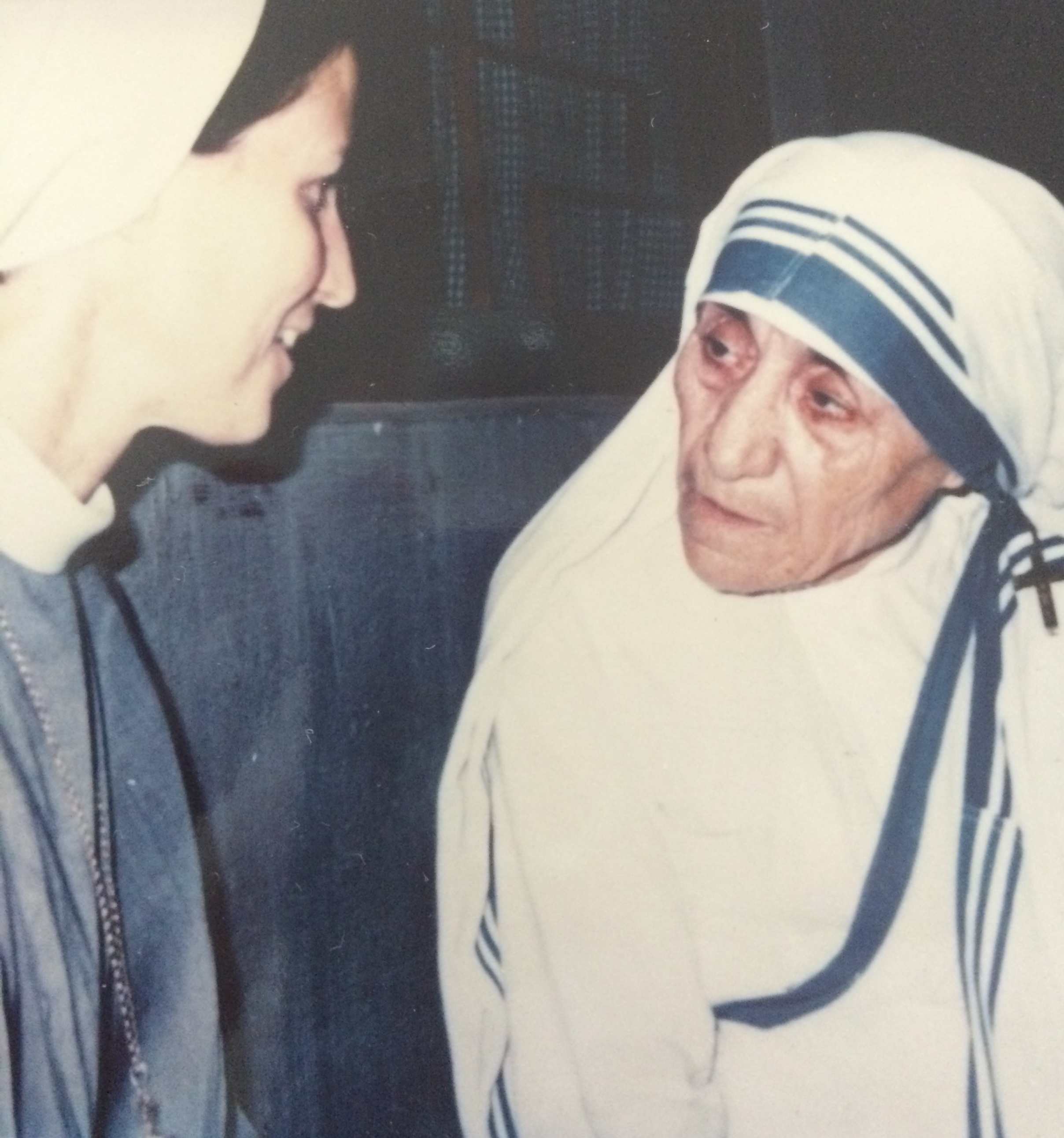
Download Podcast: "Silverless"
Today we honor the "silverless," the unmercenaries Cosmas and Damian, who freely gave of themselves as medical healers and worked wonders. But today I am going to reflect on an unmercenary whom I have known, Nun Mary Anne of the Western American Diocese of the Russian Church Abroad. I pray she will forgive me for my lack of discretion.
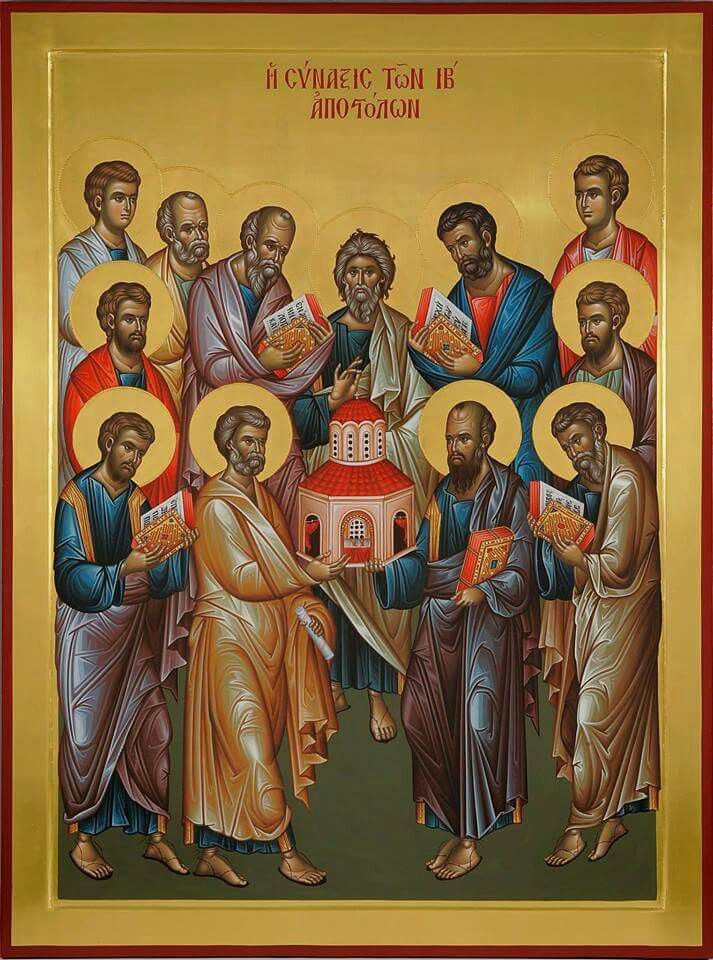
They were all Northerners as far as we can tell. They were all men from the Historical Northern Kingdom of Israel. Was that a distinction implying a difference? Ask any Jerusalemite. Northerners were detested, singled out for derision. For they held that the Northern Kingdom represented the true religion and that their Temple of Mt. Gerizim was the true temple, the site of ancient Mt. Moriah, where Abraham did not sacrifice his son Isaac.
Roughly a century earlier, during the height and fever pitch of the Judah-ism mania — the attempt of the Macabbees to establish their hybrid Babylonian cult as the true religion — ancient Gerizim seemed to mock them covered with age and authenticity. But the High Priest from Jerusalem, together with confederates, journeyed by night to Shechem and destroyed that ancient temple. Oh yes, geography and where you were from made a very great difference in the Levant of the first century A.D.
Jesus had handpicked these men from Northern families — all except Judas (a variant spelling of Judah). Happenings in Jerusalem were alien to them .... and best avoided except the mandatory three pilgrimage feasts, Pesach, Shavuot, and Sukkot.
They were steeped in the lore of the true religion, the ways of the Patriarchs. And they were electrified to have met a mysterious stranger from the storied past: "You are the Son of God. You are King of Israel" (Jn 1:48), one said in agreement with the others. With what anticipation did they hear the Master's words that Heaven would be opened and that the angels of God would be their companions! These were Northern words, words not spoken in Jerusalem.
They would indeed become the familiars of angels and men appointed to announce the good news on the mountaintops: the Kingdom of Heaven is at hand. Nothing would ever again be the same. For God was (and is) with us. Who then can be against us?
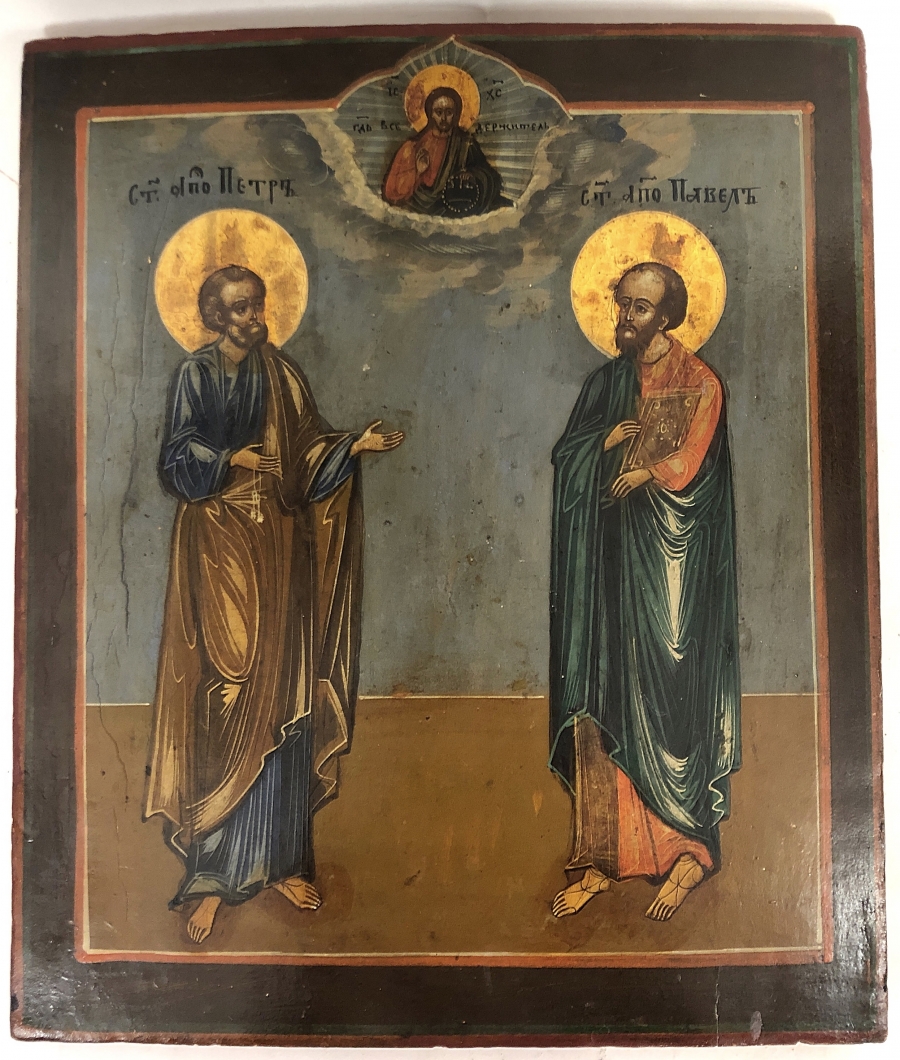
Download Podcast: "Cleaving Souls"
Peter and Paul. Oil and water. The keys that bind versus the sword of liberation. The importance of tradition versus a Gospel that calls us above and beyond the past. The old man set in his ways versus the mercurial, young man who is all things to all people. The cautious man who loses his nerve versus the bold, go-for-broke gambler. The bartering fisherman who demands his pay versus the theology student who follows God without counting the cost. The immovable Chair of St. Peter attempting to claim the world for itself versus the restless Apostle on horseback or in boats or trekking across continents seeking to bring Christ to the world. The man who sought safety versus the explorer always peeling off surfaces, encountering, discovering, finding in the endless process of conversion to Christ. Our earliest Scripture was written by St. Paul. If you account St. Mark to be St. Peter's amanuensis, then together Peter and Paul laid the foundation for much of what we understand to be Christianity .... at least textually speaking. Let us set aside whatever we are doing and honor these two great Apostles. For without them we would be lost.
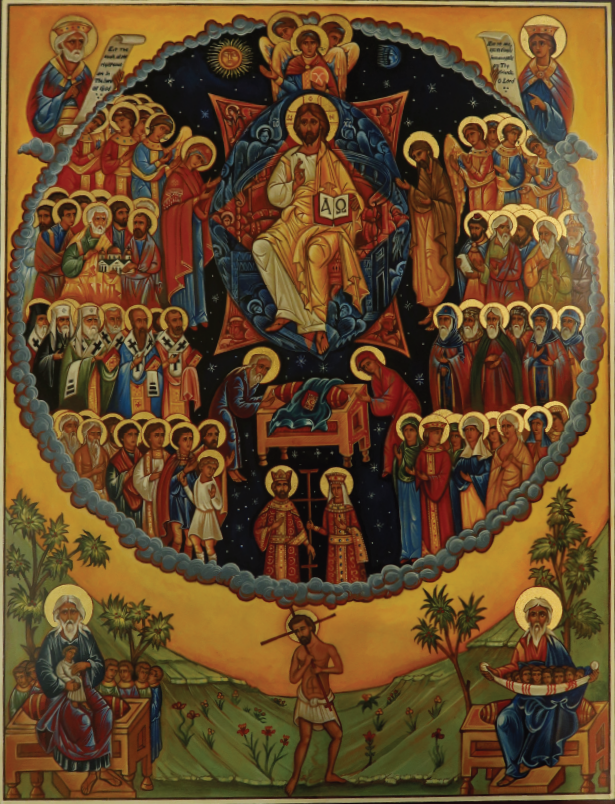
Download Podcast: "Sacred Ground"
The world grieved when the Taliban destroyed towering statues of the Buddha from the sixth and seventh century in Afghanistan — World Heritage sites "of importance to humanity as a whole," declared the United Nations. These Muslims sought to erase history in order to advance their narrow agenda.
Now bloody bandits turn their evil intent to another World Heritage site in Ukraine, the Kievan Caves Lavra — the oldest and holiest site in Russian Orthodoxy. They too wish to alter the historical record. Volodymyr Zelinsky, labeled a "mobster" and "the ultimate criminal" by Newsweek columnist Candace Owens, has set his sites on rewriting the history of Ukraine, setting up a counterfeit church (dubbed "the CIA church") founded five years ago, to supplant the Ukrainian Orthodox Church founded in 988. We watch in horror as bishops, priests, and monks of the Ukrainian Orthodox Church are beaten and arrested and the holy things desecrated.
The world has seen this thuggery before. In a two-year period alone (1937-1938), 168,300 Russian Orthodox clergy were arrested and over 100,000 shot according to records of the Moscow Patriarchate. Many more were executed or sent to the cruel gulags during the long, bloody decades of Soviet oppression. By contrast during the Great Persecution of the third and fourth centuries, between 3,000-3,500 Christian martyrs died. These are not regrettable tales of a bygone period but occurring in these days and weeks of 2024.
Today, we will hear words written by St. John of Shanghai and San Francisco, whose life coincided with these events. As Archbishop he oversaw a large diaspora of Russians praying that the terror might abate and that they might go home. In this homily (redacted for the sake of time), he offers a wide historical view of the Russian saints.
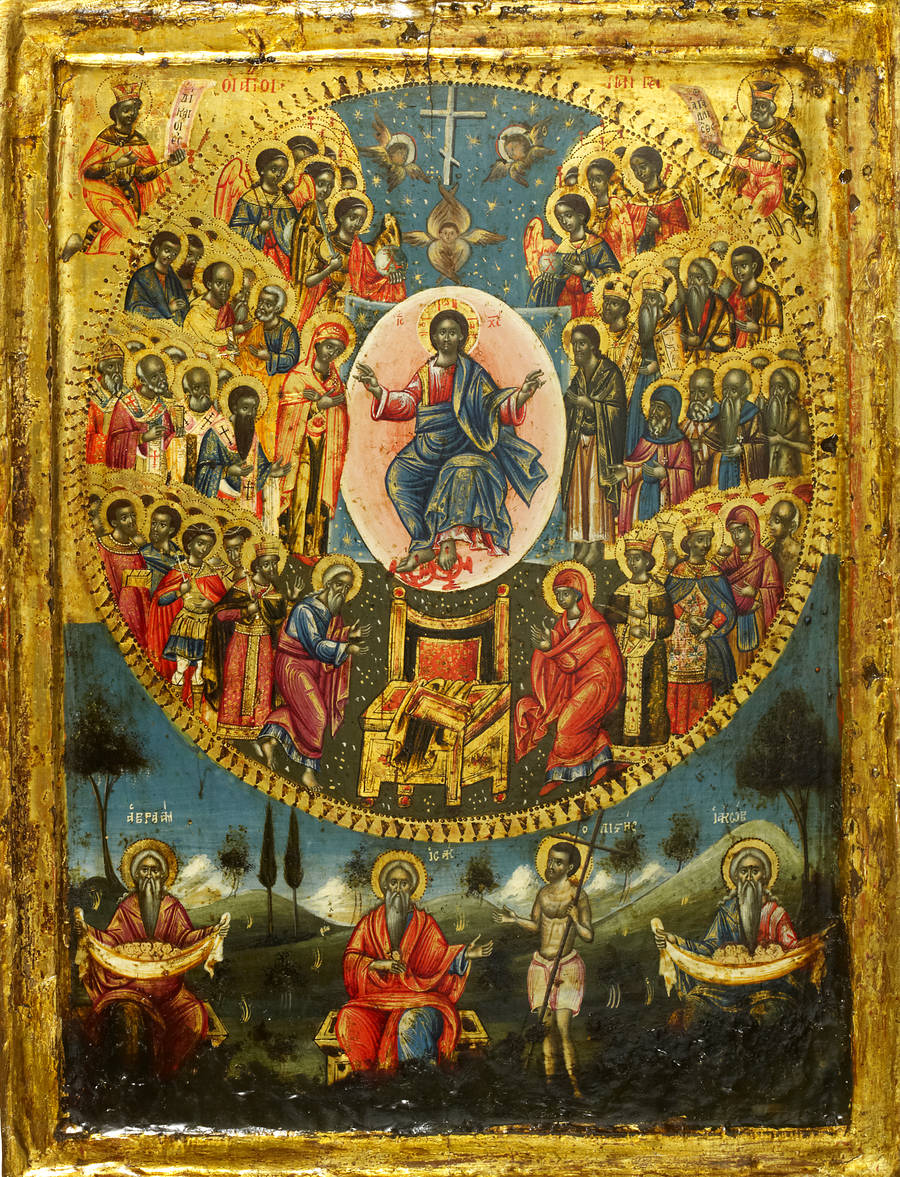
Download Podcast: "Be Friends of God"
In contrast to both Protestant and Roman Catholic worship, there are no pews in Eastern Orthodox cathedrals, no lines of division between ourselves and the saints we see on iconastases, on pillars, and around us on analogia. In the place where we gather to greet the Lord Jesus, Who is very Present to us, we are enjoined to look upon the person standing next to us as being one in a great cloud of witnesses: a living, breathing saint. Each is precious in God's eyes, as he or she continues to climb the Ladder of their sanctification, continuing to do little things and great to attain spiritual perfection by the grace of God.
You see? The drama of our salvation is not out there, it is in here: in the human heart, which committed itself to following the Master, emulating Him in all ways (such that a human can). I have seen the pronouncement that "The Church is not a gathering place for saints but a hospital for sinners." I suppose this meme is a morphing of St. John Chrysostom's teaching that the Church is a hospital for sinners and not a courtroom for condemnation. Let us say that the Church is a gathering of saints, who are presently on different stages in their progress towards holiness. Those further behind are not to be condemned but encouraged and helped along.
If I were asked to choose one thing that distinguishes Holy Orthodoxy from the spiritual traditions which followed it, I would say it is theosis, the process of deification, which is the unfolding of the telós, or blueprint, set within us at birth. We were born with a birthright to Heaven. From the beginning we are called "gods" (Ps 81/82:6).
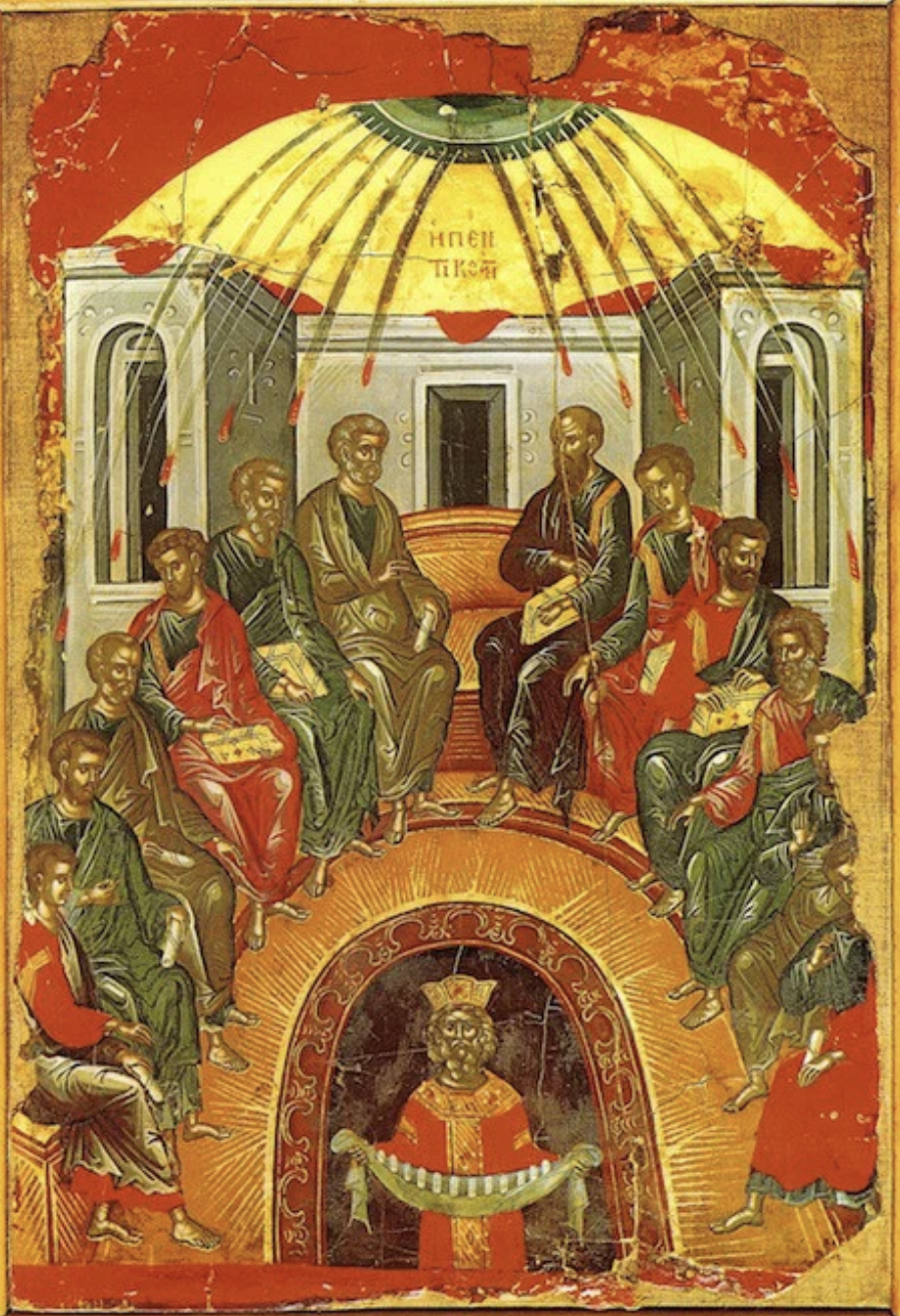
Download Podcast: "Abundance"
The Hebrew feasts of Pesach and Pentecost express the rejection of the world and its ways, the embracing of God's mind and spirit, and a new world being given with God's Book of Life.
The gift of God's Son brings this lively intimacy to an unparalleled climax: God is with us. He is literally our Teacher, our Guide, and the Beloved. The kernel of His teachings, revealed at the point of His departure, is that we be One with God as He and the Father are One. To that end, He says, the Holy Spirit will be given — the Holy Spirit, Who sanctifies us, preparing us for this Divine Unity, Who is Himself the Figure of Divine Unity, (as we read in our Epistle lesson today) erasing division and internecine hatred.
The Holy Spirit's constant message, echoing through the teachings of the Son, signified at the Harrowing of Hell, taught by the Risen Christ at the point of His Ascension, and shadowed forth by the Hebrew Feasts of Pesach and Pentecost is this: reject the world; be purged in wilderness; be reborn into a new life; be set apart for God; and be united in this love:
"A new commandment I give to you, that you
love one another;
as I have loved you ...." (Jn 13:34)
The hour now is. Receive the Holy Spirit. Love one another. Keep the holy feasts, and worship the God and Father of all and the Son in the Unity of the Holy Spirit, Who now breaks through our earthly veil with holy fire.
![]()
Download Podcast: "Divine Illumination"
What is Orthodoxy? Truly, that was a question to be asked around the time Christianity had been decriminalized in 313. If the Archbishop of Constantinople, the Bishop of Antioch, the Bishop of Caesarea Palestina, the Bishop of Milan, the Emperor, and the majority of believing Christians held to a doctrine, wouldn't that doctrine be ipso facto Orthodox? We today who protest how humble we are would not dare oppose the majority belief. "How arrogant!" (we would say). " How prideful! And we would be judging others!" .... the high crime of our times.
Arianism seventeen hundred years later has been neatly packaged for us. We hear that it is a heresy before the doctrine is even named. But it wasn't so clearly packaged for people during the first decades of the fourth century. And it would have been far easier to agree with it than to disagree with it. But if you did disagree with the majority opinion, what price would you be willing to pay for the sake of your convictions? Would you be willing to be deprived of your livelihood? Of all your friends? Of your family? These are not academic questions. For we too are living through a time when certain Orthodox truths are not clear and when Orthodox bishops and archbishops disagree.
Certainly, we are living through a time when heretical opinions are espoused by the majority of people. In the end, the truth is the truth. And God is God. His views do not vary nor change over time. And we are answerable to Him, all of us .... and tested everyday.
![]()
Download Podcast: "Heavenly"
From the beginning, from His Birth, the Heavenly had descended upon a people who had been instructed to ignore the Heavenly. A blazing sign from the Heavens accompanied by a superabundance of angels had descended among the ignorant — beneath the discourse and teachings of the Temple. "For the wisdom of this world is foolishness with God" (1 Cor 3:19).
And in the end, at His Ascension, He showed us the way to God, to Heaven. For awaiting us are many mansions and a place which He has prepared (Jn 14:2).
More than that, He revealed that the Kingdom of Heaven is always already around us. It is not of this world. The toxic world and its poisonous vapors are palpable signs of the Dark Kingdom, with our passions pointing the way, to which our souls must consent: how great is that darkness! (Mt 6:23).
He has shown us the Way to His marvelous light. He has given us sure guides. And as He took His leave of us, He modeled the path He described from the beginning (Jn 1:51), the path of angels ascending and descending, the path He Himself trod at the last in our sight, the path offered to each one of us.
Let us hasten to that path. It is everywhere around us. But it is a quiet place. It cannot be heard midst the buzz of television. It cannot be seen in the glare of smartphone and computer screens. It disappears suddenly in the chaos of our passions. Yet, it is always already present all around us, and its foundation stones are the province of the Church.
Are we not the scattered tribes midst the gathering darkness, which Jesus saw? Are we not the reason for His Incarnation today and always? God does not vary nor change. And in the struggle between our personal darkness and our blessed light, neither do we.
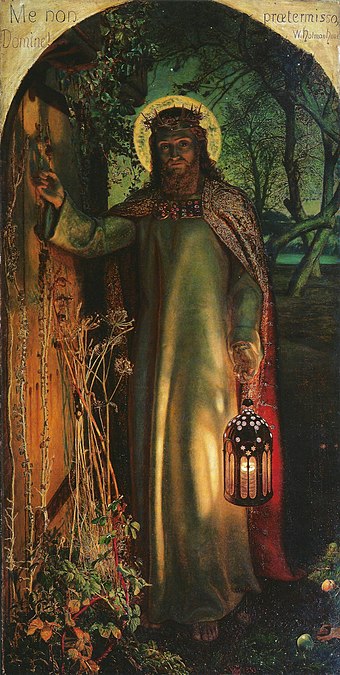
Download Podcast: "The Light of the World"
We follow Jesus as He continues His pilgrimage to the holy scenes and sites that have preceded the fall of night over Judea — a night which is spreading its darkness over the whole Levant. And in so doing He is raising up apostles to proclaim the good news that God has come and that the Heavens have opened.
Last week, He raised up St. Photini and her family and no doubt many others in Shechem. This week we find Him standing beside the Pool of Siloam, recalling King Hezekiah's seventh-century resistance to invading Mesopotamians and signifying purity and the Patriarchs and the true worship of God.
St. John's note that Siloam is translated as "Sent" has been a puzzle which commentators generally pass over in silence. The Greek word underlying the English is simply a precise transliteration as befits a placename: Σιλωάμ / Siloám. It is, however, the Greek word underlying, not "Siloam," but "Sent" which should command our attention: Apestalménos, whose noun form is Apóstolos — literally, "one who is sent out." That is, St. John does not indicate that Siloam is translated as "Sent," but that the whole sentence is a "sending out." Our cue, of course, is the word "Go":
| "Go, wash in the pool of Siloam" (which is translated, Sent). (Jn 9:7) |
as in
| "Go therefore and make disciples of all the nations, baptizing them ...." (Mt 28:19) |
As Jesus re-creates and baptizes and sends this man into the world, He has just earlier reminded us that He too has been sent:
| "I must work the works of Him Who sent Me while it is day ...." (Jn 9:4) |
Here is a remarkable milestone in the advance of Heaven's Kingdom. As Jesus would say, "Who has eyes to see, let him see!"
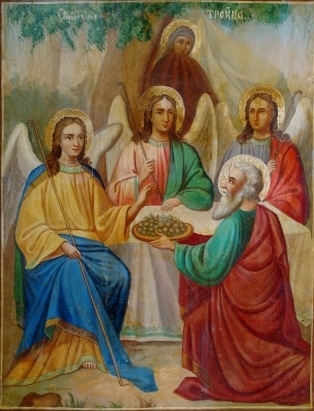
Download Podcast: Beginning Again
Journeying south from Galilee, Jesus arrives to Shechem. In the world after the Flood, this place marks the beginning of salvation history. God had revealed Himself three times: to Adam and Eve, who betrayed His love and intimacy; to Noah and his family, who polluted His whole new creation with father drunkenness and mother incest; and to Abraham, on whom has He set His dearest hopes. It was in Shechem that God first appeared to Abraham, and in Shechem Abraham built his altar betokening everlasting remembrance. But upon God's return to Shechem, only a ruin remained of the Patriachs, and no remembrance of the God Who entrusted His love.
Here, the Son of God sets about re-establishing intimacy with His people, and a religion founded upon mutual trust. Here, His first evangelists would receive His holy fire and burn to tell all whom they met of the Almighty Savior of the world.
Shechem is where our faith began about four thousand years ago and where it began again two thousand years ago. May we be touched with the same holy fire. He touches us unto our inmost selves. He receives our secrets and shames. He embraces us with His purifying love. He forgives us and reassures us that "all is past." And we are free to love others with the same love we have known in Him.
What is absent in the world into which Jesus is born is the God of Abraham. And with Judah-ism overtaking the people of God with its aloof and dangerous god demanding blood sacrifice. God has no choice but to be two born into the world as a magnificent act of His everlasting love.
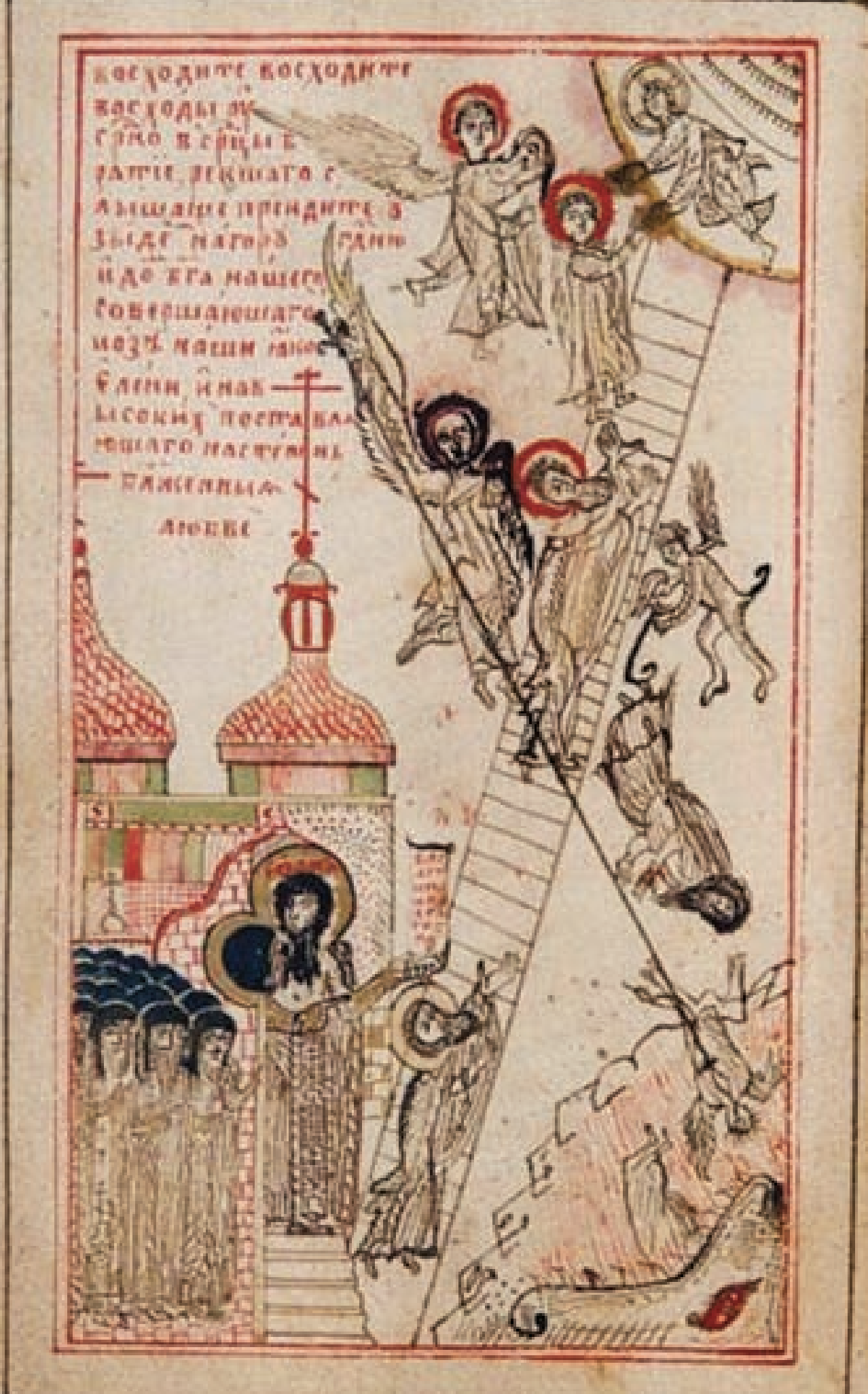
"We are climbing Jacob's ladder," goes the familiar children's song. "We shall see Heaven open and the angels of God ascending and descending upon the Son of Man" (Jn 1:59) ..... a phrase which also means "upon you and me." I have tried very hard these recent years to be a helper as all must climb this ladder, must pick up our cross and follow Him along the path of theosis. We must not be passive, accepting the theology of the Zion Temple — depending on blood sacrifice to effect our salvation. We must struggle for our lives. To help in this struggle (I pray), I have written more than five hundred reflections (and podcasts). Thousands of people visit the Hermitage website each week, so the Sisters and I see that our work has not been in vain.
But I see that even at the level of typing, the effects of my stroke weigh down on me. I live as in a smaller neurological box which limits my body including fine motor functions. My cognitive functions, as I have shared, are also impaired. Yes, I must "take my time," but this means it takes much longer to complete my daily tasks.
This monastery has always lived in poverty. We have our life of prayer each day. And we must feed our bodies too and buy fuel for our farm equipment & delivery van and pay our water bill and power bill and our taxes and ......
At present, we are planting >4,000 turmeric plants, and must remove weeds with our hands every day, for we are use organic methods. Our buildings are not yet finished. The demands of operating a business and all its administrivia go on and on. And advancing age means that we must do everything with eighty-year-old minds and bodies. (Thank Heavens for our lone helper, a fine young Tongan man we have known since high school.) But we are mostly alone — two elderly nuns and their elderly chaplain — slowly falling further and further behind on every front.
With so much facing us, I must step away from this online ministry entering an open-ended sabbatical. Following the advice of priests who have contacted me, I will post reflections from past years each week. Meantime, please pray for us that our strength and health might keep up with the farm.
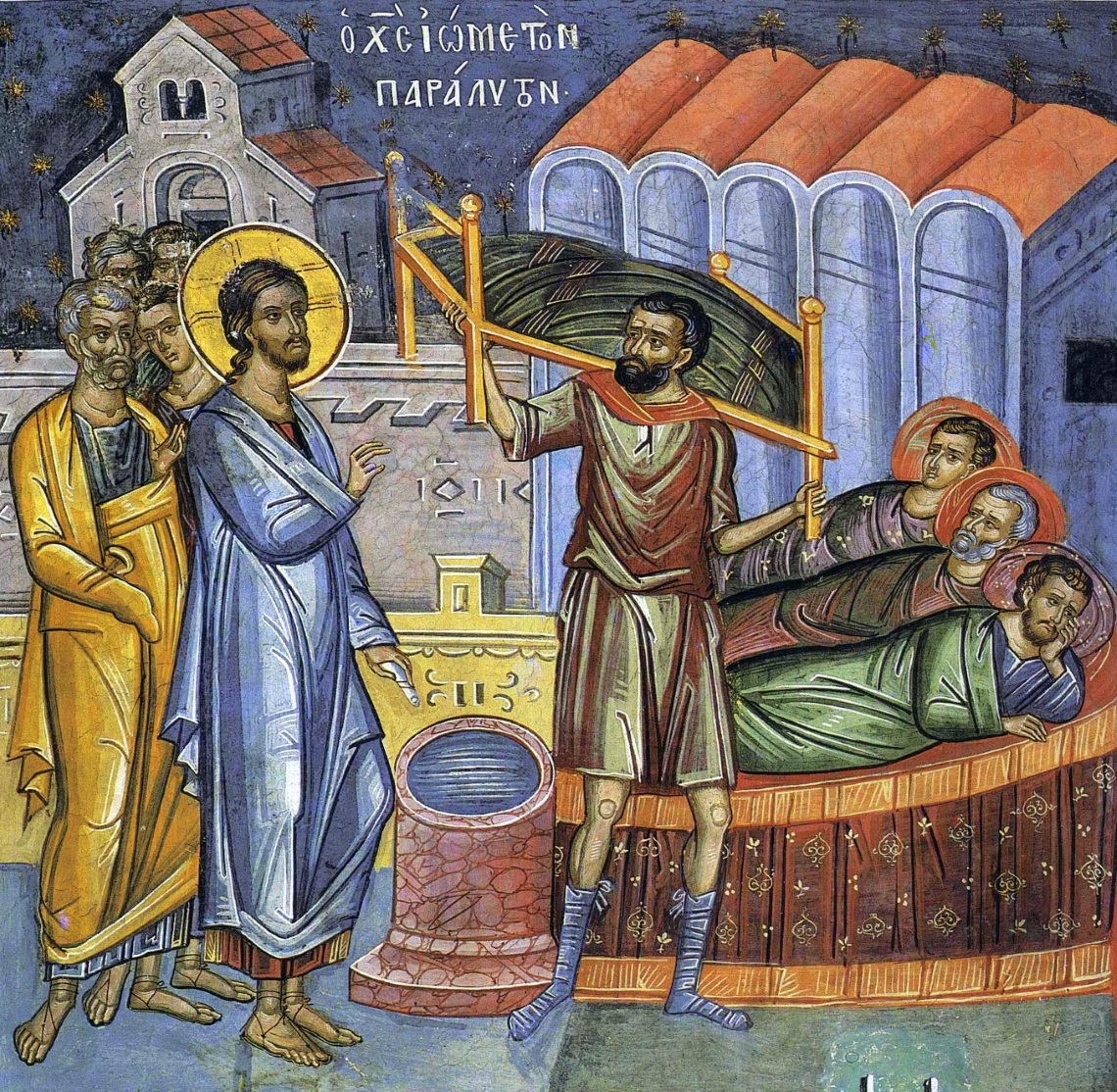
Download Podcast: "The Unknown God"
We do not have time to review the whole of St. John's Gospel, much less all of his writings. But the theme is established. From the opening of his Gospel to the battle with Babylon in the Book of Revelation, the main subject is false religion and the appearance of God in a world where He has been banished. The Evangelist depicts Him as the Warrior YHWH, bringing the whole universe into being with the Breath of His Mouth, shattering the Zion temple and all of Jerusalem with a pronounced sentence of destruction, and showing Himself to be Victor even over Death .... not once but three times.
He is no pathetic lamb born into the world to die so that our door lintels might be daubed with His blood. But rather declared boldly, soaring far above "the Passover of the Jews" (at the Evangelist John would say), is the King, is the Epic Warrior, is God Incarnate, Who sweeps aside the imagination of our hearts, Who shows the strength of His arm, Who overturns the mighty from their thrones, and Who scatters the proud and their vain beliefs. He is the God of Abraham, Isaac, and Jacob, and He stands before us in His Royal Splendor, evincing Unimaginable Power, and offering His Divine Friendship to any and all who requite His Almighty love.

Download Podcast: "God Is Love"
The Gospel of the Beloved Disciple concludes with the information that the whole world could not contain the first-hand accounts that could have been written about the things that Jesus did and words that He said, giving the lie to Sola Scriptura and attesting to the vital importance of Sacred Tradition. And the witness, the scribe, the friend entrusted with this most Holy Sacred Scripture, who was the vital repository for this Most Sacred Tradition, was the Beloved Disciple John. He would be the norm for the confession of faith of Holy Orthodoxy. "And why Him?!", Peter asked in tones of protest. Because he loved with the love that the Master loved us: the new commandment (Jn 13:34).
We invite you to abide in Their love.
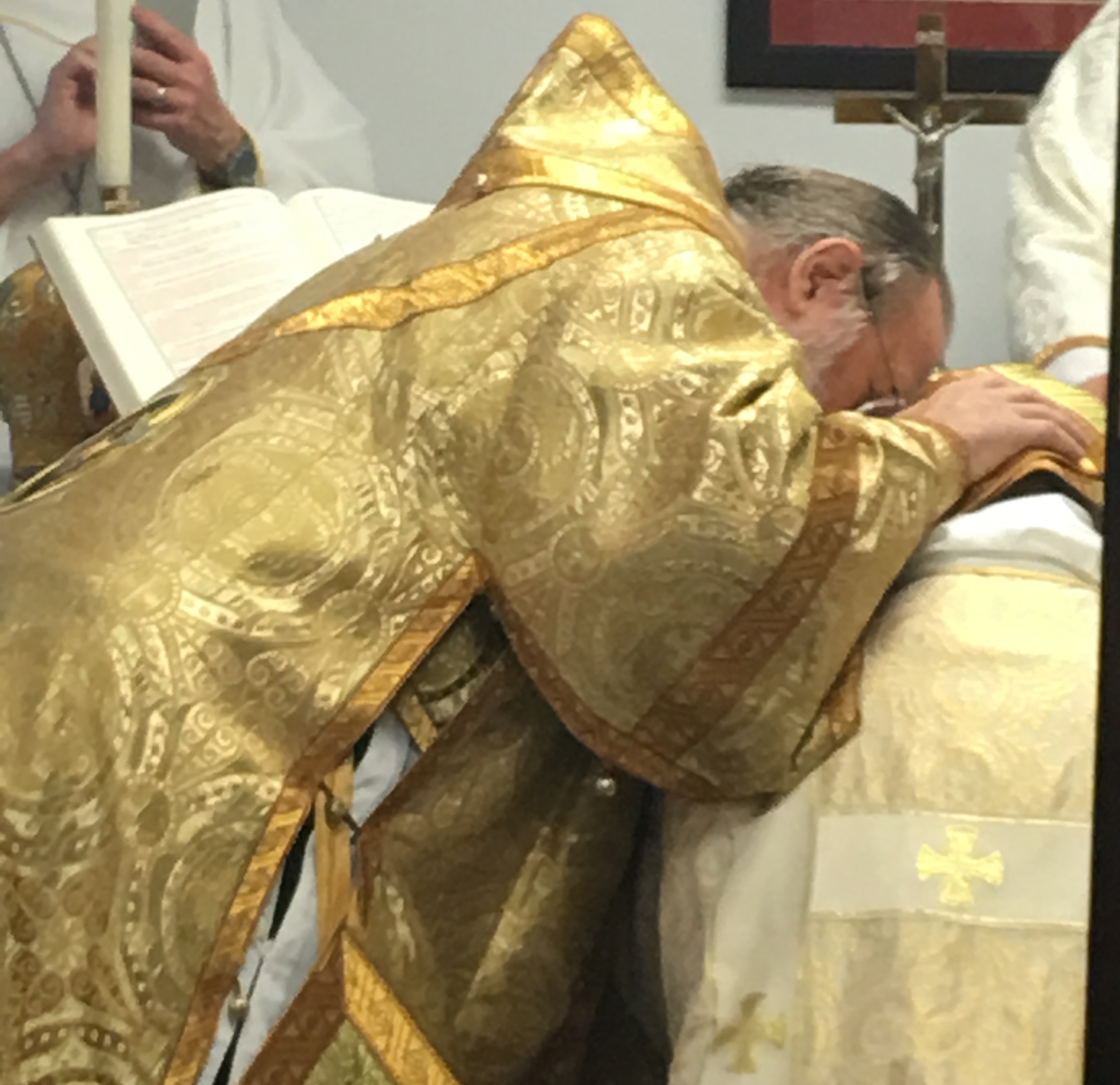
Amen and amen. May it be so!
His was unfailingly kind.
His nature was gentle and could not be otherwise.
His inner stillness manifested itself as an inveterate patience.
His first instinct was compassion.
His humility was legend. ("We all slept in beds, but where did Vladyka sleep?"
It was later learned that he stole off the monastery print shop and
slept on the floor under a table.)
In a word, he was holy.
When he ordained me a priest of the Russian Orthodox Church, he bent down, placed his face next to mine, and whispered, "Pray for strength." I did as he said.
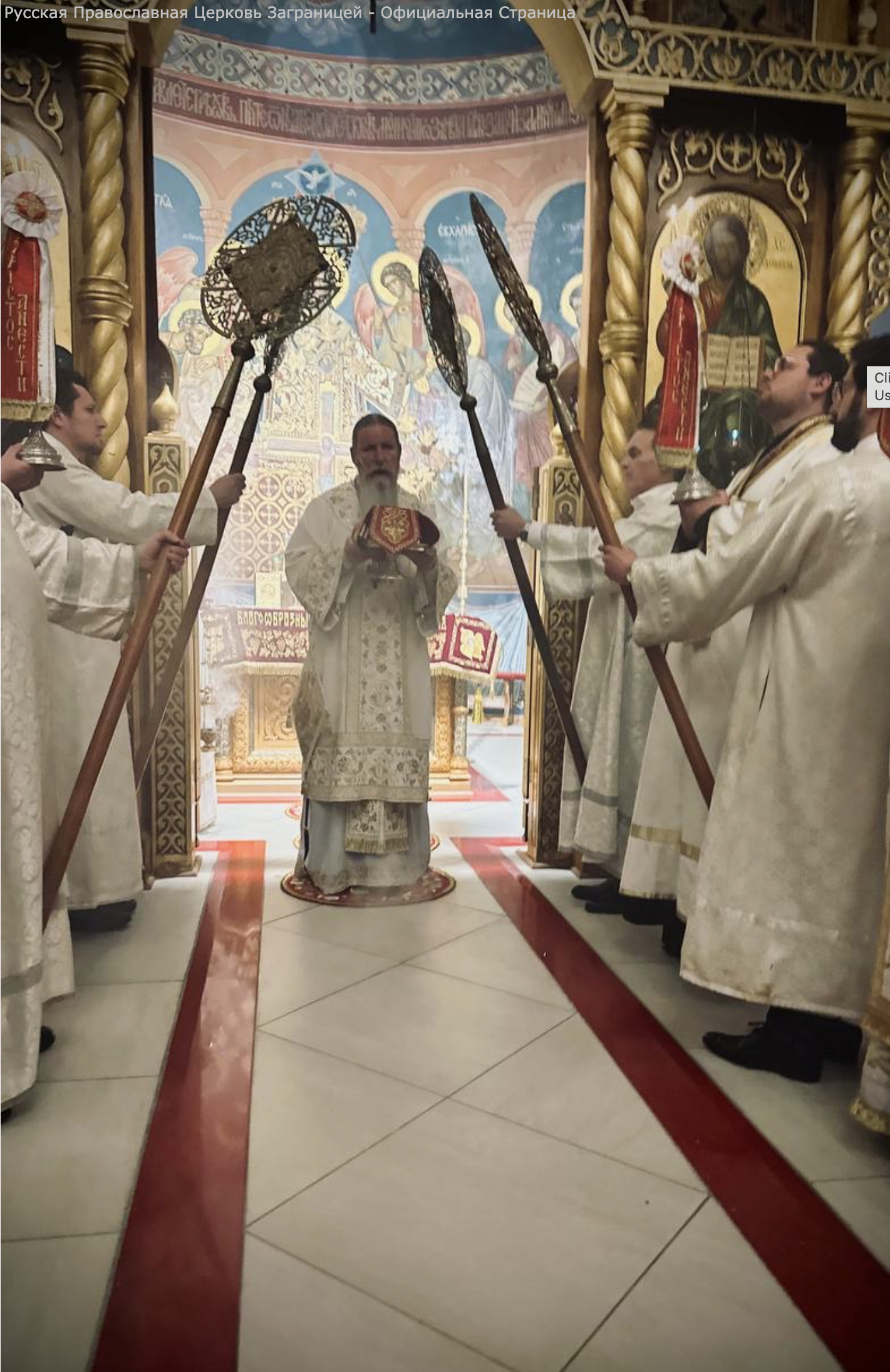
Download Podcast: "His Eminence, Abp. Kyrill, Paschal Epistle"
Excerpt (full text through link above):
These words, delivered by an Angel to the Myrrh-bearing Women, came to man in an hour of profound darkness.
The human race grieved at the grave-side of its Saviour.
The earth, and even the sun, trembled at the gravity of man's sin.
Godlessness seemed, for a moment, to reign;
and the centurion's awe-struck cry at the Cross,
"Surely this man was the Son of God" (Matthew 27:54) only emphasised the tragedy of what had taken place:
man had striven to supplant God, to kill what was good and right,
and to set up his own will in place of the Divine Will of the Creator.
But the Angel cried out: "Christ is risen!"
The Angel cried out in the midst of that darkness, and the darkness changed to light.
We call Pascha the "Bright Feast" of the Resurrection, because a Light has truly
"shone in the darkness, and the darkness did not overcome it" (John 1:5).
It was not able to overcome it, and it never shall — not in that day, not in ours, not in any other.
* * *
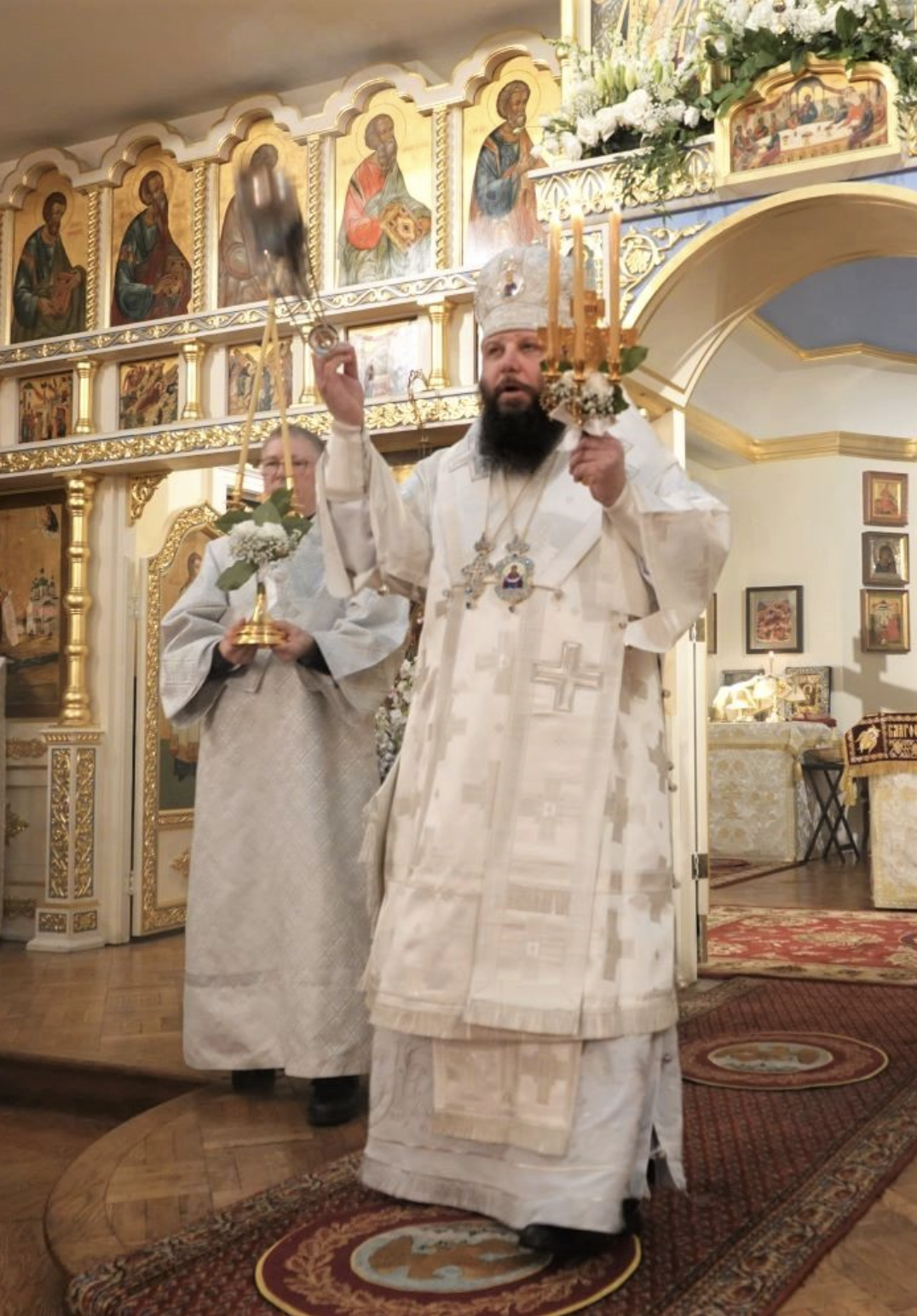
Download Podcast: "His Eminence, Met. Nicholas, Easter Reflection"
Excerpt (full text through link above):
On the threshold of His suffering, the Lord was surrounded by human passions that led Him to Golgotha. The Pharisees had long sought to kill Him, while the people, who only days before had ecstatically greeted the Savior in Jerusalem, were now powerfully disenchanted with Him, because He did not turn out to be the political messiah who, as they had hoped, would deliver them from the Romans and restore the Kingdom of Israel. To the shouts of "Hosanna" and the cries of "Crucify Him!," just as to accusations and false witness, Christ responded with silence. As the Gospel says, "but Jesus held His peace" (Matthew 26:63). Preaching in Galilee and Jerusalem "the Gospel of the Kingdom" (Matthew 4:23), which "is not of this world" (John 18:36), Christ did not speak out about the Roman occupation or the imprisonment and execution of His Forerunner. He did not call on the people to overcome the torturous problems of human society or societal ills, but rather of fallen human nature — in the name of healing it and transforming it into a divine nature.
* * *
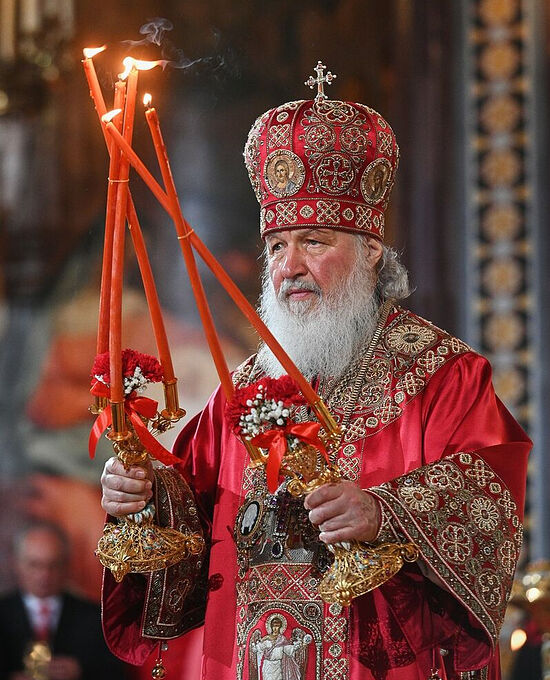
Excerpt (full text through link above):
* * *
Reflecting on the feast of Pascha, Saint Nicholas of Serbia,
a prominent theologian of the past century,
wrote, Christ is risen — means that life is stronger than death.
Christ is risen — means that good is stronger than
evil.
Christ is risen — means that all difficulties in life are resolved
("Thoughts on Good and Evil").
And this
Paschal joy, which is the joy of communion with God and of building up a new life (Rom. 6:4)
on the basis
of goodness and justice,
touches the hearts of millions of Christians, inspiring them to do works of charity
and mercy, helping to overcome adversities, comforting them in ordeals, giving hope to the desperate
and strengthening the fainthearted.
On the radiant feast of Pascha our special prayers are offered to God for people in combat zoness.
We as
Christians cannot remain indifferent to the troubles and hardships of our brothers and sisters whose
hearts are seared by the fire of internecine strife.
So we lift up our fervent supplications unto the Lord
that by His mercy and loving-kindness He may heal bodily and,
above all else, spiritual wounds, give
comfort in every sorrow and grant a lasting and just peace
to the brotherly peoples that came from one
Dnieper baptismal font.
The earthly life of the Savior was full of labor and sacrificial love for people,
and we are called to become
like Him in serving our neighbors,
since any, even the smallest virtue, every effort to overcome our own
selfishness for the sake of another person, draws us closer to God
—
the Source of life and immortality
—
and therefore makes us happier.
* * *
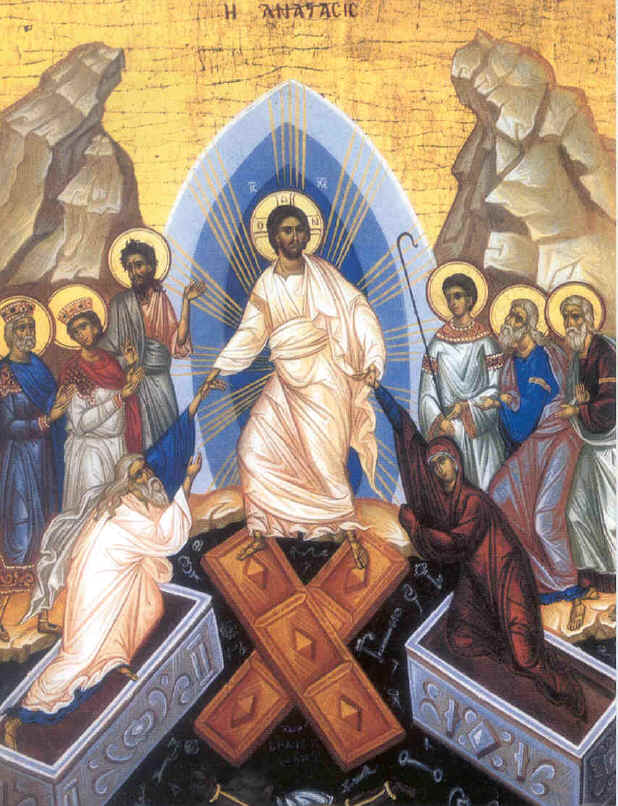
Download Podcast: "St. John Chrysostomos, Easter Homily"
By longtime tradition the guest homilist at Easter at every Orthodox temple is St. John Chrysostomos (b. 347). He takes his text from the Parable of the Workers in the Vineyard (Mt 20:1-16). In the Vineyard of the Lord, even at the last hour, sincere and earnest labors deserve the full wage.
For the Good Thief, St. Dismas, the last hour was the literally the last minute. As we considered on Great Friday, this man has made the good confession. He truly regrets the ignoble things He has done. He asks not for reward but yearns only to set things right. He wants to be done with the past. And Jesus will crown this man who has decided down to the foundations of his soul for goodness.
Honor and praise to the man who offers a truly contrite heart and confession. Glory to God, Who forgives! And good hope to those who look on, for such is the Kingdom of Heaven.
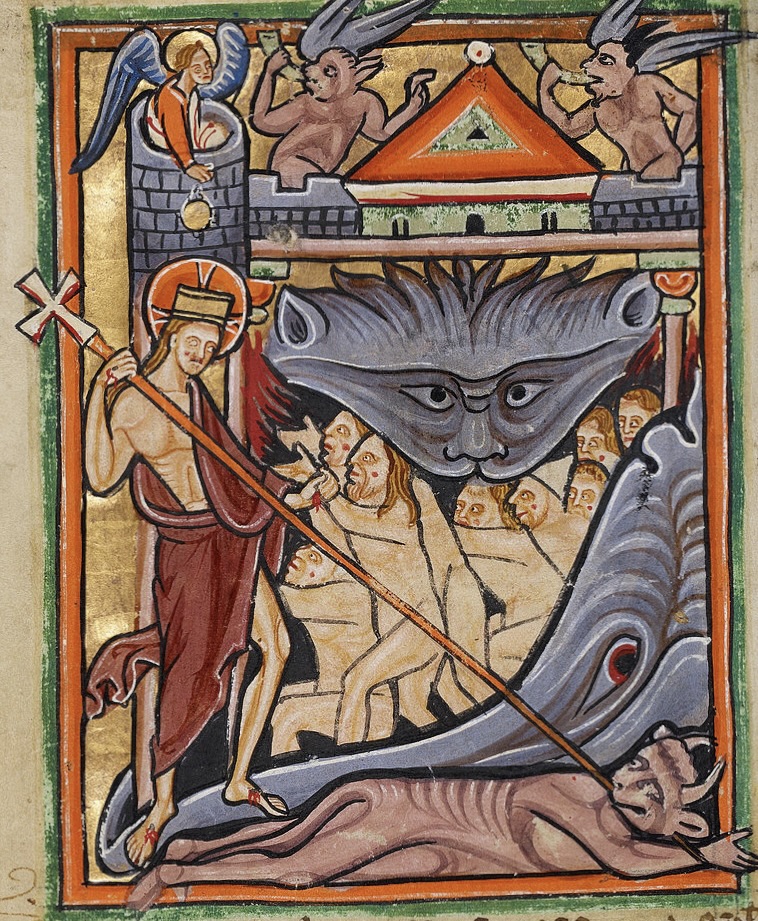
Download Podcast: "The Glyph of Divine Life"
The great events of Triduum are not events at all. They are effects. We are feeling the effects of the irresistible, inexorable nature of God in the Person of Jesus Christ. Before time and space, He was Divine Life. At the Creation of the world, as the Logos, He was and is Divine Life, conferring this mystery on all living things, causing each to stir with that holy motion we call life. When He created Eden He caused Divine Life to embue the human lifeworld. And when the humans chose for death, blighting His empyreal gift, He entered the human lifeworld as a creature. The world could not help but be renewed by His nature, which is Divine Life (Athanasius, On the Incarnation). When the sick and the lame and the blind drew near to Him, they too felt the Almighty dunamis (force) of Divine Life and were made whole. For abundant life cannot help but flow freely from His hand as an ever-yielding spring. "The one who drinks of the water I give will never thirst again," He said. He called this "living water." He is the Lord of Life and its author.
From the foundation of the world, He was Victor over death and easily raised the dead on earth three times. Was anyone surprised at His Resurrection after three days? He raised Lazarus after four. He said of the centurion, "I have not seen such faith in Israel." A failure to expect His Resurrection as one expects the sun to rise is a collapse of faith! There was no battle. No contest. No prolonged epic fight. But rather the inescapable effects of Divine Life. It was over before it began.
When He entered Hell by the free choice of its warden and chief jailer, He shattered the House of Death .... inevitably, irresistably, inexorably. All present were ordered to life .... excepting those who chose for death. For He has granted us that essence of life, which is free choice. From Eden to Doomsday, an attribute of our Divine sovereignty, our Divine power, is to choose for that which is not of God. And all not of God is death.
The Gospels are about Divine Life, a subject which towers above every other subject. Our salvation does not proceed from an empty tomb. An empty tomb is an effect of the salvation we were born to. And for five centuries the foremost symbol used by Christians to identify who they were and to identify who He is was a fishlike glyph that resembles infinity, which is inextricably tied to its temporal cousin eternity.
Read the story of life. Ever after you will lose all interest in tales of death.
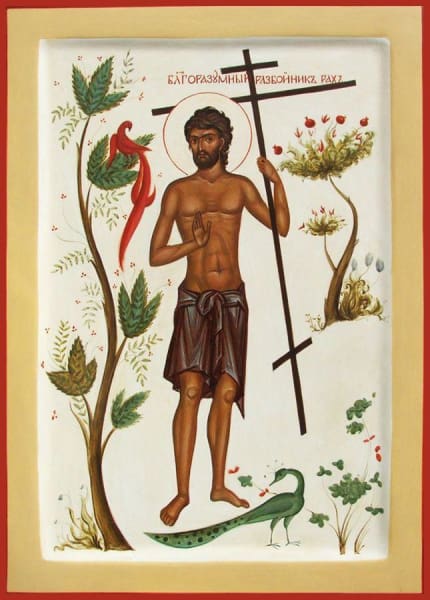
Download Podcast: "Royal Gospel"
Words cannot express the grief that overwhelms us as the Beloved, the Holy One, the Great King, the Son of God is spat upon and mocked and tortured and degraded in every way the depraved mind can devise. With one word, He would have been spared this. But no word was spoken.
He offered Himself as ransom saying, "I have told you that I am He. Therefore, if you seek Me, let these go their way" (Jn 18:8). But no one He saved protested. No Pythias spoke up to ransom Damon. No Damon stepped forward as ransom for Pythias.
He had fed multitudes. He had taught them and exorcised them and healed them. He had raised them from the dead. No doubt those whose lives He changed were present in the crowd when Pilate asked, "Do you not want me to release your King?!" (Mk 15:9). But they spoke not a word to spare Him torture and degradation.
What did it all mean? What does it mean today? God became man to awaken us from a trance — from our hellish fascinations to our terminal spiritual diseases of egotism and selfishness and consequent rage. This was not what we were born to be. And Jesus the Teacher would save us. But what is the nature of this salvation? Why was Jesus born into the world?

The West calls this Holy Day, Maundy Thursday — the eve of Triduum. The word maundy is strange to most people because it is barely an English word, fashioned from the Latin mandatum (from which our word mandate derives). It expresses a particularly holy moment in Jesus' leave-taking of the Twelve. He tells them, "A new commandment (mandatum) I give to you, that you love one another as I have loved you" (Jn 13:34).
Jesus models this love for them by washing their feet. Yes, it is an act of humility — that their honored Teacher should perform so lowly a service. Peter protests that he will have none of it! But Jesus attends to the feet of these men for another reason. He is conscious of the many miles they have walked following Him. Their apostleship is nearly indistinguishable from their feet. He has sent them, and they are to go. And they will go many more miles — walking east to India, to China, and north to the Eurasian Steppe. They will walk, nearly all them, to a martyr's death.
He lavishes His loving attention on these vulnerable feet sent out into an inhospitable, even murderous, world. Yet, these are the feet which are also bound for glory:
|
Beautiful upon the mountains
Are the feet of him who brings good news, Who proclaims peace, Who brings glad tidings of good things, Who proclaims salvation .... (Isa 52:7) |
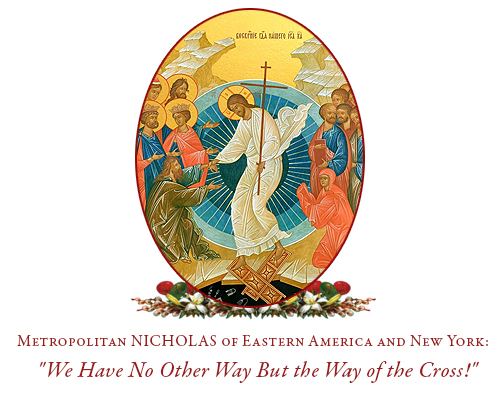
Excerpt (full text through link above):
* * *
I approach the coming Pascha with great hope that the Lord will lead the world out of the hellish darkness of military conflicts and all kinds of tribulations into the wondrous light of His Kingdom and His peace, of which, on the eve of His sufferings, the Savior said to the Apostles:
"Peace I leave with you, my peace I give unto you: not as the world giveth, give I unto you. Let not your heart be troubled, neither let it be afraid" (John 14:27).
In our churches, prayer for the peace of the world, for the peace of the whole world, and for times of peace, is carried to the Throne of God with special power, and I very much hope
that the peace of Christ will be established in the hearts of all believers. In these days, leading us to Pascha, we cannot help but recall the words of Archbishop Innokenty of Kherson and Taurida, a wellknown preacher and spiritual writer:
"You therefore who in your thoughts strive to embrace the fate of all mankind and would like to find a means of delivering it from evil, rejoice and be glad! This remedy was found in heaven by God Himself. The Savior has risen, Who will wipe away all tears from their eyes’ (Revelation 21:4), of every sufferer. After that, all we have to do is follow His plans, spread His Light, spread His life."
Therefore, as we approach Holy Week and Holy Pascha, it is my prayer that we, the archpastors, clergy, monastics and flock of the Russian Orthodox Church Outside of Russia, may be able to become the presence of the Risen Christ on this earth.
* * *
After all, we sing at Easter: "Behold, joy will come to the whole world through the cross," and Fyodor Dostoevsky reminds us: "Where the Cross is, there is the Resurrection."
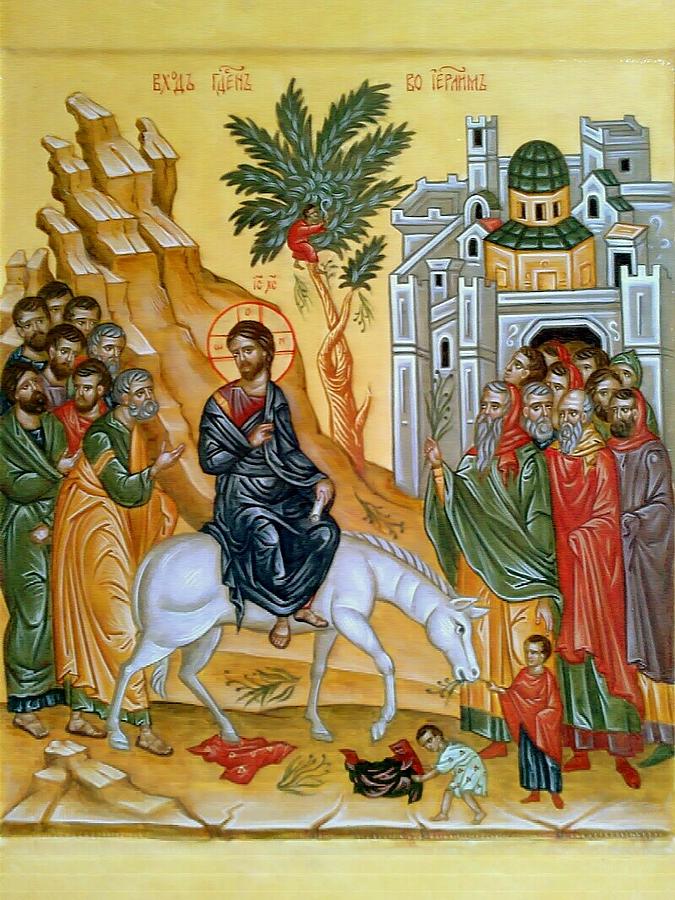
Download Podcast: "God and King"
The Gospel According to St. John concludes its first chapter with a momentous and mysterious promise: the Twelve will see a restoration of the banned religion of the Patriarchs and all which those ancient and venerable ways signified: intimacy with God, the company of angels, and the Kingdom of Heaven opened before them. These things come to culmination as the Gospel approaches its climax: the entry of the Lord Jesus into Jerusalem.
He is YHWH Incarnate. Yet, the very mention of the proper name for the God of Israel had been banned by the Jerusalem authorities. What will happen next when the King Who is outlawed in His Own historical city — the City of David (2 Sam 5:7-10), the City of the Great King (Ps 47/48:2) — returns?
St. Athanasius the Great wrote that when the King of the Universe touched the Creation He made with His Own Person — really and truly became a creature — nothing would be the same. For all the Creation groaned and yearned for this moment (Rom 22-23), and today He announces His Presence. What will the people say? What will they do? For in their midst today in a mystery yet as real as a living, breathing man is YHWH, their God and their King.
What comes next is the decisive moment God always already prepares for each of us. "Who do you say that I AM?" This is the crossroads of our lives. And how we behave at this crossroads — falling prostrate in quaking reverence or demonstrating profane indifference .... or worse — will greatly matter. It will greatly matter when God calls to you. What you do next will decide everything.
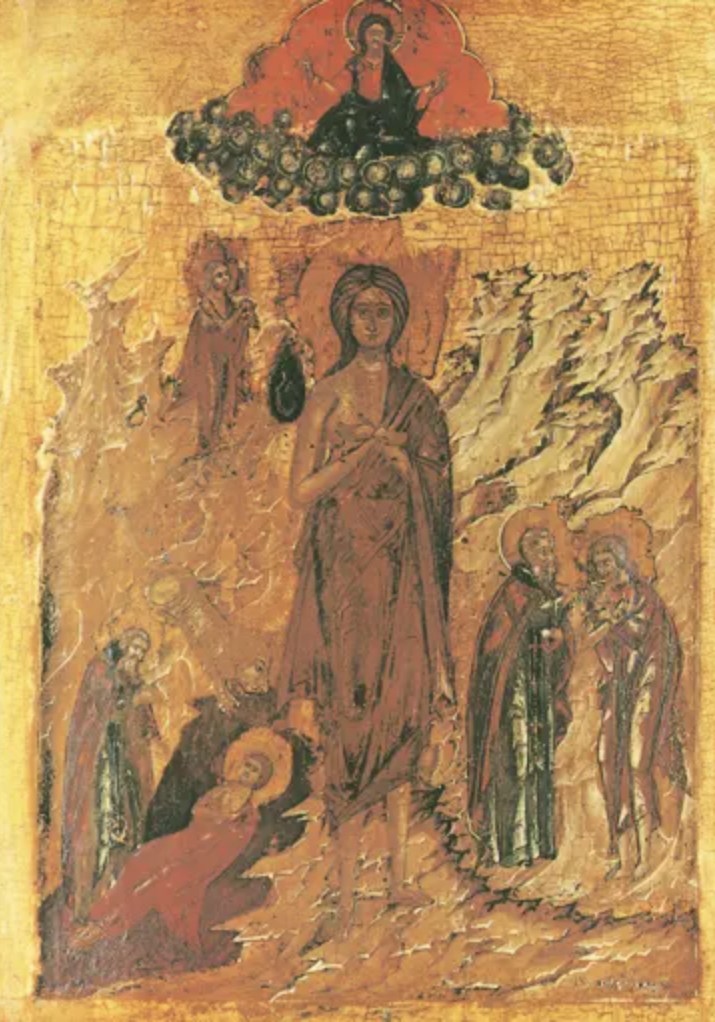
"Sexual sin drags more souls to Hell than any other." This was the pronouncement of the Most Holy Mother of God as she appeared in Fatima, Portugal in 1917 before 70,000 witnesses. We say the Seventh Commandment proscribes adultery, but isn't all sexual sin adultery? Jesus counted sexual fantasy as an instance of adultery (Mt 5:28). And what of idolatry? Do we not bow before sex as a god, devoutly worshipping its images for hours and hours in the form of pornography? Do we not dishonor family by desecrating the holy rites practiced only by a father and mother? Do we not steal and even murder by robbing a young woman or young man of the gift they can never give again? And which form of covetousness is more commonly practiced than desiring a married woman or a married man?
It is right that St. Mary of Egypt should be our last meditation before we turn our eyes to Jerusalem and behold the desire of the everlasting hills (Gen 49:26), Jesus the King of kings, entering David's City. For we must have absolved hearts before claiming fealty to our King, and we must have clean hands before laying the palms of Eden at His feet.
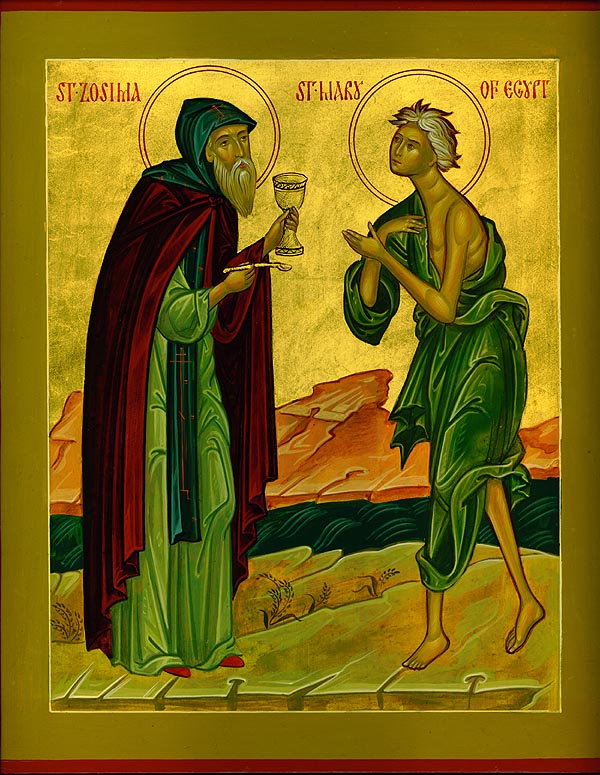
Download Podcast: "The Inescapable Journey"
As in all eras of human history, our own time is entranced by delusions. Perhaps the master delusion is that each person has his or her own truth and that all truths are of equal value. It is convenient for a pluralistic society to believe this. At least, it avoids arguments. But as important as manners might be, they do not take precedence over imperatives of our health and ultimate well-being.
Here on the Feast of St. Mary of Egypt, we are bound to admit that her journey is the journey all people must face. Her excesses are the same ones nearly all of our children (in the year 2024) habituate. And her awakening is certainly the same awakening we all will have (or have had).
God sees to it that none of us escapes His attention. Our lives are dramas that enact the same themes, are characterized by the same struggles, and arrive to the same climax. According to God's will, all arrive should to a good end .... though we in our perverse stubbornness may turn comedy to tragedy.
St. Mary of Egypt arrived to life-affirming comedy, fully in God's hands. But either way, comedy or tragedy, her journey is ours. It is inescapable. And no one may elude it.
Please join us as we sit upon the ground and share rueful stories of our common heritage.
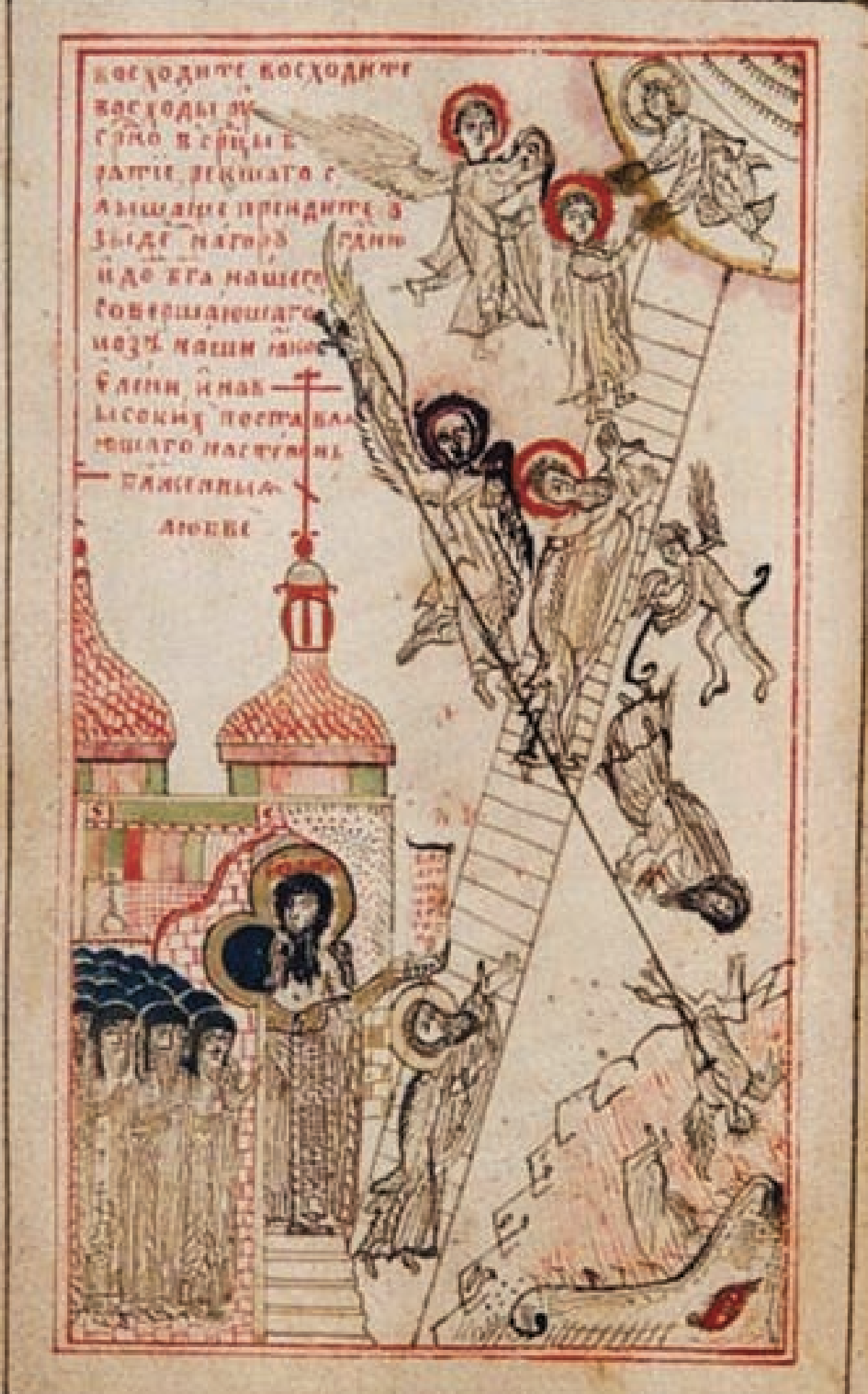
Download Podcast: "The Ladder"
What shall we say about the ladder which dominates our culture, which controls our public values and even our laws: the ladder of descent? We are drawn to it each time we go back into the world — its television, radio, and internet. Humor at the cost of others, demonizing the other point of view, a feeling of superiority, relationships which exploit, self-promotion, association for the sake of self-advantage, and the question always, "Why can't I?!" This is drumbeat of descent.
The antidote is love, whose highest form is loving God with all of your heart and with all of your soul and with all of your mind. This is the greatest commandment because it is one which saves all. But can we truly say that this love is our single-minded devotion, that we live it every minute? Perhaps our hearts are not ready for this love, that we are not big-hearted as He is. This was Peter's fate as we take leave of him in the Gospel of St. John. He is not ready to requite the love of God.
So God enrolls us in the school of love. He has left love as the only Divine property to be found on earth. We all shall encounter love — this life-changing, soul-elevating, all-absorbing experience which endows ordinary life with the Heavenly. And our hearts will be made big. They will swell until we fear they will burst, and then they will swell further until our former life is but a speck and a whole new life has entirely replaced it. In this, we have laid down our life for our friend, died to a former life .... that God may enter in. For no love worthy of the name is a love which is not His: the love He taught us over and over again: agápe. For the object of our earthly love turns out to be the handmaid of the Lord, for God is always the subject of noble love.
Are not these the rungs of St. John's Ladder? Is this not the same transformation that he has described — from leaving our past lives behind to the attainment of beauty and serenity and union with the One Who is Love?
Read The Ladder in a new way: as the story of your own experience of love. You will only want to be seen in your best light. And soon you will become the person she (or he) cherishes and adores, and never less.
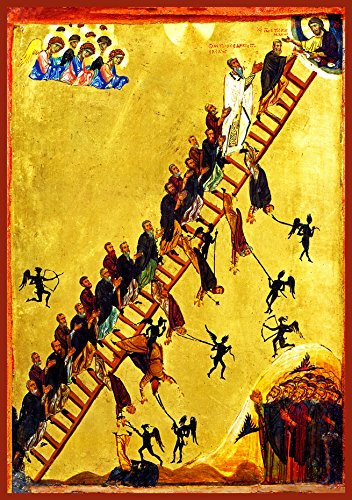
Download Podcast: "The Ladder"
The Fourth Sunday in Lent is St. John of the Ladder Sunday. It celebrates The Ladder of Divine Ascent. This little book about which we know little, written by a monk, about which we know still less, has guided many a soul into the Kingdom of Heaven. I will, therefore, get out of the way providing a little digest of The Ladder in hopes you will read it. It is posted on the Hermitage website.
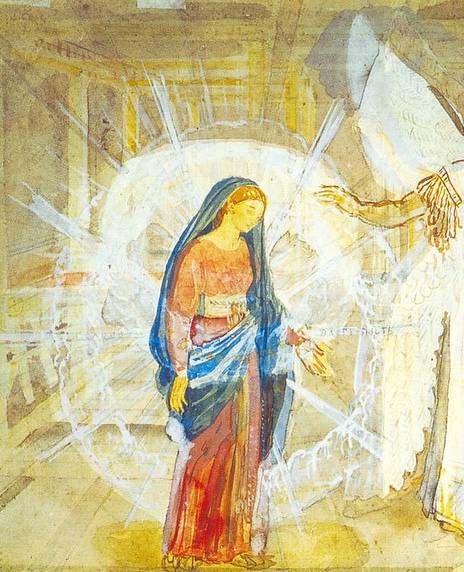
Download Podcast: "Full of Grace"
The Holy Fathers of the third and fourth centuries agreed that the Bible could not be understood except that it be read simultaneously on three levels: the literal (historical), the spiritual (allegorical), and the moral (tropological). A little later Augustine insisted on a fourth level having to do with the Last Four Things (the eschatological level). If there is a conflict or an area of Scripture that seems wrong, Origen wrote, then we must understand that there is a spiritual interpretation that has escaped us. For the Scriptures are always right, and the spiritual mode of interpretation is always primary. The spiritual mode does not neglect the other modes, but is in harmony with them (though that harmony may be a Heavenly music too high for our ears). The spiritual mode is frequently the mode that unlocks the Scriptures (Lu 24:45ff).
When the Galileo affair seemed to challenge the Bible for contradicting its "laws of physics," a saying began circulating among the West's most influential bishops: "It turns out that the Bible is not about 'how the heavens go' but about 'how to go to Heaven'." That continues to be what the Bible is about: how to go to Heaven, about Uncreated Light, about union with God as Jesus and the Father are One, and about our rejection of worldly things and worldly ways that we might participate in that Light.
The literal mode of interpretation is the worldly mode: what happened in the world and in its brokenness. The spiritual mode is the Heavenly view: as God sees things, for He created the world and all its meanings. And we interpret with the Patristic principle that "Scripture glosses Scripture," for worldly analogues fall short.
We must understand that all has been done for us: the Annunciation, the Transfiguration, the miraculous healings, and the wonders, as well as the Passion and our Lord's death on a Cross. This week the Hermitage has drawn attention to the spiritual view, for we journey down the Lenten road of regret. Yes, we must be mindful of past shames, but the main thing is that our eyes be fixed ahead and above. For we are about the holy business of our theosis. He will lead us through high mountain passes, away from the world that we might breathe Heaven's air and think Heaven's thoughts .... and wonder why shameful life ever appealed to us.
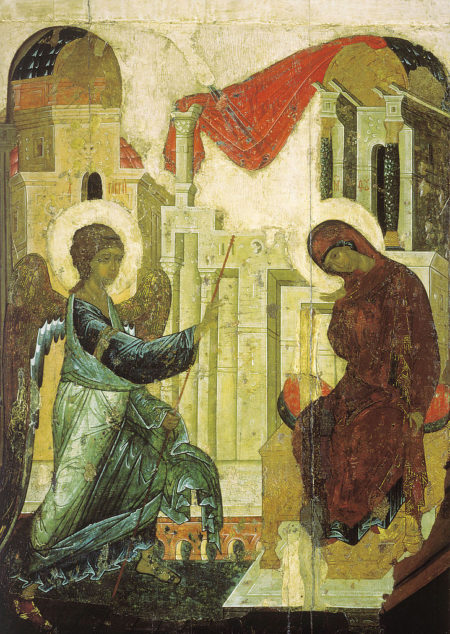
Download Podcast: "Full of Grace"
The highest Mount of Transfiguration, which towered far above Mount Tabor or Mount Hermon, was a fifteen-year-old girl. She was meticulously prepared for this Most Holy event, first by Her saintly parents and then by years of holy living being fed by angels. Upon this High Summit did God lightly step into the lower climes and heavier air of human habitation.
And the sacred language reserved for this event, which was to open the Gates of Heaven, was επισκιάζω / episkiázo rendered as "to overshadow." Better definitions are "to envelop," "to embrace," or still better, "to envelop with light." Episkiázo is a rare verb in the Gospels, used by Luke only twice: once to describe the Annunciation (Lu 1:35) and once the Transfiguration (Lu 9:34). Matthew and Mark use the verb once each to describe the three Disciples being enveloped on the Mount of Tranfiguration. Matthew says "a cloud of light" enveloped them, in Greek a νεφέλη φωτεινὴ / nephéle photeinè. This cloud mysteriously is God, for God's appearance is from within the same cloud.
The only reference point outside of the Annunciation for this "enveloping with light" is the Transfiguration. And the only reference point outside of the Transfiguration is the Annunciation. In the Gospels they are set apart as a sacred pair. They are moments where the veil between the Divine and the earthly disappears.
And they point directly to each of us. We are announced as the Created Image of the Visible Image of the Invisible God. We are destined to be transfigured into our true selves, which we were at birth. Indeed, each of our lives is a drama revealing the same theme: rejection of the culture of death, whose bitterness most of us taste, and a triumphant embrace of God's marvelous Kingdom of Light. We stand at the crossroads where a fifteen-year-old girl stood. And our choice must be "Yes" — the path which leads to God's eternal "Yes."
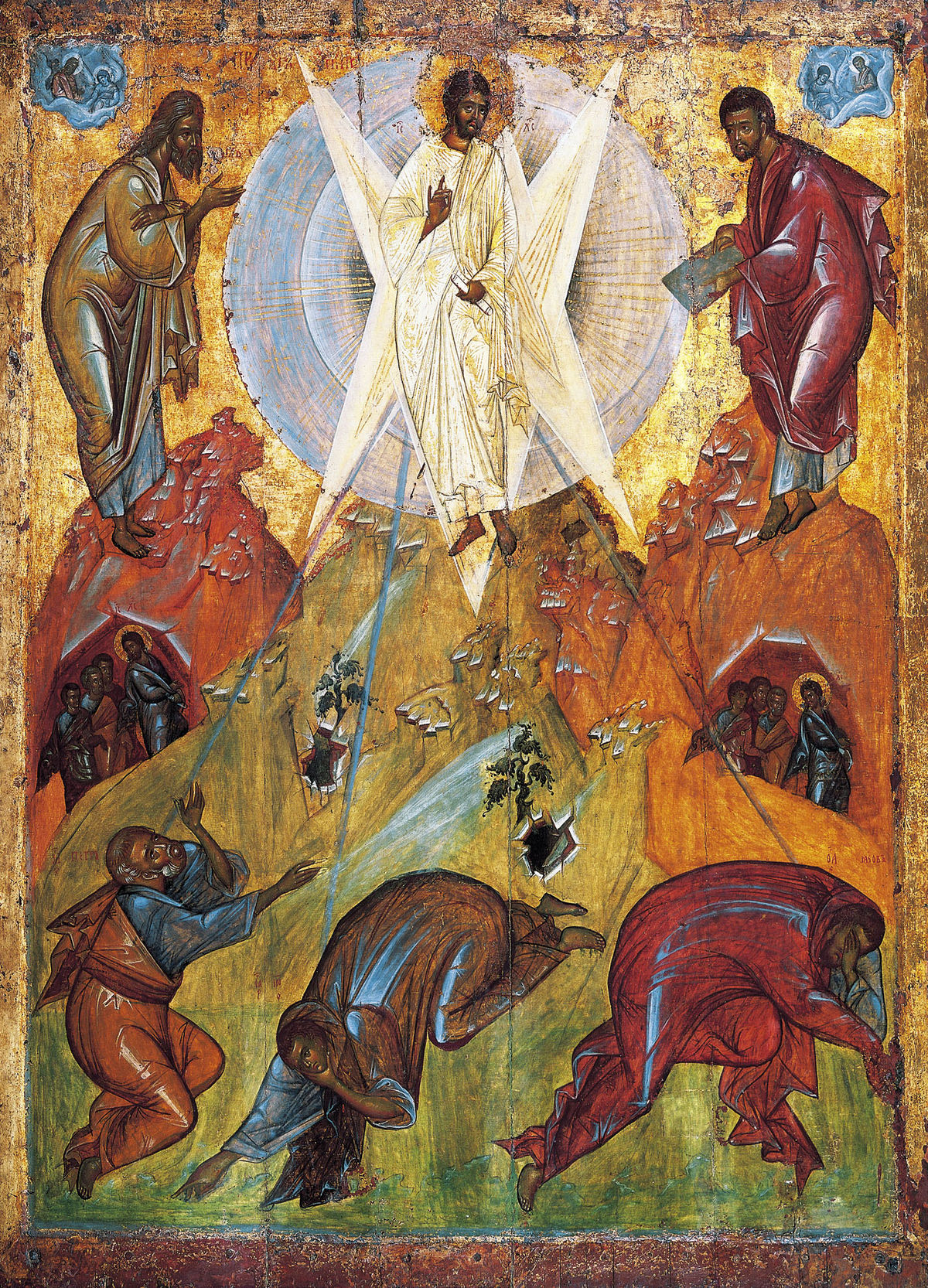
Download Podcast: In Uncreated Light
Do you remember first encountering the phrase Uncreated Light? I do. I could not grasp any part of it. Anything Uncreated was beyond the powers of the my mind. How could the Uncreated be apprehended in the midst of the Creation? Then I realized that from the time I could read I said every week in church, "begotten, not made, of one substance with the Father, by Whom all things were made." The Lord Jesus was "Uncreated" in His Divine Person. And from this fact, I came to realize, that the whole world is divided into two realms: the material world or the Divine order, the seculum or the Kingdom of Heaven, worldlings or the people of God, the consumerist food chain or the Church.
The confusing part comes from God having made everything "and without Him was not any thing made that was made" (Jn 1:3). Everything is endued in some mysterious way with His essence. Yet, there is God or everything that is not God. God the Creator is being. His creatures merely have being.
Nonetheless, God condescends to interact with His Creation through His Divine Energies. But on a separate, transcendent plane, in an overwhelming gift of Self-sacrificing Love, God has opened Himself to union with His human creatures, that they may participate even in His Inner Life, through Jesus Christ our Lord.
Another way to say this is that we may interact with the material world, mastering facts, and ordering taxonomies. And we may do all this irrespective of morality or of the state of our souls. Indeed, we may reject the categories soul or morals in our own ordering of knowledge.
Participating in God's Inner Life is different. Only a sanctified person may aspire to that. Morals are primary in this aspiration as is the state of the soul. Holy Orthodoxy teaches that this is the purpose of life — called theosis. We may follow Jesus, mindful of the imperative of personal holiness, and become God's friends. Or we may immerse ourselves in worldly life, entering a trance that alienates us from the God, Who has surrounded us with His Divine Energies from birth. It all depends on the Light you see things in.
Here on St. Gregory Palamas Day, we give thanks for the magnificent gift of God, even the gift of this Own Nature, which we call Uncreated Light.
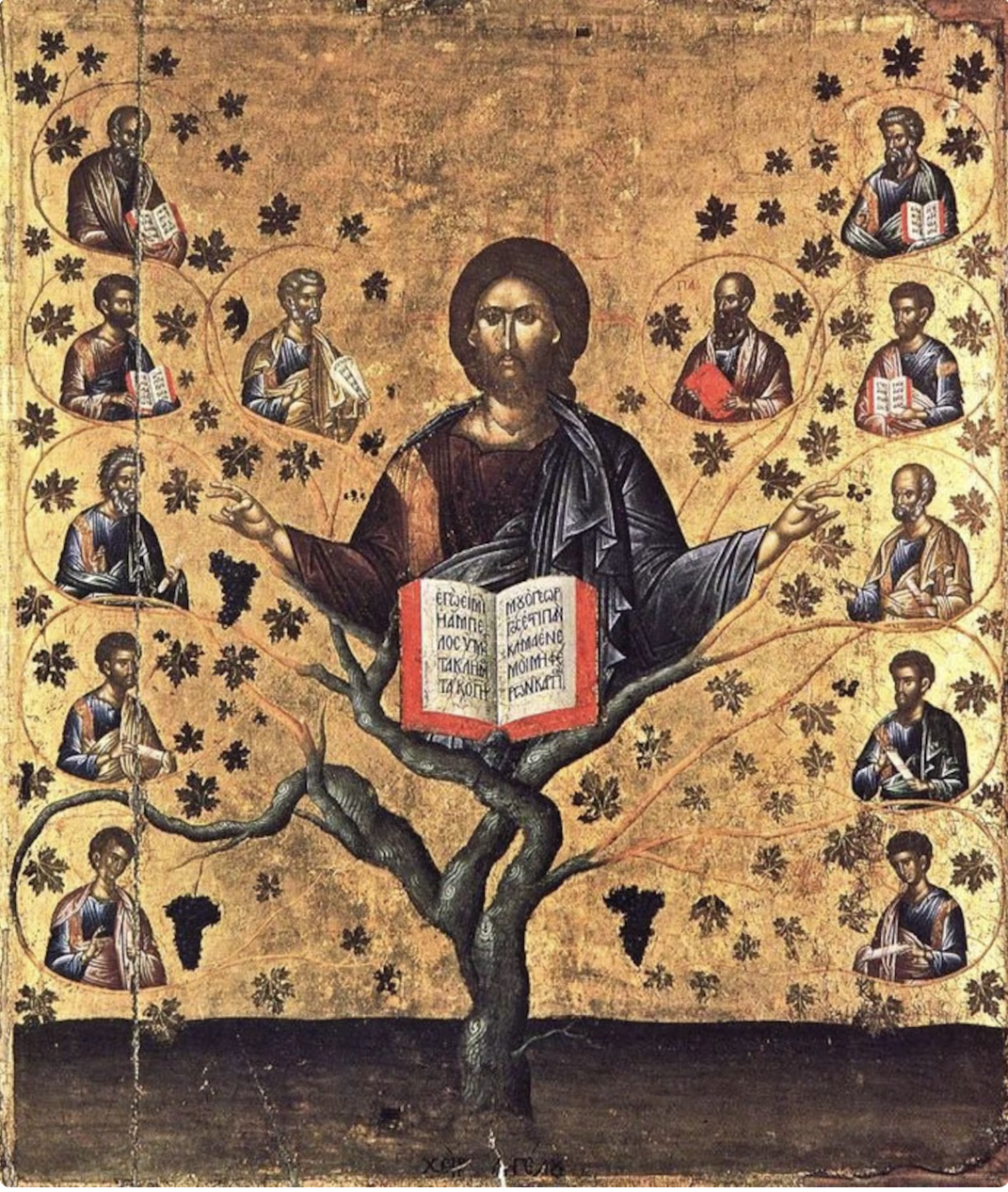
Download Podcast: "You Are the King of Israel"
As we celebrate the iconic Image of the earthly Image of the inscrutable God, we are compelled to admit that we have got some basic things wrong. This was inevitable given the chaos around our earliest traditions. Claiming to battle idolatry, the iconoclast kings of Judah had destroyed many of the sacred images of the Patriarchs — the many scattered altars, the sacred groves, the high places, the sacred pillars, even the most holy and ancient Temple built on Mount Moriah (later called Mount Gerizim). This true expression of the Fathers' faith pointed an accusing finger at Judean innovations on Mount Zion. Revising the Scriptures, they rewrote salvation history and represented novel rituals as being ancient.
Then with the destruction of Judah in 70 A.D., we were left with archeological layers upon layers of confusion. So we assumed the Rabbinic Judaism which survived this cataclysm was also our own tradition. How ironic, that early Christians would turn to the very people who had explicitly rejected their Way and had murdered the Only-begotten Son and Heir.
Meantime, during the 1950s a window near the Dead Sea opened onto a first-century lifeworld which was not Jewish, but rather Hebrew, which descended from the tradition of Abraham and the Patriarchs. Our soundest and most respected scholars have been piecing together tens of thousands of scraps of papyrus. They have been sifting through tens of thousands of pieces of clay. Slowly but surely they have been building up a picture which is very different from the one that has dominated for at least seventeen hundred years.
Their picture makes more sense. Why should the Jews have killed a wonderworker and teacher? Why should the Apostles, especially St. John the Theologian, have despised the Jews declaring their religious observances to be alien? Why should a first-century sect, the Ebionites, have remembered Jesus as one who sought to abolish blood sacrifice, the central ritual of Judah-ism? Why should Jesus have mocked the priests and the Levites associated with the Zion temple? Why should He have fiercely attacked men selling sacrificial animals in the temple?
The list of questions goes on and on pointing away from the image of Jesus the Jew. Rather it points to Him as a true Son of Abraham and a champion of the religion of the Patriarchs.
So let us clean the old icons with care and treasure the images beneath. The soot of wrong conclusion is stubborn and thick. And those who worship the soot are many. The work is perilous and painstaking, therefore. But the vocation we are about is undoubtedly holy.
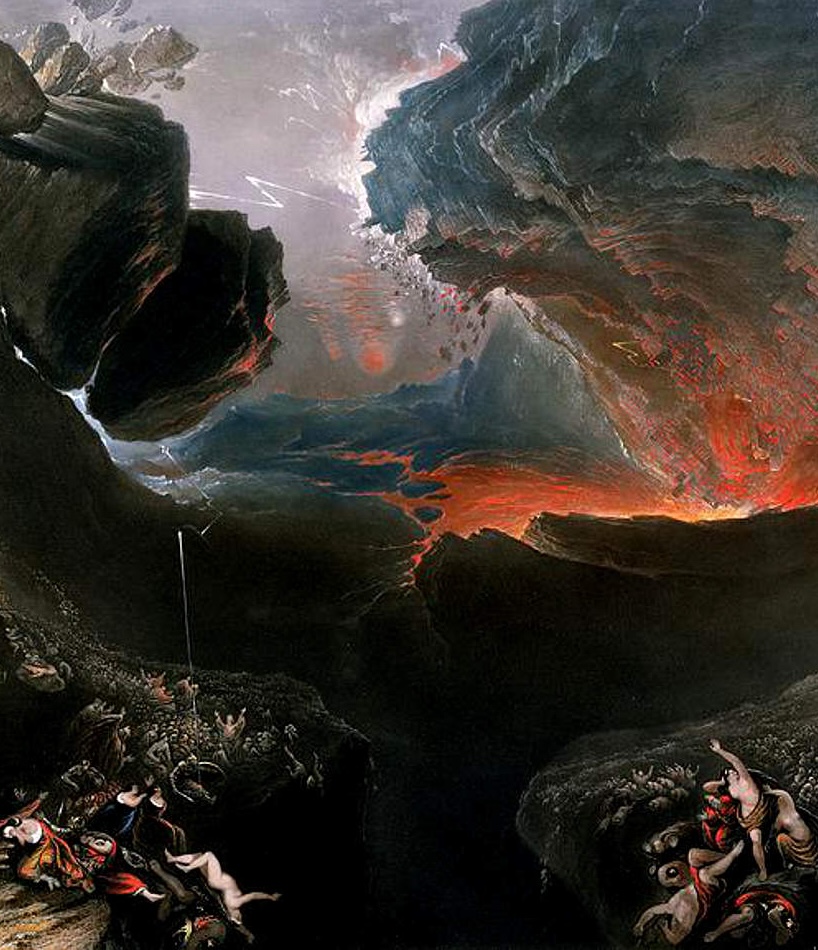
Download Podcast: "Kingdom Come"
What does it mean for God to meet with His people? It is not something to be taken lightly. Many of us are unprepared to receive our God and King. The Hebrew Prophets had a phrase for this meeting: the Day of the Lord. "Woe to you who desire the day of the Lord!" warns Amos. "For what good is the day of the Lord to you? / It will be darkness, and not light" (Amos 5:18).
I began my ministry thirty-three years as an invited preacher to nine area churches. I recall asking from the pulpit, "The Day of the Lord? The Day of the Lord came approximately two thousand years ago. And it turned out to be, not a day or darkness and destruction, but Christmas! We received not a judgment, but a gift: the meek and mild Jesus."
Later, when I went to seminary, studying under rigorous and celebrated Roman Catholic faculty, I read the Bible more carefully and in its original language. I looked in vain for the meek and mild Jesus. I simply could not find Him. Instead, I found a Teacher Who brought not peace but a sword, who spread fire on the earth, and who enjoined us to pick up our crosses and become like Him. I met older priests who had attempted to live Gospel life with exactitude but found that they could not .... lest they be crushed.
The Day of Lord: it is a meeting with catastrophe and the everlasting desire of the hills. It is a fire and a crisis and when the smoke clears, a new kind of life: the Kingdom of Heaven. Both are present. Indeed, one cannot exist without the other, for this world is out-of-joint and out-of-square and must inevitably meet with the supernal and the perfect. Something has to give.
Please join us as we explore these two worlds and the difficult place where they meet. It is an invitation to life, only the life that God could give.
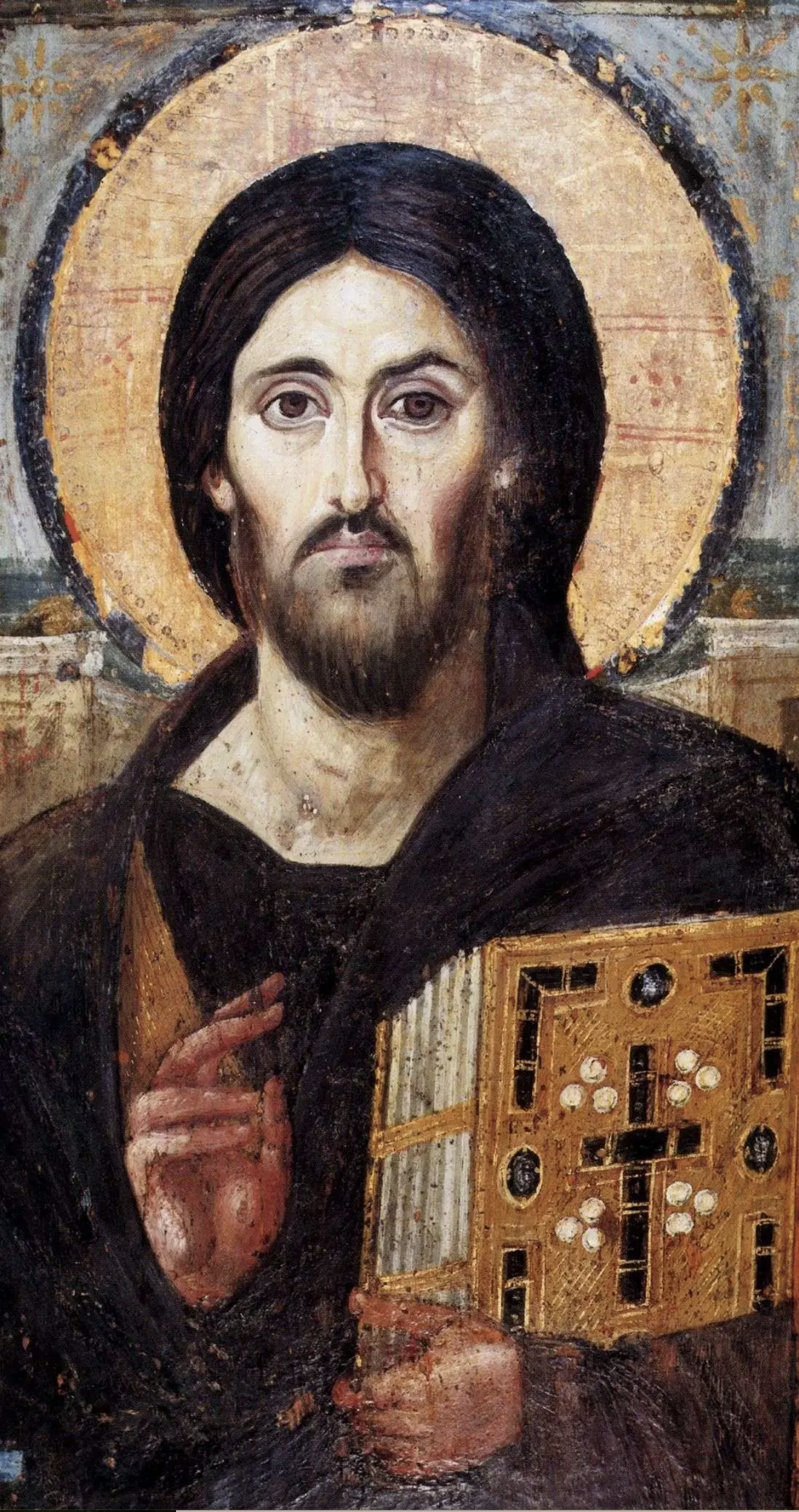
Download Podcast: "With the Eyes of God"
Under God's skies is a world filled with light. But in our much-vaunted freedom we choose for shackles and chains and to dwell in darkness. Once that darkness takes hold, we scarcely know which way to turn. And when the constellation of Libra rises suddenly in eastern sky, and judgment comes upon us in our confusion, the demons will have won: darkness unto darkness, confusion unto confusion. Checkmate.
Yet God has set an escape route within us. This path to safety has been famously trod — by Zacchaeus, by the Contrite Publican, by the Prodigal Son, by St. Mary of Egypt. It opens at the words said in humility and brokenness, "Have mercy on me, O God .... I have erred, and my sin is ever before me."
We must break through from the darkness and truly own what we have done. Longtime shames and secrets must be driven out into the light. Like the woman who burst into the home of Simon the Leper, we must break open the alabater vessel of spikenard and let our tears fall. For being made clean and absolved from all our sins will release such a holy fragrance as will make the angels rejoice (Lu 15:10).
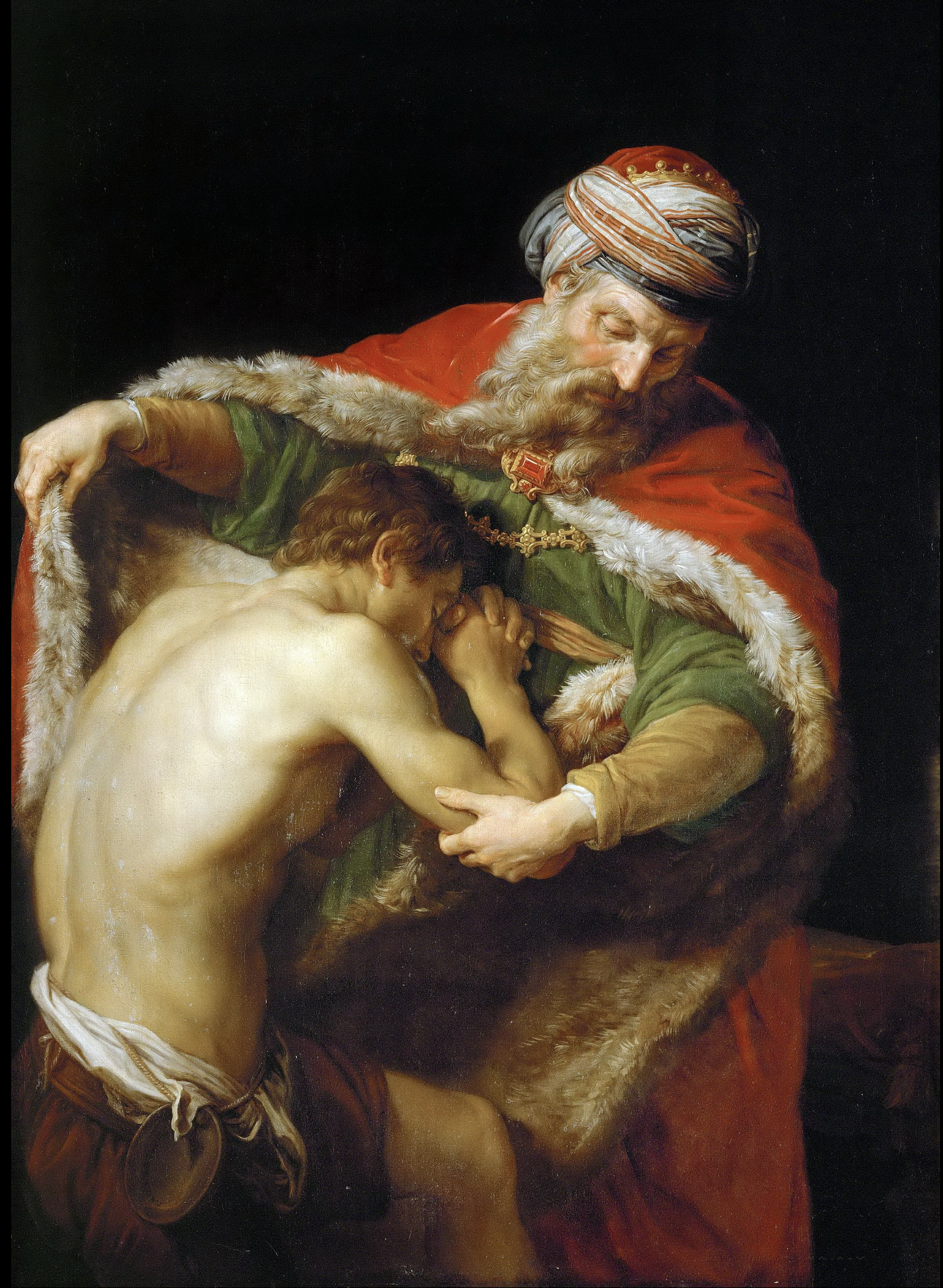
Download Podcast: "Transformed, Part Two"
From Zacchaeus to the Contrite Publican to the Prodigal Son to the Apostles to countless disciples then and now, "the Way" is the story of transformation. This is not a transformation in the sense of a new hair style but a wholesale renovation of heart and soul and mind and all. "We have left all" (Mt 19:27), Peter says to the Master. And this is His way and life and truth. He is the sign of contradiction, Simeon prophesied (Lu 2:34). His is not a baptism of water but of fire, of radical change root and branch. "I came to send fire on the earth .... and division," He says (Lu 12:49-50). To encounter Him is to enter the crucible, where high temperatures are required to divide the pure from the impure. He the Pure One in Whose blinding radiance the truth will out and from Whom no secrets are hid.
Christian conversion can never be half way, and no one can do it for you, not even Him. So burn your whole world down, and count it not loss, but life and eternal life.
Follow Zacchaeus and the Publican and Prodigal Son, for theirs is the path of shattered dreams .... which turned out to be illusion. With them breathe the clear air of the new life. Only by entering the fire can you burn off the tissues of lies that have held you captive for so long. Break the spell. And put on the robe and the ring. The fatted calf will be prepared and the table has been set for the blessed.
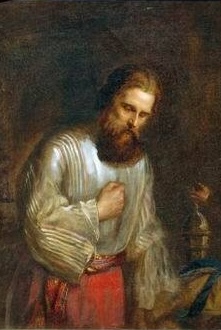
Download Podcast: "Transformed, Part One"
The Pharisee and the Publican — they are a "set piece" in Scripture, what used to be called a "chestnut." The Pharisee is vain and proud. The Publican is contrite and humble. They are universals in that sense, even archetypes in the human psyche.
To understand these figures fully, though, we must break them out of their confining chestnut. This parable appears among three passages that are to be taken together including as part of meditation on delusion including the parable of Persistent Widow and the story of the Wealthy, Young Ruler.
As non-Judean Northerners, Jesus and His Disciples (excepting Judas Iscariot) would have seen the Pharisee and the Publican as two sides of the same coin — each representing a foreign power presently controlling Judah: the Pharisee representing the Temple authority and the Publican representing the Roman authority. (We must remember that before the Maccabean revolt, Judeans, with their Babylonian language and Babylonian religion, were deemed intruders in the wider Levant.)
The most important fact about the Pharisee and Publican, as Jesus' sees it, is that they both have been lost in a dreamworld. They both have been separated from God on account of fantasy. Jesus leaves no doubt of this as He concludes His excursis on the commandments by quoting the Babylonian Talmud from the section on fantasy.
Join us as we explore this fascinating and strange "country," for we shall find that it opens onto 21st-century America — that marvel of fantasies within fantasies, the land where anything is possible. And we will find that the Pharisee and the Publican are not so very far away.
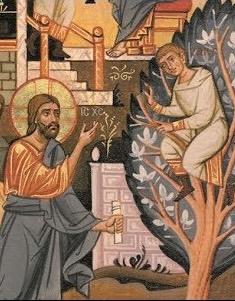
Download Podcast: "Today Salvation Has Come"
We have reflected in the past on St. Luke as an icon writer. We believe the Evangelist to be the Father of Holy Icons. And I have proposed that his narrative art suggests that this is so, for we see the same techniques in both. The so-called Lucan canticles are all instances of the principal figure being depicted in a stylized, even other-worldly, fashion while the surrounding details are diminished and pushed to the edges. Once we are made aware of it, we say that this technique is classically Lucan, not to be found in the other Gospels.
The scene before us today, ironically, has become so familiar as to render it unrecognizable. Zacchaeus is a dear figure from the Gospels, appearing in every Sunday school classroom (especially the Kindergarten area) and apt to put a smile on many a child's face. The figure of Zacchaeus "speaks to" children especially, and they "understand" him. Certainly, Jesus understands Him, and in this understanding, a fellowship forms around Zacchaeus, the Lord Jesus, and children everywhere.
The scene taken in its historical context, however, is outlandish. We behold a distinguished member of the Societas publicanorum, of the Equestrian class, shedding his dignity, dropping all decorum, and climbing a high tree! Even the name Zacchaeus pulls us up short. There is no room in the Greek language for it. It was a Hebrew epithet reserved for little boys meaning "innocent or pure one." No Chief Publican would have been called "Zacchaeus."
Yet, if we view it as an icon, it begins to come into focus. And the stylized features, so out of place in a historical narrative, are precisely the stuff of icon writing.
Let us read the "Zacchaeus lesson" with new eyes and appreciate the skill of St. Luke's hands.
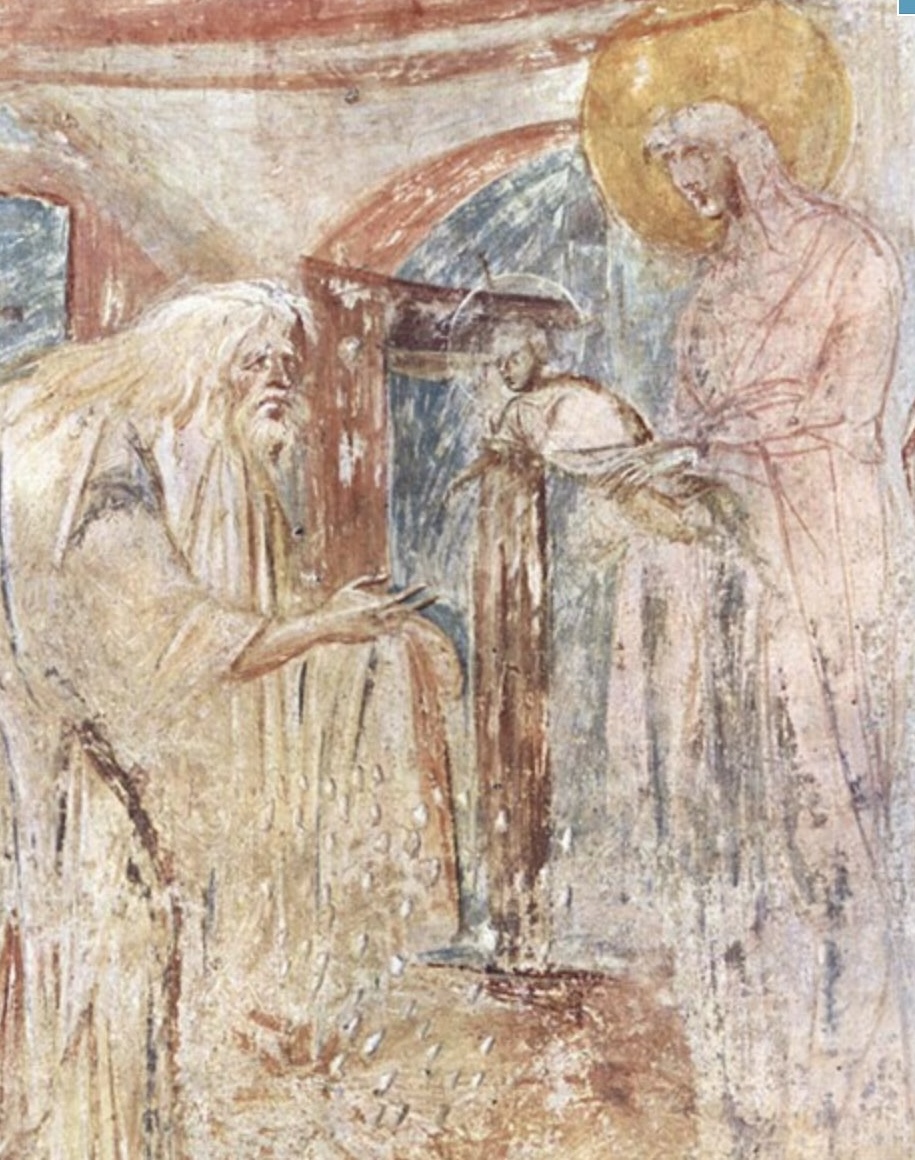
Download Podcast: "Sign of Contradiction"
The character of a profound soul is silence. The speech of the great ones is marked by few words. The revered prophet St. Simeon was trenchant. He comprehended the little life in his arms with a single word:
| αντιλεγόμενον / anti — legomonon / contra — dict |
This Christ Child will be the the Sign of Contradiction: the One Whom the world will contradict. But to contradict God is to stand in the place of Divine Judgment and Final Contradition.
Nothing more nor less might sum up the Advent of Jesus into the world. The place where we meet Him is always already the place of judgment. And our answer to His master question,
| "Who do you say that I AM?" |
will settle the matter of our eternal destinations.
Please join the Hermitage as we venture out to the Temple to meet the Lord. It will be the turning point of our lives and always already the crossroads of human history.
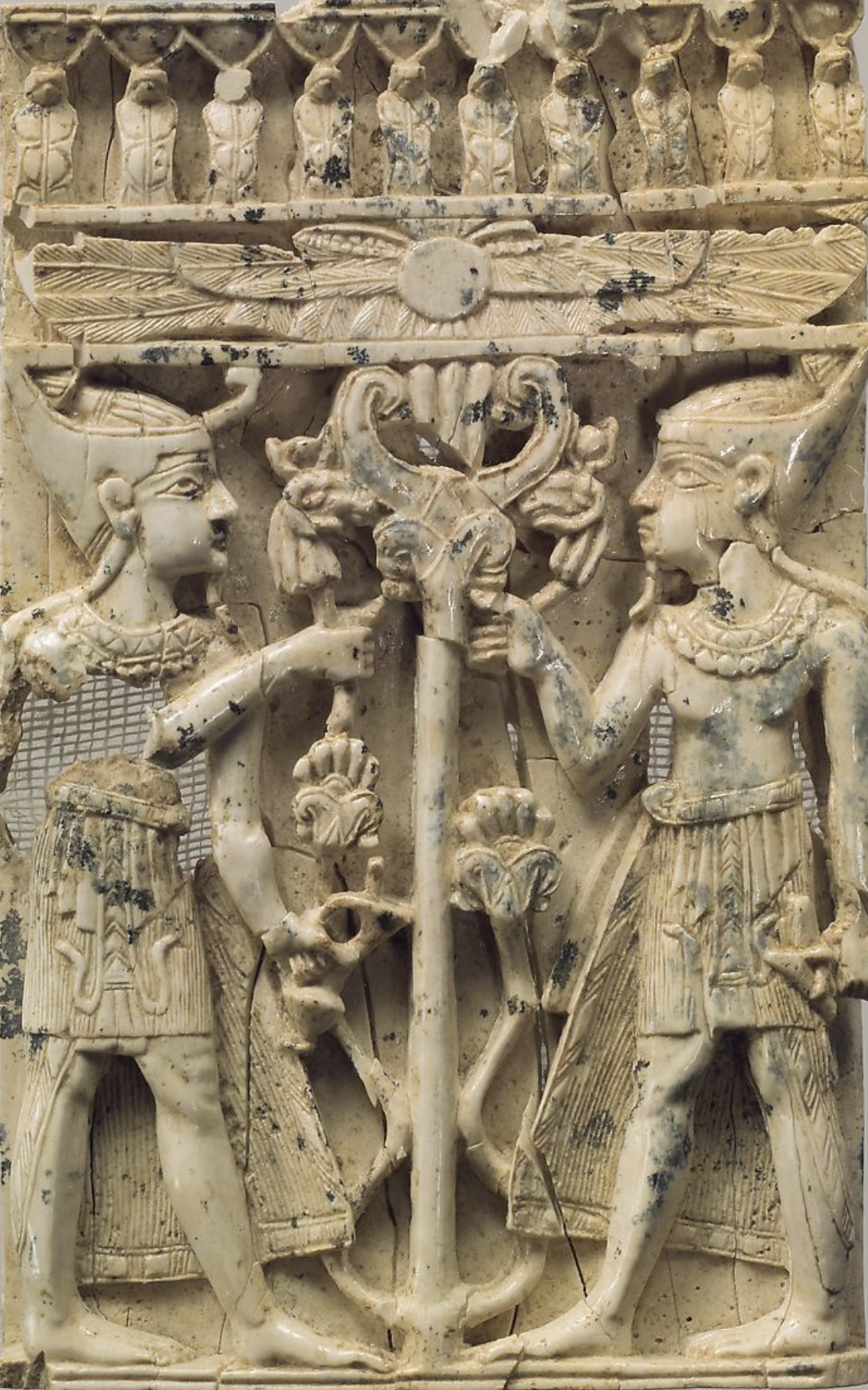
Download Podcast: "Not of this Fold"
Jesus has led His disciples far beyond the comfort zone of devout Hebrew men. For Tyre and Sidon were seaport cities of a maritime empire. Ships would have been departing and arriving from ports in Africa, Iberia, Gaul, Rome, and Greek islands. Here, distilled in a heady brew, was "the World." Following twenty, tiresome verses in St. Matthew's Gospel arguing for the worship of customs, here is refreshing sea air.
These people are unlike Judeans. They are inevitably seekers — seeking in many lands from across the known world. They are open, ready to hear, for their travels have taught them that the unexpected is to be found around the next corner.
Jesus' reputation has preceded Him, and a Canaanite woman approaches. She is humble, open, and ready to be surprised by the yet-to-be-known. In this, we can say that she has "a heart after God's." And she finds God's favor. For in the marketplaces of the strange world, God has acted.
He has come to announce the Kingdom as He must wherever He goes. All will be asked to drop whatever they are doing. All will be enjoined to burn down their whole world. All will be directed away from their personal Babylon into a desert that cleanses. They will be guided always upward .... towards angels and eventually to their own Oaks of Mamre.
It is a primordial religion breathed by God into the DNA of Creation. It is the only path that God has ordained, which has never varied. This road, rising ever upward, suddenly passes at the end into a most sacred space, where you join Angels and Archangels, and all the Company of Heaven who forevermore praise and laud His Most Glorious Name:
|
Holy, holy, holy, Lord God of Sabaoth.
Heaven and earth are full of Thy Glory Hosannah in the Highest. (Isa 6:3) |
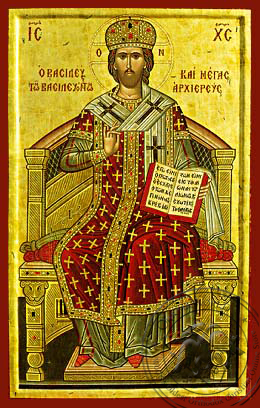
Download Podcast: "King of Kings"
So Jesus stood still and commanded him to be brought to Him. (Lu 18:40)
He is the Creator-God, the Great Emperor, the Law-giver, our Judge and Court of Last Appeal, the Beginning and the End.
Among the earliest icons of Jesus is as the Pantocrator, the Ruler of All. This mid-sixth-century icon from Saint Catherine's Monastery, Sinai, depicts a Regal Figure Who, on His right, bestows mercy, and, on His left, holds the Book of Life, and scrutizes in judgment. Both are present, for He is the King — in Him alone is blessing, and He alones renders judgment which is final.
He is addressed or referred to as Kúrios 653 times in the New Testament, meaning King, Lord — the same word that is used in the LXX to refer to YHWH.
To appear in our midst, to empty Himself of His Empyreal glory, to put on human clothes of flesh and blood, is an act of condescension too great to comprehend with our impoverished organs of perception.
We must not in our zeal or ignorance rush forward to embrace Him as our familiar or in any way approach Him without due reverence. He is not our chum, our fellow, our pal. His is a Dignity far above any we shall ever behold on earth. Encountering Him, our first emotion will undoubtedly be awe.
At the Name of Jesus let every knee bow, and let Heaven and nature be still. His is the breath that created worlds. Yet, He stoops. He takes note. He attends the human creatures He mysteriously loves so well.
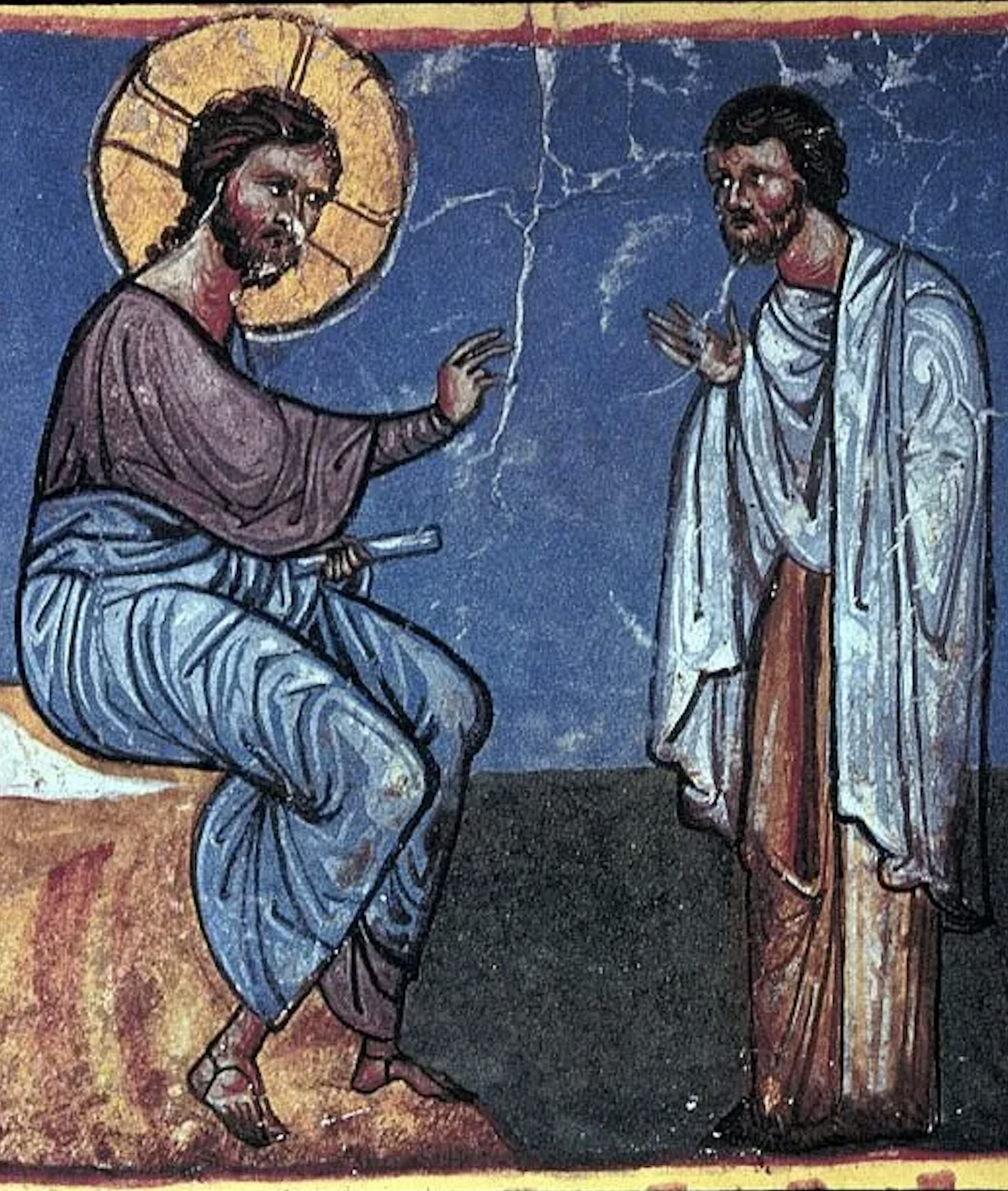
Download Podcast: "Your Have Heard That It Was Said"
How appropriate that the young ruler of our Gospel lesson is a priest, for his basic disposition toward God is one of propitiatory sacrifice: this-for-that salvation. But this is not Christianity. It was not the Hebrew religion of Abraham, and it is not our religion today.
Do we realize the breathtaking gravity of Jesus declaring only two commandments where there had been 613? In effect, He dismisses them has inadequate. In spirit, He takes a page from Trito-Isaiah:
|
For thus says the High and Lofty One
Who inhabits eternity, Whose Name is Holy: "I dwell in the high and holy place, With him who has a contrite and humble spirit, To revive the spirit of the humble, And to revive the heart of the contrite ones." (Isa 57:15) |
To love God is to have a broken heart (Ps 34/33:15) — broken from the disconsolate regret of the contrite publican (Ps 51/52:17) or burst open because the love of God has stretched your heart beyond capacity.
How offensive to Heaven, therefore, that a checklist could possibly stand in for such a love as this. Yet the West has gilded the lily of propitiatory sacrifice with the idea that the death of Jesus will stand in as a this-for-that swap for our salvation. There is nothing we can do in the cause for our salvation, we are told. But Jesus will secure this swap with His death.
We are not saved by Jesus' death. The Fathers (Origen and Athanasius among them) have said that Jesus did not have to go to the cross to effect our salvation. We are saved by His ransom (Mt 20:28, Mk 10:45, 1 Tim 2:6): by His loyal faith, by His love. It is the quality and character of Jesus life that has saved us. Christianity consists in imitating this life. And the formal name for that all-important journey is theosis.
He may very well ask you to burn down your whole world. If He does, then know this: the Heavens have opened to you, angels ascend and descend upon you, and you have been invited to "dwell in the high and holy place."
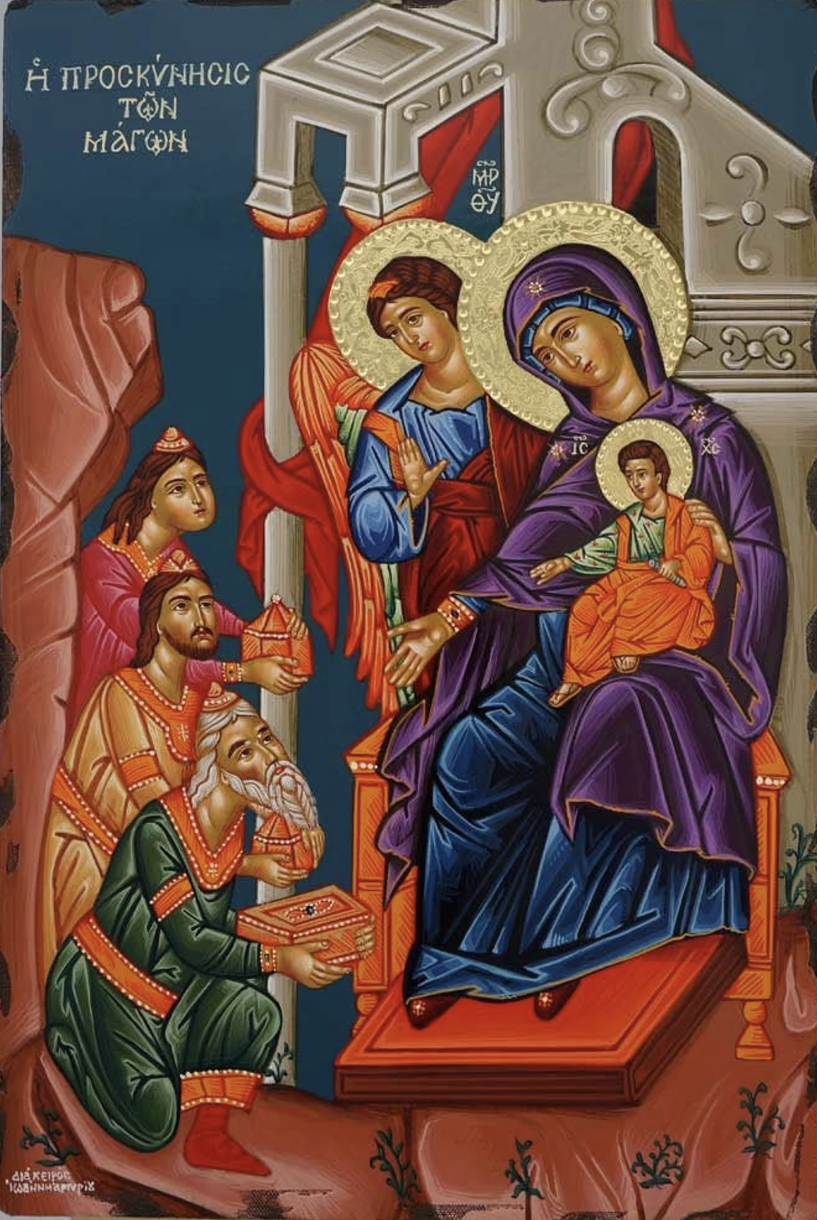
Download Podcast: "The Kingdom of God"
Wicked tenants have siezed the Vineyard — the Vineyard on Mt. Gerizim, the Vineyard on Mt. Zion. They have aspired to murder the Heir and to make it their own.
"Therefore, when the Owner of the Vineyard comes,
what will he do to those vinedressers?"
They said to Him, "He will destroy those wicked men miserably,
and lease His Vineyard to other vinedressers who will
render to him the fruits in their seasons."
Jesus said to them, "Have you never read in the Scriptures:
'The stone which the builders rejected
Has become the chief cornerstone.
This was the Lord's doing,
And it is marvelous in our eyes'?
"Therefore I say to you, the Kingdom of God will be taken from you." (Mt 21:40-43)
Herod strikes out blindly at combatants who are not visible to him. They are barely visible to "the star-led wizards" who discern their direction and guiding. The air is thick with angels — a celestial retinue attending their King.
The Kingdom is at hand. It is the only Kingdom. Against its might, enemies strive in vain. As the Jews unwittingly tell Pilate, it proposes to be something greater than Caesar.
"The people who sat in darkness have seen a great light ...." Let us receive our only King.
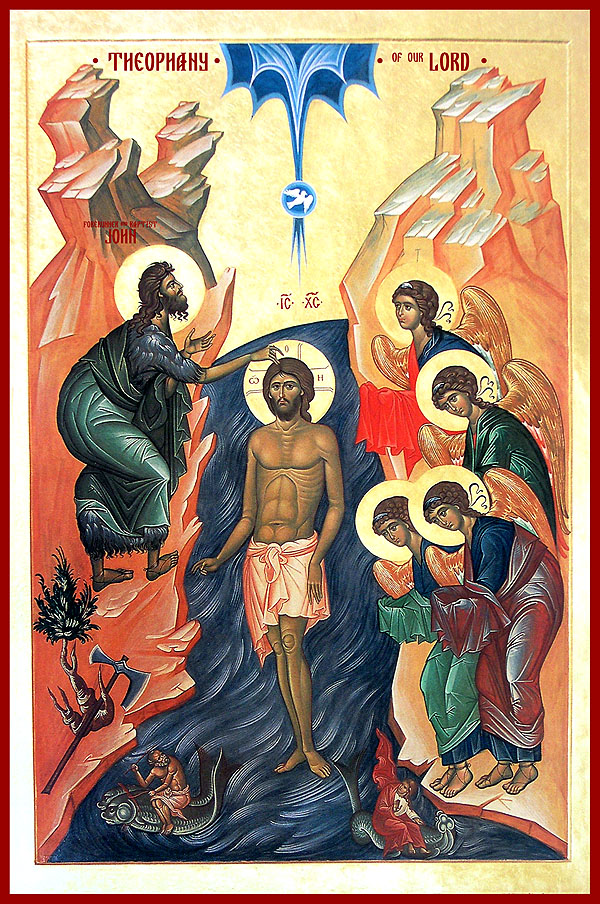
Download Podcast: "Foundations of the World"
Unfolding before us at the scene of the Lord's Baptism is a most ancient story
—
one that pulls back the veil revealing the foundations of the world,
where void and chaos continue in their dark and restless motions.
Into these depths Divine goodness enters.
A mighty bulwark is set forever bounding off a Kingdom of Goodness in a fundamentally dark world.
This is the Mystery of Baptism: we enter these unfathomable waters,
we are touched by death's menacing chaos, and we place ourselves into the hands of God ....
unto the ages of ages.
Here is the decisive act of our lives, incommensurably holy and consequential.
We are forever marked as one of His.
We are clothed in the white garments of our royal nature,
and we are anointed with princely oils.
We claim the Light of the World as our own.
And we set it upon a lamp-stand for all to see.
This is the City set on a Hill.
This is the Kingdom of God,
which is the company of all faithful believers and heirs through hope of His everlasting Kingdom.
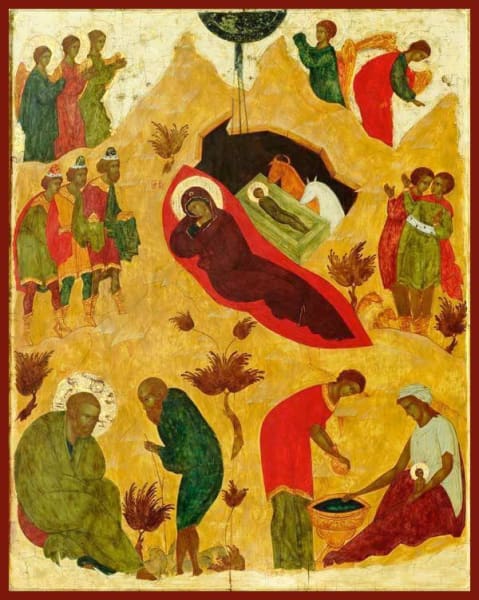
Download Podcast: "Archbishop Kyrill, Nativity Message"
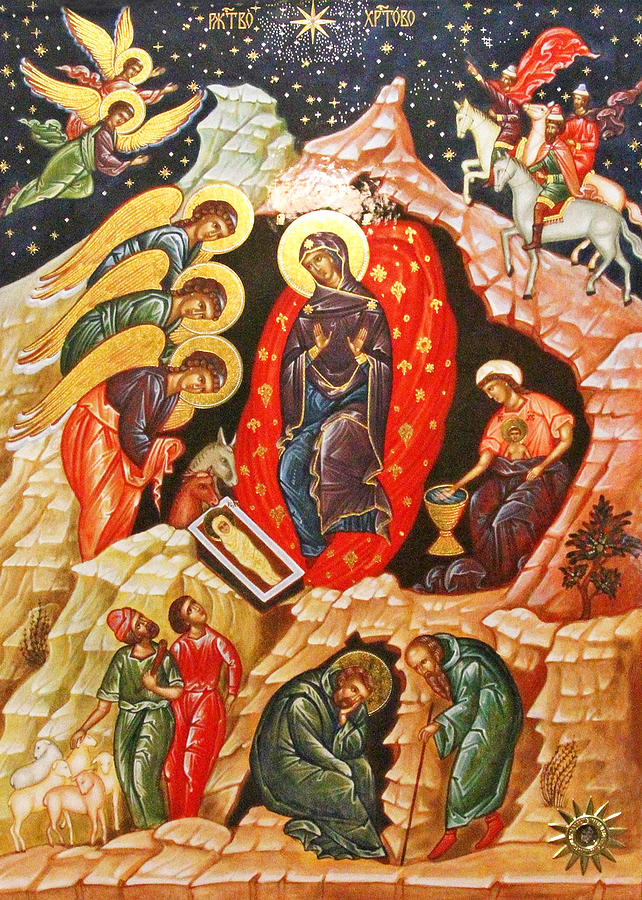
Download Podcast: "Metropolitan Nicholas, Christmas Message"
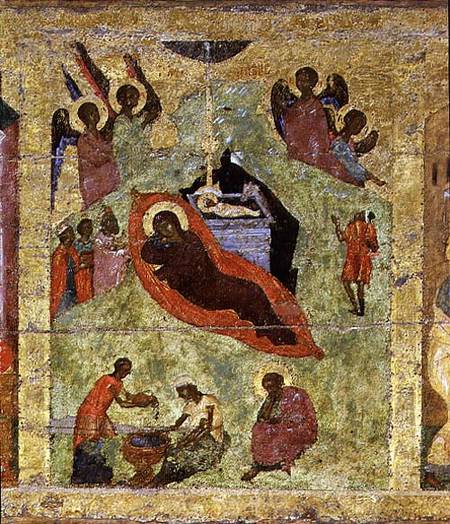
Download Podcast: "Patriarch Kirill, Christmas Message"
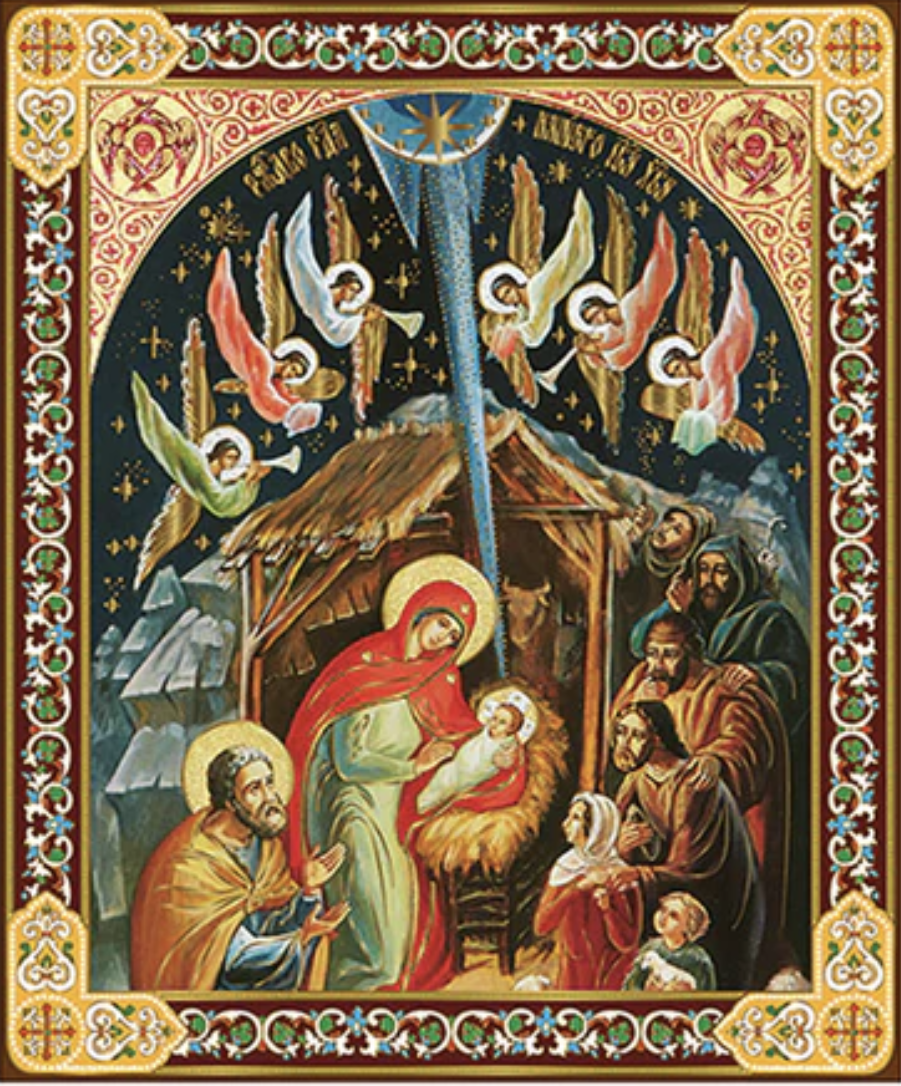
Download Podcast: "The Glory of the Lord Shone All Around Them"
Did we understand then?
Do we understand now?
Let us be speechless, then, as the shepherds were speechless ....
and with them
bear witness to angels singing
gloria in excelsis Deo.
|
November 27 (Holy Calendar) Sadly, I must inform all of you all that Father Columba has suffered a mild stroke. This has prevented him from preparing reflections at the present time. We request your prayers during this crucial time. We are hopeful that during the Nativity Fast he will experience the healing he needs. In Christ through the Most Holy Theotokos, Sister Mary Anne |
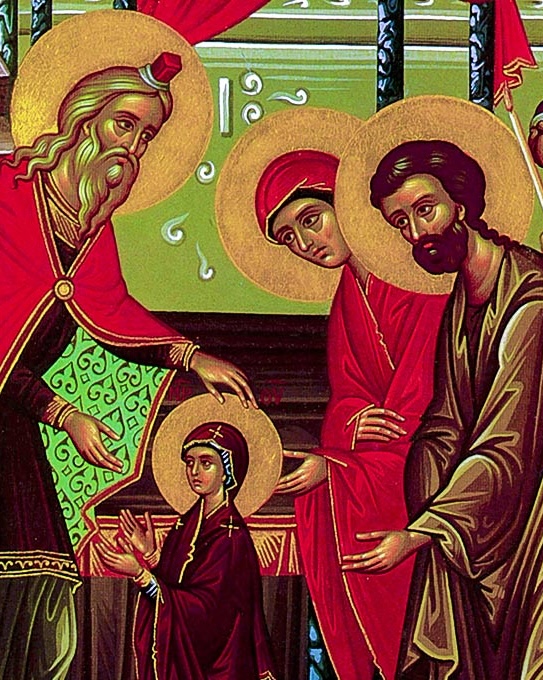
Download Podcast: "The Jews Took Up Stones"
Mary has emptied herself completely. Her mind and heart are open. Her soul receives His healing and illuminating Word. And in this intimacy, in this wholeness, she is not very far from the Kingdom of Heaven.
No so many years earlier, a little girl ascended the steps of a forbidding slaughterhouse. Its altar is routed with deep gutters where the blood of animals flows. On the horns of the altar hang carcasses of dead animals. The entire temple system revolves around these rituals (which Her Son sought to overturn in full-blown rage one afternoon). But today amidst those rituals, and all those blinded by its over-busy-ness, the temple receives the true Holy of Holies, which will have nothing to do with blood sacrifice, but rather the gentle self-offering and obedience to God's love. And from her most pure and chaste person, will proceed the Incarnation of that Love. He will to heal our busy minds, and He will receive our humbled spirits.
"The Jews took up stones" to murder God, we read in St. John's Gospel (Jn 10:31). But this they had already done when they bowed to Babylon-Persia erecting a temple of massive stones attempting to bury the Living God beneath the weight of worldly empire .... and the several, vast empires preceding it. For empire is the exaltation of the world. And blood-letting is its essential display of power.
Yet does God not forget even those lost in the mania of imperial busy-ness. So He sends nearly a toddler whose tender feet will tread its massive floors and steps. Her delicate frame encompasses a power far beyond any potentate: which is purity and obedience and the Word of God.
As for the stones? These always amount to nothing. Soon Her Son, wielding no weapon nor donning glittering armor, will destroy this massive edifice and raise it up in three days.
As He turns His face of love to the world (even to us), His Divine command is simple: empty yourself of unworthiness; fill yourself with the Word of God; and make God's ways your own. For this is the one thing that is needed.
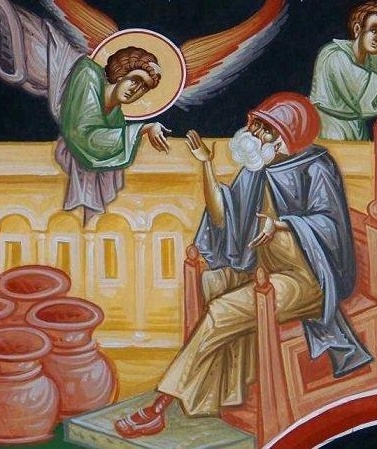
Download Podcast: "Be Merry!"
Now living in (or approaching) our eighties, we remember the grave concerns of our parents and grandparents that Christmas was beginning to disappear. Yes, the Church had always worried about the intrusion of pagan influences, feasts like Sol Invictus, invading Christian belief and practice. But this was different, our parents said. For motion pictures and radio were omnipotent genies weaving powerful spells that entranced the human mind. And now with television appearing in every living room, that spellbinding power had been placed at the very heart of the American family.
Most of us did not pay them any mind. After all, did we not see and hear and smell the real and deep magic of Christmas all around us? But as the third decade of the twenty-first century unfolds, we see that their concerns were well founded. What would they say at a world that frowned or smirked at the sincere greeting, "Merry Christmas!"? And what would they make of a new holiday proclaimed for the country having all the potency of Christmas, called "Black Friday"? We even have Black Friday Football!
After all, this new culture asks, what do our lives have to do with God? Our lives revolve around the latest fashions and technologies. Even our genders have become irrelevant as new combinations are invented. Eat, drink, and be merry! For the world is our oyster! And anything we want cannot be so far away!
But suddenly the twinkle of party lights vanish. The music stops. A bright light shines upon everyone and everything. All around are zombified people and a world strewn with refuse. What could this be? What does it mean? And then a voice is heard: "Thou fool! Tonight thy soul will be required of thee."
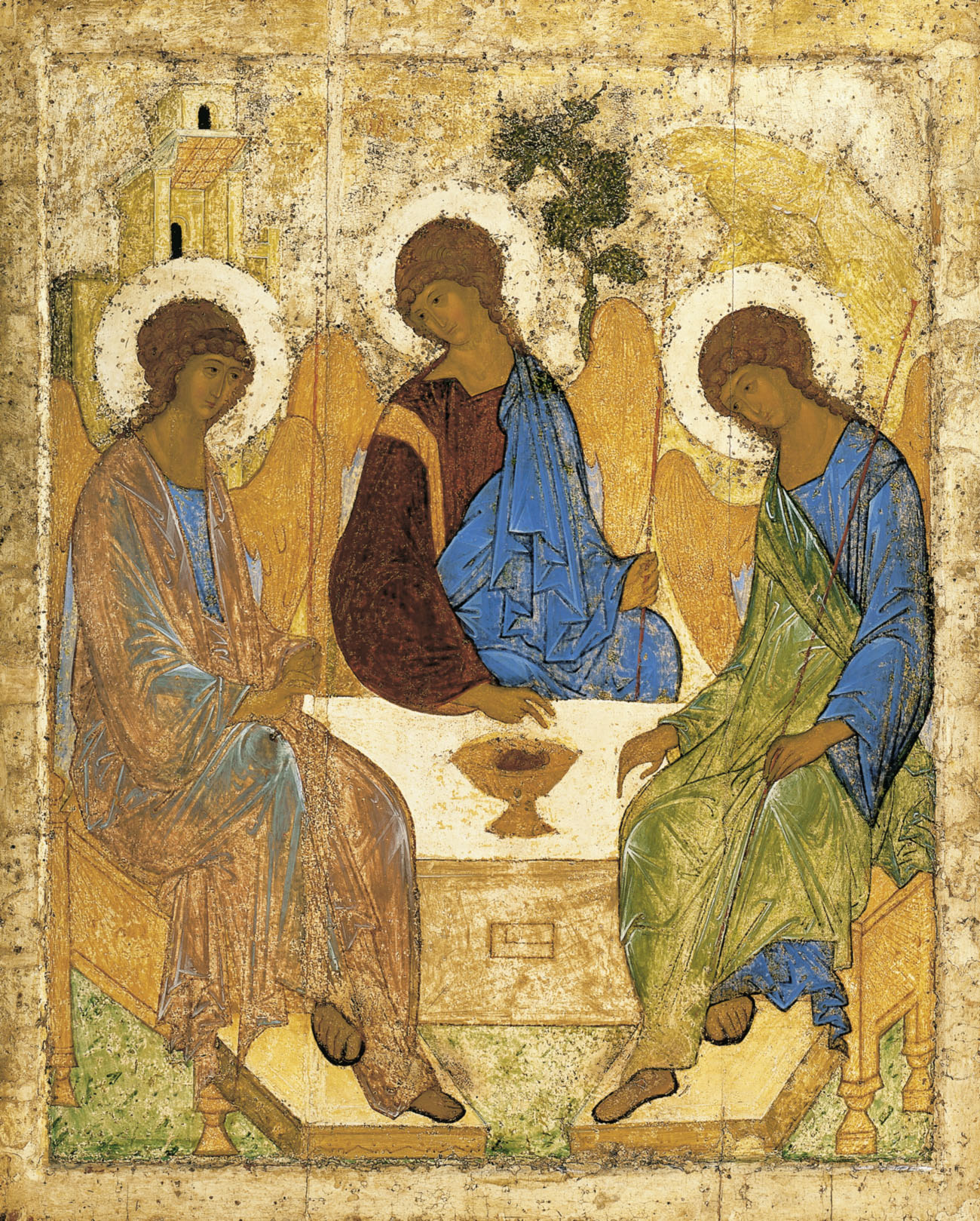
Download Podcast: "Look Homeward, Angel"
The Nativity Fast begins! Somewhere on a hilltop far away and through the centuries, the Incarnate God calls us away from polluted Jerusalem. He commands us to purify ourselves. He bids us look up where Heaven has opened. And He promises that angels will ascend and descend even upon ourselves, the sons and daughters of man.
So let us commence the Nativity Fast with shouts of Glory to God! Let us leach out every toxin in our fasting. Let us give thanks to Him in our every prayer for the possibility of becoming holy. And most certainly let us discard all Made-in-Babylon entertainments. Let us bring our televisions to the town dump. Let us turn off our glowing screens. Let us throw out our glossy magazines extolling consumerism and parading before us the false promises of Babylon and its propoganda. Instead, let us step out into true freedom, walking beneath the skies of high Heaven in the company of God and the Heavenly Host. Let us become "fellow citizens with the saints and members of the household of God" (Eph 2:19). And let us live every moment on earth in expectation of angels or even the Triune God amongst sacred oaks.
And after our journey through these forty days of fasting and prayer, we shall kneel before His crib as Persian religious men did 2,000 years ago. He will give us new life, and He will forgive us our shames. Above all, let us go! Like Abraham let us go out into God's great unknown never counting the cost. For this is the blessing He has in store for each one of us: to be received in His trust and love, Who longs to call us His Friends.
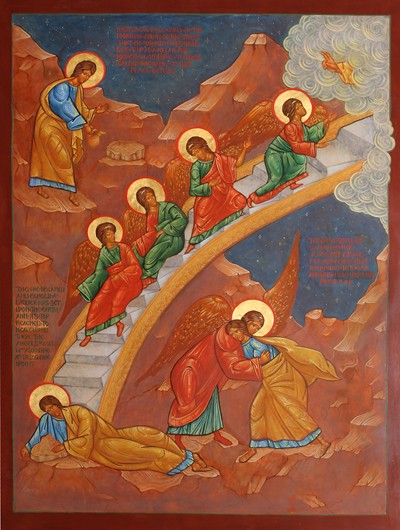
Download Podcast: "Look Homeward, Angel"
We might easily imagine what faithful Hebrews thought when they looked upon the Zion Temple. For where the pure religion of Kings David and Solomon had stood, now stands a monstrosity, built under the imperial command of Cyrus the Great. He conceived it as an adminstration building for the Persian Province of Yehud enshrining Persian (i.e., Mesopotamian) values and customs.
In the Gospels, we detect mockery heaped upon the "Jews" (a name arising from their hybrid Mesopotamian religion, Judah-ism). We read of the Lord's disregard of their Persian customs. He and His followers eat the wrong things at the wrong time (Mt 12:1). They do not practice the prescribed ablutions (Mt 15:2). Jesus prepares a parable (of the Good Samaritan) ridiculing the whole premise of ritual cleanness especially when contrasted to the authentically holy (as yesterday's reflection considered). This mockery reaches a high point in 6 A.D. when a group of non-Judeans scatter human bones throughout the Zion Temple rendering the whole place ritually unclean according to Temple belief.
Now imagine the "greatest generation" surveying the America of today. These people, who knew the Great Depression and fought World War II, cherished a certain vision — of wholesome families, of widespread church attendance (73% in 1935), of public prayer in the schools, and who willingly died by the hundreds of thousands during four short years to protect and uphold that vision. What would they say if they looked upon the America of today? For surely the America they knew would be the holy standard just as the First Temple was the holy standard to the Hebrews who rejected Judah-ism.
In this season of purification readying ourselves for Christ's Nativity, let us petition Him. As He had entered human history to gather the Lost Sheep of Israel, we pray that He will also gather those who cherish a certain vision — a vision of wholesome families, of prayer, and of godliness — which He had placed, and still places, in the human heart. Let us purify ourselves really and truly that when the Shepherd calls to us, we will hear His voice (Jn 10:27).
![]()
Download Podcast: "The Way Home"
Do you know the "Footprints" poem? It tells of two sets of footprints along a beach depicting a walk with the Lord. When the two sets become one set, the fearful persona of the poem asks the Lord, "Why did You abandon me during times of trial?" The Lord replies, "These were the times that I carried you."
An elderly priest, referring to the poem, told my class in seminary, "This is not Christianity. Christianity is when the solitary set of footprints are yours because you are carrying the Lord." This is the spiritual meaning of Parable of the Good Samaritan. It is an allegory of spiritual journey, of religious traditions, of suffering, and of sacrifice. It asks the towering questions, "Who is the ransom offered for many?" and "Who will offer himself as ransom for the One who is the ransom?"
Such questions might be strange to us, but they were familiar during the first century to all classes of people. Such stories, in fact, were the stuff of moral contemplation and essays written by members of the highest ranks of society.
This parable belongs to a cultural genre which has been mostly lost to us. So we must make it our own, for it is truly a key that unlocks the Scriptures and, therefore, our own spiritual lives.
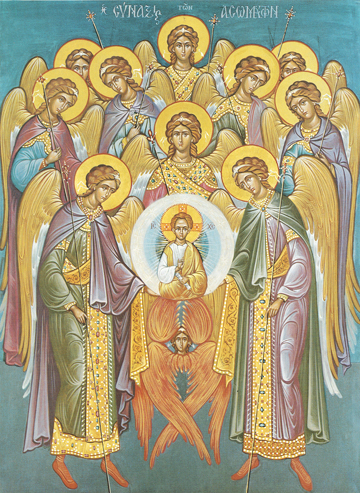
Download Podcast: "Kingdom of Angels"
Our democracy is determined to make everything and everybody equal. We bridle at the thought of hierarchy. We prefer the idea of everyone setting aside their titles or high offices and "having a beer" with us. Even Jesus, in Evangelical circles, is reduced to "a pal," "a bud," "the guy who has my back."
But Heaven famously is a Kingdom. Here, title or office is indistinguishable from identity. And our part in it is ascent. Our spiritual state is both our position in this hierarchy and our identity, inseparable and the same. "We are what we are before God, nothing more," said the Franciscan saint Anthony of Padua. And the goal of life is for "what we are" to become united to God's "Who I Am."
The Gospels, taken together, could be read as a guide book for ascent. And hierarchy is basic as we read in this morning's Epistle lesson,
|
For He has not put the world to come, of which we speak,
in subjection to angels. But one testified in a certain place, saying: "What is man that You are mindful of him, Or the son of man that You take care of him? You have made him a little lower than the angels; You have crowned him with glory and honor, And set him over the works of Your hands. You have put all things in subjection under his feet." (Heb 2:5-8) |
The Transfiguration of the Lord is depicted as a transformation from a human state to an angelic white radiance before communing with Elijah and Moses in a sphere associated with Godhood, as we hear God the Father declare, "This Is My Son." And let us not forget that the Holy Trinity appeared to Father Abraham as angels.
Will we enter this Kingdom? The Kingdom is already here. Our entrance finally and forever depends upon our ascent. And our identity? "We are as we are" inseparable from our heavenliness.
Are you heavenly? Am I? This is the question we must ask every morning and every night praying forgiveness for all the ways in which we have failed. The task before us is so simple. "I have set two ways before you, saith the Lord, holy life and the culture of death. Choose life." And if you should stumble, be assured that you are not alone. For He has given His angels charge over us. Embrace this Bright Friend, for your Guardian Angel is privy to your every thought and deed.
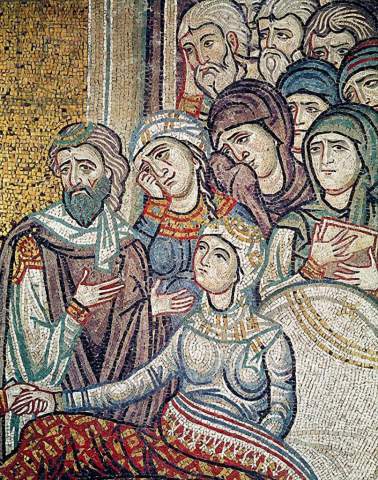
Download Podcast: "Radiance of the Ridiculed"
The Disciples ask sarcastically, "You see Yourself in the midst of a throng and ask, 'Who touched me?!'" A little later, we hear that Jesus is ridiculed by those around Him. The Greek word means, "laughed at, mocked." What is going on here? How could these same men who only a few verses earlier asked, "Who then is this Who commands the winds and the sea?!" now laugh Him to scorn?
Our Gospel lesson is one for our times. The Lord we seek to follow and emulate is surrounded by mocking voices and finally persecution. Nonetheless, He commands us to take up our own crosses and follow Him. He instructs us to give a wide berth to an unbelieving world and then shows us how this is done.
For God most certainly is God. He does not wait upon the unsteady faith of fair-weather believers. He does not depend upon the shifting hearts and minds of the many. And He bids us to do the same. For here we shall find no abiding city. Here we will not be received as favorite sons and daughters. Yet, through each trial and tribulation, we may be sure of this: "Thy rod and thy staff they comfort me" (Ps 23).
Let us link arms then, those of us who hear His voice (Jn 10:16). And let us be on our way, two-by-two, and walk the path He has given us to walk in. If it be daunting, if it be dark, then know this: its darkness has nothing to do with ourselves or with Him. We cannot change a world for which He does not even pray (Jn 17:9), nor should we. But we do know this. He has called us. He has instructed us. And He has entrusted us with the only life that is worthy of the name.
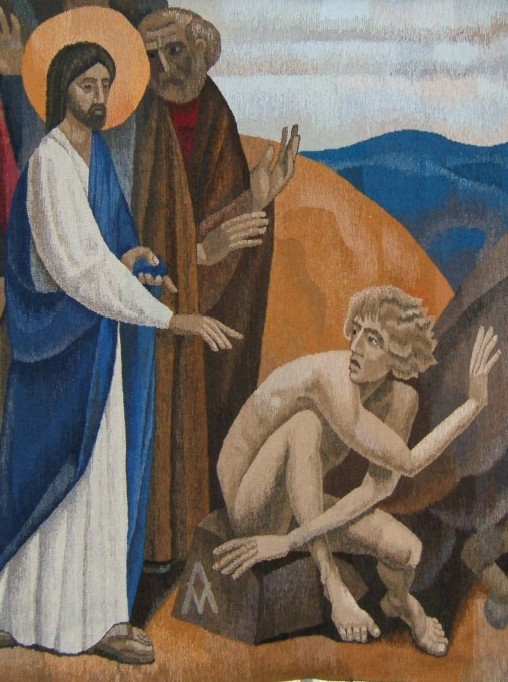
Download Podcast: "Come Quickly, Lord Jesus!"
What must one do to lay open his mind and soul to an infestation of 6,000 demons? Small wonder that his life ever after is bound in chains, wedded to the culture of death amongst tombs, and unable to order his mind and enslaved will. His personal character has devolved into swine-nature, for the demons are equally at home in either.
The historical background for the lost Tribe of Gad is a civil war in progress between the Judah-dominated world and its antagonists scattered throughout the Hebrew Levant. It is this faithful Hebrew lifeworld in which Jesus appears. For amongst the tents of the marginalized, God has been born. And the villages and tribal areas He visits, the people He meets and heals, the fault lines on which He boldly stands reveal not only the many dimensions of lost life two thousand years ago, but also depict unerringly our own lifeworld, or I should say "death-world," today.
For the act of rejecting God is not bound by time or culture. It is an archetype, among "the types and symbols of Eternity" (Wordsworth). And its sequelae are unvarying, as immutable as God Himself.
Come, join us, as we contemplate this world that is beyond us and yet right before us. For such reflection is more than edifying. It is our holy duty.
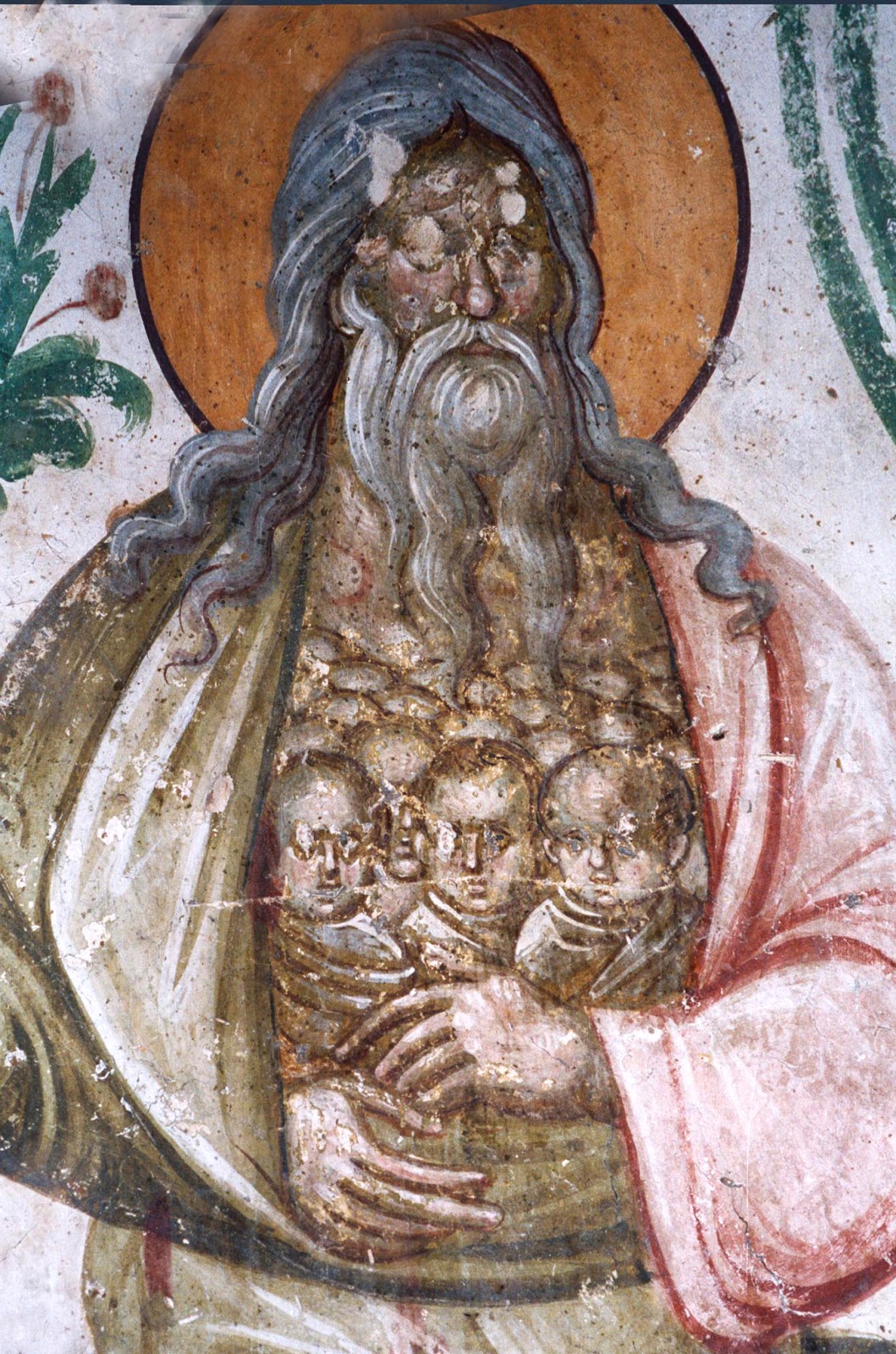
Download Podcast: "One with the Father"
That Abraham is the father of our faith (Gal 3:6-9) is a commonplace of Christian belief. But I wonder how often we reflect on the profound depth of this cherished idea. In our Gospel lesson for this Sunday, we contemplate Father Abraham to be an iconized image of Father God. The journey of Abraham and Sarah from wilderness to wilderness, erecting altars, planting sacred groves, honoring always relationship with God the Father .... all of this is an image of our Lord's journey on earth. For where One Person of the Holy Trinity appears, the Fullness of the Holy Trinity is Present .... present amongst the Oaks of Mamre in the company of Abraham and Sarah.
We contemplate the phrase "Bosom of Abraham" considering its rarity and the extreme rarity of the word "bosom / kolpós," reserved only for the most sacred moments in the Gospel narrative.
Reading this lesson, we are standing upon holy ground. Let us remove our sandals and sit at the knee of our Lord. For He will reveal such things that are needful (Lu 10:42) and the only things that matter: devotion, humble life, lowliness, and finally One-ness with God as He and the Father are One.
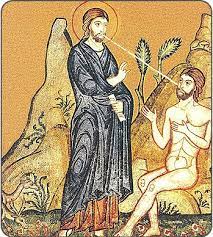
Download Podcast: "Words of Power"
Last week, we contemplated Jesus looking out from Mt. Moreh across the Valley of Jezreel, meaning "the word (or seeds) of God." From this vantage point He could see both the village of Nazareth and Mounts Hermon and Tabor, signifying the breadth and heights and depths of His ministry, earthly and Divine. In our Gospel lesson today, He speaks of Divine seeds again, but this time not in passing, but with focus and deep intention.
As we surmise even from common place-names, the word of God thought of as seeds was a topos of the first-century Levant. It is a central idea in the turn-of-the-century Gospel According to St. John and in the earliest theology of the Church.
Let us consider seed on this day set aside for Divine reflection. And we shall soon realize it is everywhere. As farmers we have learned that the air is thick with many thousands of tiny seeds, most not visible to us. But they are there, packed with DNA, taking root, having their invisible (and then not invisible) effect, taking over whole fields if we are not vigilant.
The same is so with us. We are constantly absorbing, even breathing in, seeds either as words or tiny particles. They find their places within us. They have their effect. Many will take root and grow. It is our mindfulness of God's Presence which will matter in the end. It is our becoming present to the good seed and our cultivation of it which ends up being an essential vocation — to which everyone is called.
Attend! Let us listen in silence to the sower of seed, Who is Himself the Word of God. He has appointed us. And today He sows His seed within us. Each word descends like a bright angel. Attend! For we must not miss even one particle.
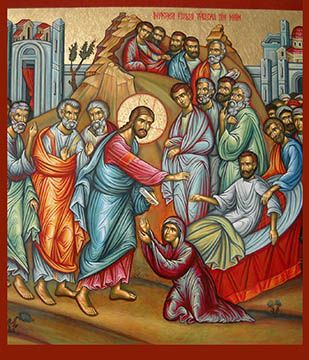
Download Podcast: "Whither Thou Goest"
This morning we meet with the Lord Jesus visiting a village on the slopes of Mt. Moreh, called the "Hill of the Teacher," Who He is. Standing on the main street of the village, He sees all around Him personal landmarks: Nazareth just across the valley with its scenes of His earthly life; Mounts Tabor and Hermon signifying His Divine Reality; Mount Carmel in the distance symbolizing the futility of pagan worship, which lately has crept into the temple on Mt. Zion; even earliest scenes from His family album. All these hover before Him. But of greatest importance are the back pages of this family album. These ancient pictures speak powerfully as He stands on this vantage point.
Join us as we travel to the Church of St. Andrew the First-called (Carson City, Nevada) — a rare trip away from the Hermitage. With these faithful, we trek across biblical centuries following the Master. We seek to live out in some small way His greatest teaching. For from the beginning, unto the end, and to the present day, His constant theme is the Kingdom of Heaven, which shall have no end nor knows any boundary.
Our theme today is family. How good it is, then, to take our place in the household of God.
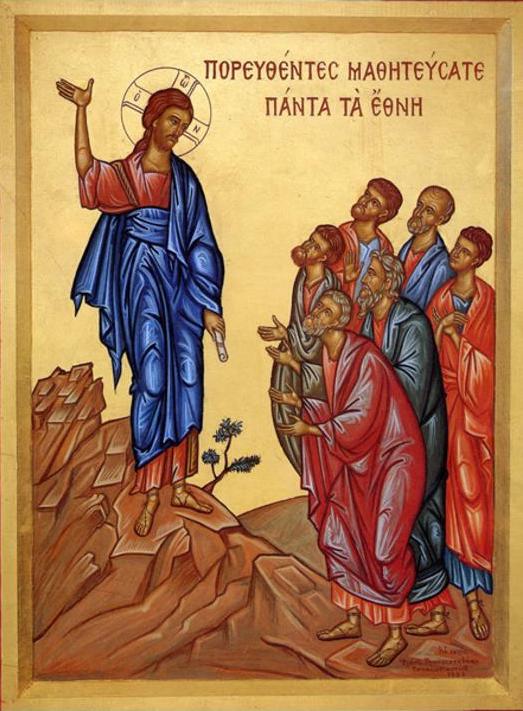
Download Podcast: "Outposts of Heaven"
Two worlds are taught to our children. The first we see and hear everywhere: it is the material history of fossil remains telling a story of ascent from the brutish, short life of our ancestors to the dog-eat-dog world we know today. The phrase "Survival of the fittest" is a suitable caption.
The other world tells the story of a golden age, which has been lost but might be regained. Here there is abundance and sharing and a bond of decent affection. Our children gather that it is a fairy tale. For no one seems to take it seriously.
The Lord God addresses both worlds in His Sermon on the Mount. The practical world of strife and treachery is depicted with the same even hand that describes a world of golden harmony. There is no room here for fairy tales, but, rather, He articulates most urgent and consequential principles.
God has a plan for a world that has wiped out whole cities of women, children, and the elderly with deadly intent in the work of an afternoon. He has a plan for a planet that has destroyed itself with the power of technologies that never contemplated the general good nor ever respected the sacred groves of His shimmering Creation. His plan begins in the heart of each person, and it makes provision for circles of light drawn from heart to heart to heart unto the Kingdom of Heaven. But will we listen to His plan? Will we teach it to our children? And will we finally reverence and respect the incommensurable beauty and goodness of this one-of-a-kind planet, which He has made in a declaration of magnificent love?
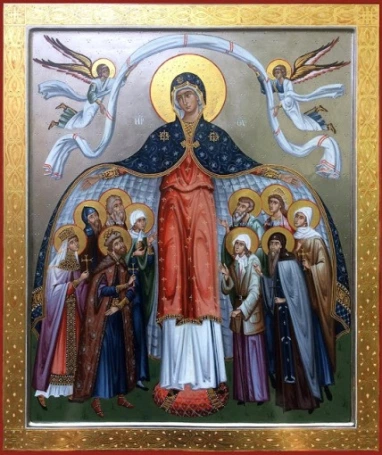
Download Podcast: "Under Her Mantle"
Tomorrow we will reflect on two very different worlds living side-by-side, even within each other: the gritty world we see all around us and the Kingdom of Heaven, which mysteriously is woven through it in golden strands. However much we may long for it, our disjointed world will never square with perfect Heaven. Indeed, the place where these forces meet is a dangerous place, as dangerous as the Mountain of God (Exod 19:16:20). And the one attempting to live Heavenly life in a gritty world of predators will be preyed upon.
Yet Christians are called to do exactly this, to live Kingdom-of-Heaven life on earth. This is our prayer every morning and every evening: "On earth as it is in Heaven." St. John enjoins us to live in communities apart from the world that we might be protected from danger.
Nonetheless, we must go into the wild world, the wolfish world (Jesus says), knowing that we are guarded by a mighty Protectress, the Queen of Heaven, whose protecting veil keeps us in safety. In Russian this veil is known as Pokrova, the mantle of protection.
If you should doubt this, then consider a church in Lahaina on Maui surrounded by flames. The buildings all round this wooden structure are burning to the ground, yet danger does not come near to her. The name of this church in Polynesian is Maria Lanakila, translated literally, "Mary, the Majestic One of Heaven," or more commonly, "Our Lady of Victory," the Western Catholic phrase for Pokrova.
Come, let us pay our Holy Mother due reverence on this day when we venerate the One Who watches over us.
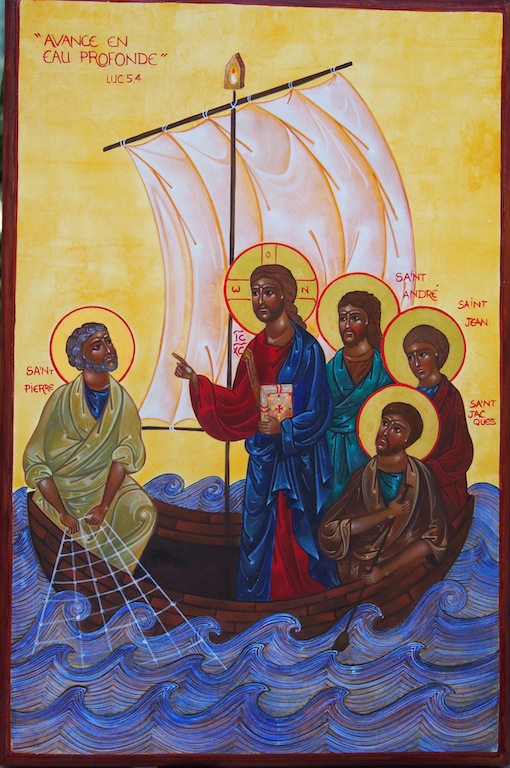
Download Podcast: "At Thy Word"
The scene has inspired our greatest artists: Witz, Raphael, Bassano, Rubens, to name a few. But the first painter of the Miraculous Draft of Fishes was the first icon writer, St. Luke. Yes, his canvas was rendered in words .... but was no less painterly for that. The scene's brilliance and power so overwhelms that it is easy to lose sight of its place in Luke's Gospel narrative, which is his version of the call of the Disciples, or at least four of them, the brothers Simon and Andrew and the sons of Zebedee, John and James.
They toil all night (read, "all their lives") only to bring up empty nets (read, "spiritual emptiness"). Yet richly present in their ordinary world is the extraordinary power of God. Jesus says to Simon bar Jonah, "Not that side of the boat, but this side": Divine power, always there yet never seen because it is unlooked for, unprayed for, and unsought.
Truly, this scene is about vocation. Vocation is the spot on the earth where things come rapidly into bloom, things come easily into your hand, life becomes filled with grace, and where vacancy is transformed into abundance. But we must stand upon this spot. We must venture "out into the deep," as Jesus advises Simon. Otherwise, the Divine power God has waiting for us will never be seen and never be felt.
Join us today as we venture out into the deep. We pray that this will mark a beginning, for Divine appointments await us all. And the adventure of our lives always lies just ahead.
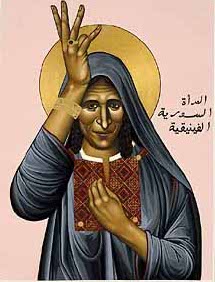
Download Podcast: "Cosmic Drama"
Jesus and His followers have trekked the long distance to Phoenicia. The Disciples are on edge being so far from their well-regulated culture governed by God's statutes. The more raucous Gentile world around them in the seaports of Tyre and Sidon would have been unnerving with the public drunkenness of sailors, prostitution, and the practice of magic found in all such cities. A Canaanite woman approaches. Her fragrance, her ornaments and amulets, and her immodest dress scandalize them. "Make her go away!" they implore their Master.
What's going on in this brief Gospel narrative? Is it simply a display of Jesus' kindness? Some have said, including the Primate of the Episcopal Church, that it depicts Jesus overcoming His learned racism (yet another instance of poor Bible translation and secularist theology).
Much more, however, is present here. But we will not understand it until we grasp Jesus' primary instrument as a teacher, which is drama. Jesus is not a philosphy professor articulating principles. He is not a theoretician trafficking in abstractions. He is God. And God's primary method in communicating with us is to set great dramas before us.
A great drama has been prepared for us, prepared from the foundations of time. One of its ringing lines is to take up our Crosses, to journey to a place of exectution. "How terribly odd and off-putting!" many have said as St. Paul recounts.
But that is only because we have misunderstood. We have misunderstood Him. And we have got His drama, prepared for our salvation, all wrong.
Please join us as we begin a trek to Phoenicia and from there sail on, sail on into holy waters of a distant land .... called the Kingdom of God. Only from here will all things be understood. And finally we will have fulfilled our most grave obligations to the God Who made us.
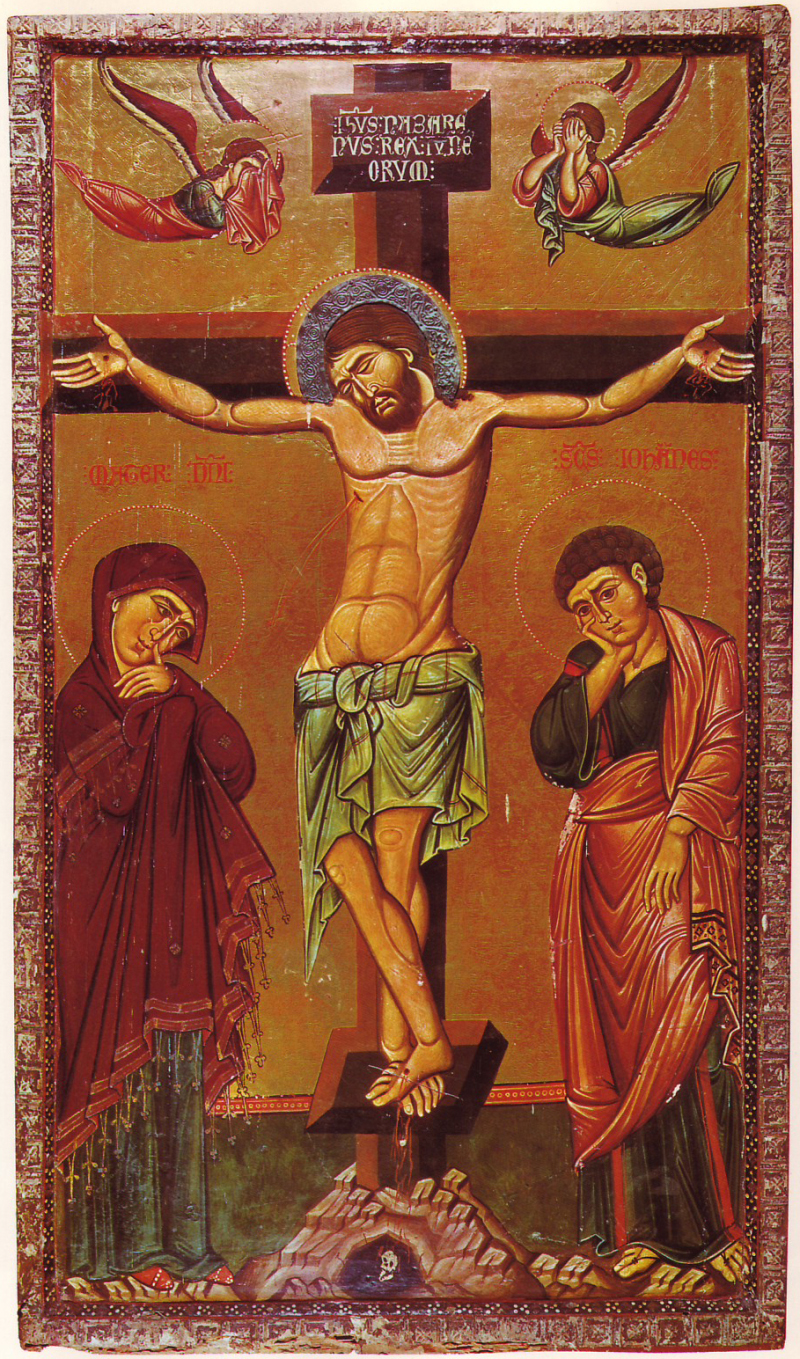
Download Podcast: "I Call You My Friends"
For me St. Gregory the Great's most memorable exhortation is
| "Be friends of God!" |
In four syllables is summed up the entire program of Christian life. In His long leave-taking, Jesus singles out friend to signify the fullness of union with God (Jn 15:15). Something very great, then, is expressed when Jesus declares,
|
No longer do I call you servants , for a servant does not know
what his master is doing; but I have called you friends, for all things that I heard from My Father I have made known to you. |
The alternative to "friend" is "slave" (doûlous, as we read the underlying Greek). Yet the mature Christian is to become him- or herself a fellow with the Lord (Kúrios) and with God the Father. A friend signifies the mature son coming into the fullness of Divine adoption, joining in colloquy with God, and more appropriately called kúrios, i.e., lord or king, himself. Here is the end point of the way of the Cross. "We who have given up everything, what shall we receive?!" Peter demands to know in a moment of choler. And Jesus replies, "You shall be kings."
The road of His long leave-taking leads to a Cross which reads, "Jesus of Nazareth, King ...." Here is the life-giving Cross: a coronation, a holy sign of friendship with God, and a consecration in the highest of heights, as even the pagans would have agreed.
This path and this Cross are unfamiliar, even alien, to many who style themselves Christian. Yet, it would have been instantly recognizable to those who followed Jesus of Nazareth, ideals even cherished by the pagans, who presided over a crucifixion they never wanted.
Let us join together in a journey back to the first century, for these ideals are in the very air they breathed, even from Britain to Damascus.
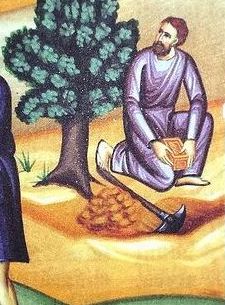
Download Podcast: "Buried Talents"
|
For the Kingdom of Heaven is like a Man traveling to a far country,
Who called His own servants and delivered His goods to them. |
Like the stumbling servant from this morning's parable, most of us neglect our talents, even bury them under life-subtracting diversions. Indeed, the phrases "buried talents" and "hidden talents" are commonly heard. Do we mean to say that there's a connection between human talents and bricks of gold? Yes. This connection is explicit. And today's parable is about the creation of mankind, the gift of life, the God-given talents with which we are endowed, and what we do with the gift of our lives. Indeed, the Greek text explicity links the "goods" from our quotation to the Last Judgment.
A "far country" likened to "the Kingdom of Heaven," an anonymous "Man," His "call" to His servants, and fabulous gifts explicitly linked to a lifetime of striving. All of this awaits us in a mysterious parable that uncannily speaks directly and vividly into our own lives. And there is much more.
Truly, this week's Gospel reading awaits us like a Divine appointment. For that is what it is.
![]()
Download Podcast: "Born of a Virgin"
We are exiles, "poor banished children of Eve" in the words of this ancient hymn. We are separated from our true home, which is figured by Eden. Perhaps, the beauty of our earth is not so remote from it. But a winter of discontent has descended. It is a noxious atmosphere arising from our ancestors — Eve, Adam, Cain, the Ante-diluvians, Noah, Canaan, Ham and countless others. The garden is blasted on account of their brokenness, and the ground is hard as stone.
Nonetheless, from the conception of a never-fading Virgin, from a birth immaculate as our own, a certain fragrance is detected. It is a familiar scent. We know this scent from the deepest recesses of our racial memory. Her birth has roused its long slumbering within us. It is the fragrance of the morning of the earth, of the utter east, of the pristine shore which will be warmed by the first life-giving beams of the new sun.
The interior woodlands, long covered in opaque frost, now turn to crystalline glass encasing branches and twigs as warm currents flood in. A sound of droplets is heard. Green shoots begin to appear. And the smell of new life is borne on a mist that swirls through every orchard, holt, and meadow.
The world, long dead, begins to stir with expectancy. For in her birth a sign is given. In her birth, Creation is renewed. She is the pristine grass upon which Heaven's dew will appear. Whence arises this dew? It did not fall as rain from the sky. It did not spill from a passing bucket. Its purity is incomparable and complete unto itself .... and will nourish a hard and thirsting world: living water from within springing up into everlasting life.
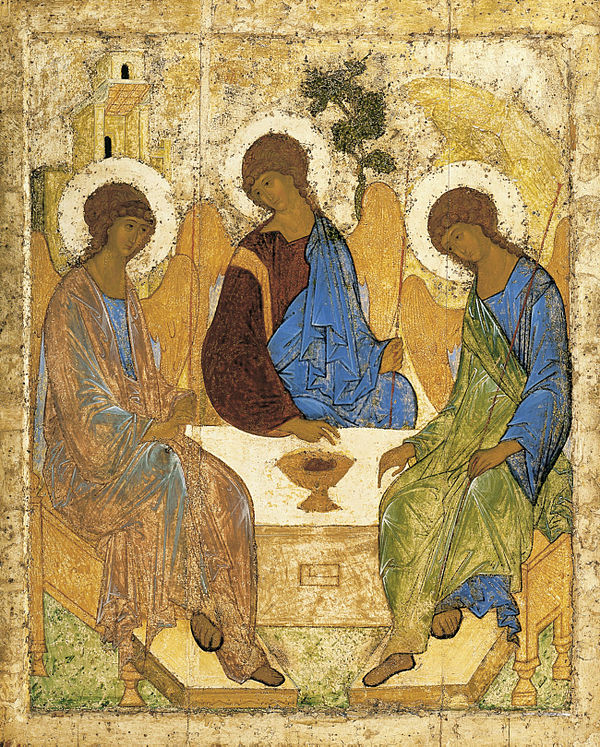
Download Podcast: "In Different Worlds"
Here on the first Sunday of the New Year, we are brought back to basics. We must ask, who are we, where are we going, and where do we come from? If a non-Christian inquirer (and there are many millions in the U.S. today) were to ask you, "What is Christianity?" what would you say?
This morning's Gospel lesson forces us to confront the basics of Christianity: the why and when of the Incarnation, the contexts for Jesus' teachings, the basis for our rituals of worship, and (though we shy away from the subject) how we are different from the many groups who describe themselves as "Christian." As we say, we are forced to confront these fundamental questions though we cannot hope to cover them in depth .... though hyperlinks appear throughout the text of the reflection.
The Gospel passage before us today is generally misunderstood. Only by digging into the underlying texts — the text used by the Pharisees and the different text used by Jesus — is this particular Scripture unlocked. But when it is unlocked, all things become obvious, even crystal clear. And this crystal clarity goes to the heart of who we are, where we are going, and how we are to get there. Let us start the new year heading down this promising path, for soon we shall see the Patriarchs and angels and all the company of Heaven.